Report & Financial Statements
Representing Promoting Developing



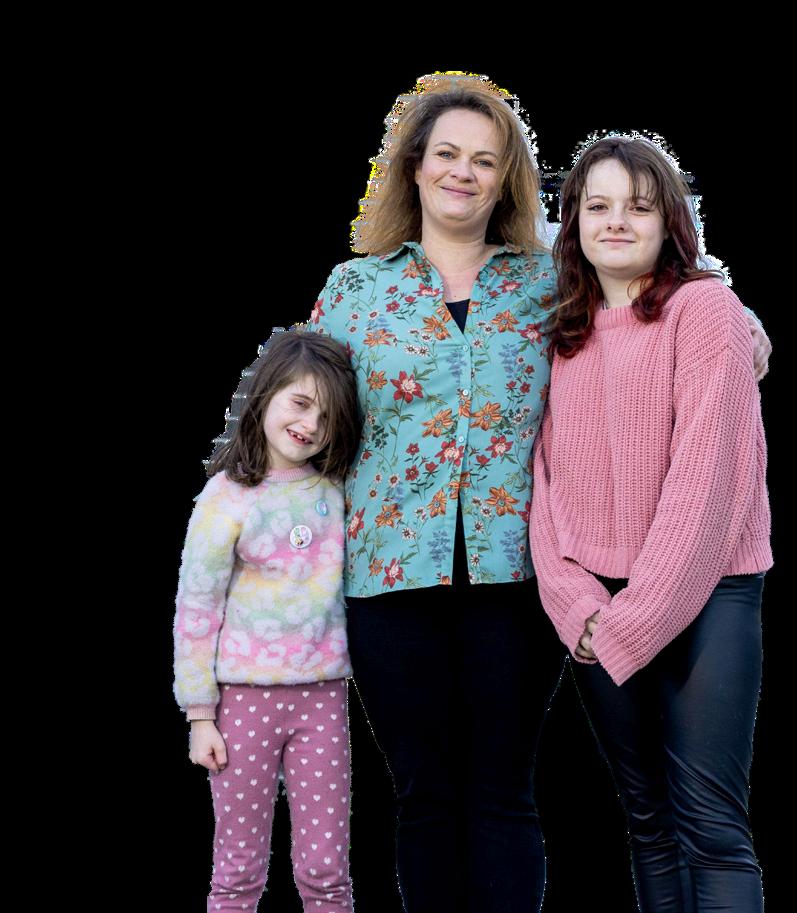

Report & Financial Statements
Representing Promoting Developing




Co-operative Housing Ireland (CHI) is an Approved Housing Body providing almost 5187 high quality homes to low-income households. As a representative body, CHI champions co-operative principles in delivering homes and supporting communities. Co-operative Housing Ireland has been a leader in providing truly affordable homes across Ireland since 1973. CHI was formed under the Industrial and Provident Societies Acts (Reg. No. 3174R) and is a registered charity (RCN 20012182) As an Approved Housing Body (AHB) it is regulated by the Approved Housing Bodies Regulatory Authority (AHBRA)
Co-operative Housing Ireland works closely with various stakeholders in the housing sector, including Local Authorities, Government, and developers, to provide high quality social-rented homes across the country In addition to the 5187 homes provided, CHI has supported owneroccupier housing co-operatives to deliver 3,000 affordable homes
Our vision is of an Ireland where everyone has the option to participate fully in their own and the wider community’s social, economic and environmental development through co-operation
Our mission is to lead the development of social, economic and environmental sustainability in Ireland through co-operative effort and the provision of co-operative housing in particular


Definition
A co-operative is an autonomous association of persons united voluntarily to meet their common economic, social, and cultural needs and aspirations through a jointly owned and democratically-controlled enterprise
Values
Co-operatives are based on the values of self-help, self-responsibility, democracy, equality, equity and solidarity In the tradition of their founders, Co-operative members believe in the ethical values of honesty, openness, social responsibility and caring for others
1 Voluntary and Open Membership
Co-operatives are voluntary organisations open to all persons able to use their services and willing to accept the responsibilities of membership, without gender, social, racial, political or religious discrimination
2 Democratic Member Control
Co-operatives are democratic organisations controlled by their members, who actively participate in setting their policies and making decisions Men and women serving as elected representatives are accountable to the membership In primary co-operatives, members have equal voting rights (one member, one vote) and co-operatives at other levels are also organised in a democratic manner
3 Member Economic Participation
Members allocate surpluses for any or all of the following purposes:
• Developing their co-operative,
• Benefiting members in proportion to their transactions with the co-operative
5 Education, Training and Information
Co-operatives provide education and training for their members elected representatives managers and employees so they can contribute effectively to the development of their co-operatives They inform the general public – particularly young people and opinion leaders – about the nature and benefits of co-operation possibly by setting up reserves, part of which at least would be indivisible;
• And supporting other activities approved by the membership
4 Autonomy and Independence
Co-operatives are autonomous, selfhelp organisations controlled by their members If they enter into agreements with other organisations, including governments, or raise capital from external sources, they do so on terms that ensure democratic control by their members and maintain their cooperative autonomy
6 Co-operation among Co-operatives
Co-operatives serve their members most effectively and strengthen the co-operative movement by working together through local national regional and international structures
7. Concern for Community Co-operatives work for the sustainable development of their communities through policies approved by their members
Representing, Promoting, Developing Since 1973
1980s – Working with organisations within housing provision
Co-operative Housing Ireland (CHI), formerly NABCo, was formed in 1973 to support the growing housing co-operative movement that emerged in the late 1960s and 1970s.
A typical co-operative housing scheme during this period focused on home ownership, and involved between 8-20 homes, although in a few cases, between 130-150 homes were built by local co-ops over a number of years

From 1979 and throughout the 1980s, CHI worked with other organisations involved in housing provision or those that were widening the scope of housing services
In the 1980s, CHI’s focus shifted from private home-ownership to social-rented co-operatives.
This shift was largely as a result of a review of housing policy (Report No. 87) which recommended the recognition of the role of housing co-operatives in the provision of social-rented homes for low-income households The review acknowledged that co-operatives have a distinct form of membership and organisational structure emphasising their potential for providing and managing housing with both ownership and rental forms of tenure
In 1984, the Department of the Environment introduced the Capital Assistance Scheme (CAS) This allowed for grant transfers for financing mortgage loans to Approved Housing Bodies (AHBs) toward the cost of providing rental accommodation
CAS led to CHI supporting Ireland’s first co-operative rental scheme, the 13-home ‘Greenlawns’ project in Coolock, with rents linked to household income rather than market rates
The launch of the CAS scheme coincided with an increased focus by CHI on the provision of co-operative rental homes to new members allocated directly from local authority waiting lists.
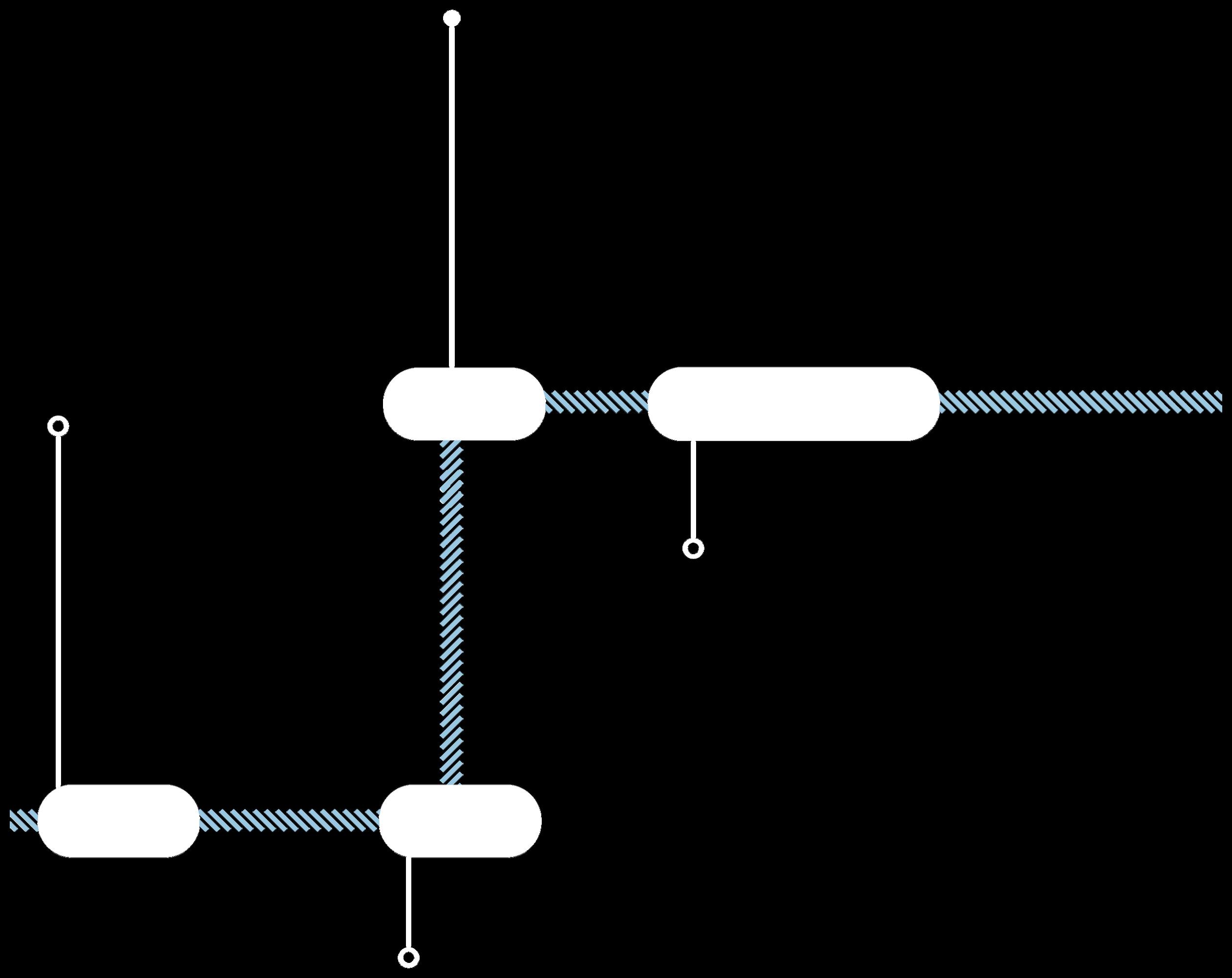
1979 – Irish Co-ops - the ‘Third Arm’ of Housing
By the late 1970s, Irish housing co-operatives were catering to about 5% of the Irish housing market and were hailed as the ‘Third Arm’ of Irish housing, alongside local authorities and private developers. CHI established a full-time staffed office in 1979 to provide information and guidance on a wider scale.
In that same year the new Housing (Miscellaneous Provisions) Act allowed the Department of the Environment to pay a grant-in-aid to CHI as the representative body for housing co-operatives
The Department of Local Government encouraged local authorities to assist co-operative housing by allocating building sites, liaising with co-operatives, and assisting promptly with applications for mortgages.

A range of sites were provided by local authorities in Dublin for this purpose, leading to 276 houses and apartments at seven locations throughout the 1990s
During the 1980s and 1990s, over 20 co-operative housing projects were completed by CHI In 1991, a new Capital Loan and Subsidy Scheme allowed advance loans to Approved Housing Bodies of up to 100%. This enabled the expansion of CHI in Swords, Parlickstown, Ballyogan, Clondalkin, Lucan, Balbriggan and Killinarden until the end of the 1990s.
In 2000, through Part V of the Planning and Development Act, CHI began working with private sector developers and completed an apartment block at Rockfield, Dundrum, and Cardy Rock, Balbriggan
CHI continued to grow its foothold within Dublin throughout the 2000s and 2010s, the largest project of which was Avondale, a development of 200 dwellings completed in 2012
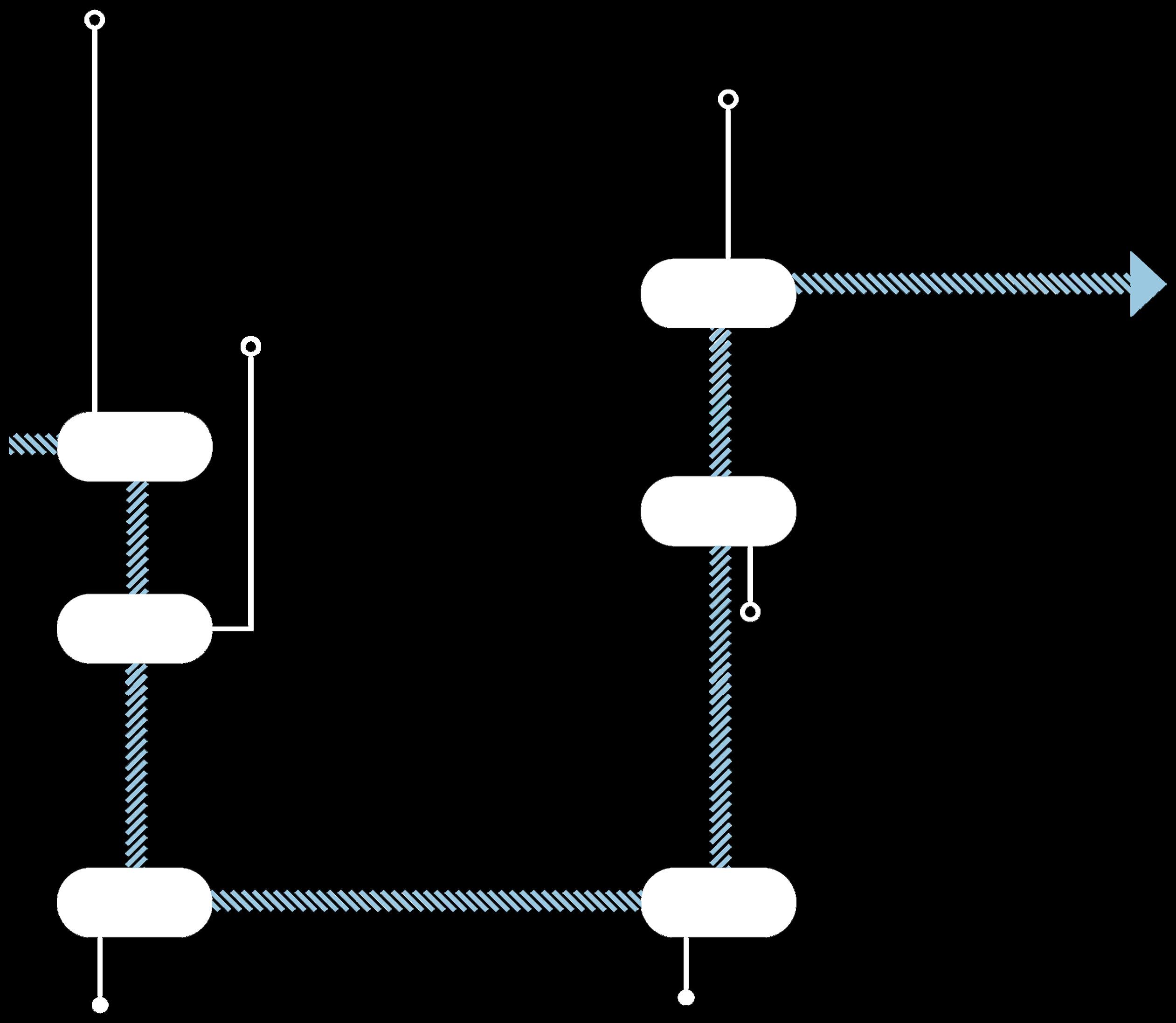

Newtown Court, developed in partnership with Dublin City Council, was the largest development in Ireland in 2004 with 193 apartments and duplex apartments The homes comprise a mix of social rented and shared-equity ownership purchase dwellings.
CHI expanded its reach by delivering homes in Galway and Kildare initially, and then in Munster with housing being developed in Kerry and Waterford To further this expansion, a new office was established, the staff of which helped to establish a foothold in the southern region
In 2023, CHI marked fifty years in operation and delivered an all-time high housing delivery of 849 homes serving more than 14,000 member tenants across the country.
2 0 2 3
‘Housing for All - a New Housing Plan for Ireland’ is the government’s housing delivery strategy to 2030 which was launched in September 2021. This multiannual, multi-billion-euro plan will improve Ireland’s housing system and deliver more homes of all types for people with different housing needs ‘Housing for All’ points to a growing role for AHBs in housing delivery
2011 saw the withdrawal of the Capital Loan and Subsidy Scheme (CLSS), primarily as a response to the 2008 economic crisis The majority of social-rented housing would no longer be funded through capital grants, AHBs and others would be expected to manage loans from both the Department of the Environment (now Housing) and from other sources (e.g. the Housing Finance Agency and banks).
CHI responded to this new reality by developing stronger relationships with the Department of Housing and key stakeholders in order to maintain and improve on its housing output
In 2020, Co-operative Housing Ireland delivered the largest social-rented housing development in Ireland that year with 144 homes in Rathnew, Co Wicklow The organisation moved its HQ from Baggot Street to Warrington Place In that same year, CHI delivered a record number of 454 homes across the island of Ireland. This growth marks a continuous trend, as from 2016, CHI’s delivery of homes has increased dramatically, from 194 to 592 in 2021

New homes delivered in 2023


849 homes delivered 381 houses delivered 468 apartments delivered 52 14,257 €319,837,413 Deep Energy Retrofits delivered people living in CHI homes + 1,795 since 2021 (+14%) 91% occupancy rate loan funding drawn down in 2023 for developments


Co-operative Housing Ireland Annual Report & Financial Statements 2023

Co-operative Housing Ireland enjoyed a year of many successes and many milestones in 2023 Not only did we celebrate fifty years in operation, but we also saw a record delivery of 849 homes added to our CHI portfolio and we reached an all-time high of more than 14,000 member tenants across the country now supported by CHI This is a tremendous achievement against the backdrop of continuing inflation, high interest rates, war and other economic and social challenges impacting Ireland and the housing sector.
CHI’s last half century is a tale of transformation as we ’ ve grown from supporting individual self-build home-ownership projects to an organisation that delivers large-scale developments, providing hundreds of truly affordable homes each year to lower income families As a result of this effort, thousands of people receive the keys of their forever home each year, giving them a safe, secure place to live from where they can work towards achieving their goals Affordability and access to a home has been the driving force for the housing cooperative movement By the late 1970s five percent of all homes built in Ireland were by co-operative efforts A desire to expand co-operative housing – coinciding with funding opportunities – led CHI, then the National Association of Build Co-operatives (NABCo) – to provide housing to families on local authority housing waiting lists
Today CHI is a unique Approved Housing Body (AHB) as we champion and promote the co-operative values of self-help self-responsibility democracy, equality, equity and solidarity as it has done since its inception in the delivery of social-rental housing This co-operative ethos permeates the communities the organisation supports both new and old People living in homes provided by CHI are members of their local housing co-operative These local co-operatives, typically made up of households within a region have the power to raise collective housing concerns, undertake and promote community activities, address local housing and other needs, and are responsible for nominating the voluntary members of CHI’s Board of Management

In more recent years, CHI has grown its capacity rapidly to support its burgeoning output and adapted to new regulations for AHBs as well as an ever-challenging building climate Our staff have exhibited great collaboration flexibility and planning skills as they ushered in the achievements over the last year Staffing will continue to be an area of focus for CHI as we seek to manage our growth to align with the increasing support required for our portfolio and also to align with the growth outlined in Housing for All Imperative to our continued success is an ongoing focus on growing at the right speed and scale to deliver and maintain over 5 000+ homes and support further delivery in the future
Another focus in 2023 was both reinforcing our existing partnerships as well as growing new partnerships and working closely with local and national government, state bodies, finance, industry, and community partners to seek to deliver on the targets set out each year While Leinster will always have a high social housing need we have strategically expanded our geographical footprint in order to provide a greater number of homes across the country Our increased delivery reflects our dedication to constantly exploring ways in which we can provide more social-rented homes throughout Ireland
Sustainability is also at the forefront of our ambitions We were delighted to win the ‘Net Zero’ award at the Chartered Institute of

Housing All Ireland Housing Awards 2023 for our ‘Improving Warmth and Wellbeing’ retrofit programme The programme involved retrofitting 216 of CHI s lowest energy performing homes receive deepenergy upgrades Retrofit works were completed with CHI Members in situ and in phases to ensure minimum disruption Retrofitting homes and buildings is key to decreasing use of fossil fuels and reaching netzero carbon emission targets
CHI is also working to support member tenants in other endeavours outside of housing provision to strengthen the fabric of the communities they live in Our longer-term projects are focused on areas with lasting social impact, for example, initiatives to support people to advance further in their education The excellence of our community engagement efforts was recognised in 2023 at the Irish Council for Social Housing Allianz Community Housing Awards where CHI won the Building Communities awards for its community development at the Halliday Mills apartment scheme in Dundalk Halliday Mills was met with significant obstacles over recent years but the team’s ongoing focus on the community resulted in a very positive level of member engagement garnering the top award for the sector Other 2023 programmes included a celebration of the first ‘Neighbours Day’ at Amharc Muileann and International Women s Day events around the country as well as ongoing initiatives such as gardening groups book clubs and community clean-ups
Looking ahead to the next 50 years, addressing the housing need is an area that will require continuous adaptation to an ever-changing environment It is sad and very unfortunate that the housing needs of so many go unmet Increasingly the co-operative model will be key to helping address the growing demand for housing CHI is putting more emphasis on building communities and on community development which are core tenets to the co-operative movement In seeding these core values, there are opportunities within CHI’s structure to support younger adult residents to work towards a future housing solution with a co-operative model
Finally I would like to thank our CEO Kieron Brennan and the commitment of the full CHI team for their hard work, dedication, energy and passion this past year They are an invaluable asset to our organisation and key to CHI’s success I also wish to recognise the voluntary commitment of my colleagues on the Board and to thank them for their support We look forward to the next chapter of Co-operative Housing Ireland and building on the last fifty years with continued success

Pearse O’Shiel
Chairperson, Co-operative Housing Ireland
The committee of management, (“the board of management” or “the board”), present their report and the audited financial statements for Co-operative Housing Ireland Society Limited (“Co-operative Housing Ireland”) for the year ended 31 December 2023.

Co-operative Housing Ireland
The Society was formed in 1973 under the Industrial and Provident Societies Acts (Reg No 3174R) and is the national organisation representing, promoting, and developing the co-operative housing movement in Ireland The Society is jointly owned by its affiliated cooperative housing member societies It is a not-for-profit organisation whose objectives are charitable in nature and has charitable status (CHY 6522) The Society’s Registered Charity Number is 20012182 The Society is an Approved Housing Body (AHB) as regulated by the Approved Housing Bodies Regulatory Authority (AHBRA)
The Society, in addition to its national representative role, is actively involved in the organisation, planning and financing of new co-operative housing developments, the promotion of good governance in the management of co-operative housing societies and the delivery of quality housing and associated services for members and their communities
Total housing stock at the end of 2023 amounted to 5,187 units (2022 4,338 units) The growth in units resulted in increased Payment and Availability Agreement income amounting to €39,304,011 (2022: €27,914,238) being the principal source of operational income for CHI activities and Rental Income and other charges to tenants amounted to €15,735,049 (2022 €13,377,695) These income streams are vital to the ongoing viability of CHI in funding the operational costs of CHI’s activities The Government supported Payment and Availability Agreements are provided to CHI under contractual agreements with certain Local Authorities Certain older originally grant funded CLSS properties are funded by a ‘differential’ income-based rent supplemented by a management and maintenance allowance from relevant Local Authorities The management and maintenance allowance continues to be flat lined at €647,946 The maintenance and life cycle costs of those properties is under funded by the State and remains a challenge to CHI operations
Results and operational review for the year
The results for the year as set out on page 45 There was an operating surplus for the year of €15 662 520 (2022: €17,729,596) and a net surplus of €293,945 (2022: €7,479,601) The increase in the operating surplus arose due to the increase in income through housing growth with an increase in Payment & Availability income of €11,389,773 Operational expenditure was in line with expectation and required for organisational capacity building CHI acquired 849 units in 2023 The corresponding figure for 2022 was 463 units

The impact of the invasion of Ukraine combined with the energy crisis continued into 2023, this remained challenging for operational costs, mainly due to high inflation rates, rising interest rates, continuing high uncertainty CHI expenditure increased to €48,110,618 in 2023 (2022 €32,725,873)
The income of CHI included a non recurring income item from the transfer of assets from Munster Co operative society in the amount of €692,143
A specific asset impairment charge has been included in the financial statements in relation to a current development site in the amount of €4,593,702
CHI’s strategy is reviewed annually, and a yearly Business Plan is developed to support the operational implementation of the Strategy.
The CEO reports regularly to the Board on progress being made in achieving organisational objectives Co-operative Housing Ireland’s leading role in housing delivery was reconfirmed during the year by recertification for lending from the Housing Finance Agency
Our five-year strategic plan commits the organisation to making progress on five key goals Our current strategy covers the period 2023-2027
Some of our main achievements in 2023 in relation to each goal are outlined on the following page
Given the ongoing challenges faced by the construction industry, including supply chain issues and inflation, and labour shortages we believe that we have made significant progress realising these goals and that 2023 was a very successful year for Co-operative Housing Ireland CHI was re-certified for lending from the Housing Finance Agency
We continue to develop funding relationships and will continue to look at diversification of our funding sources
See CHI Strategy 2023-2027
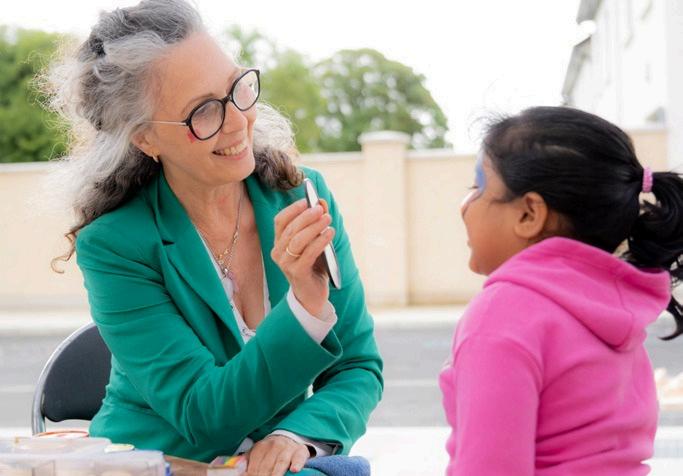
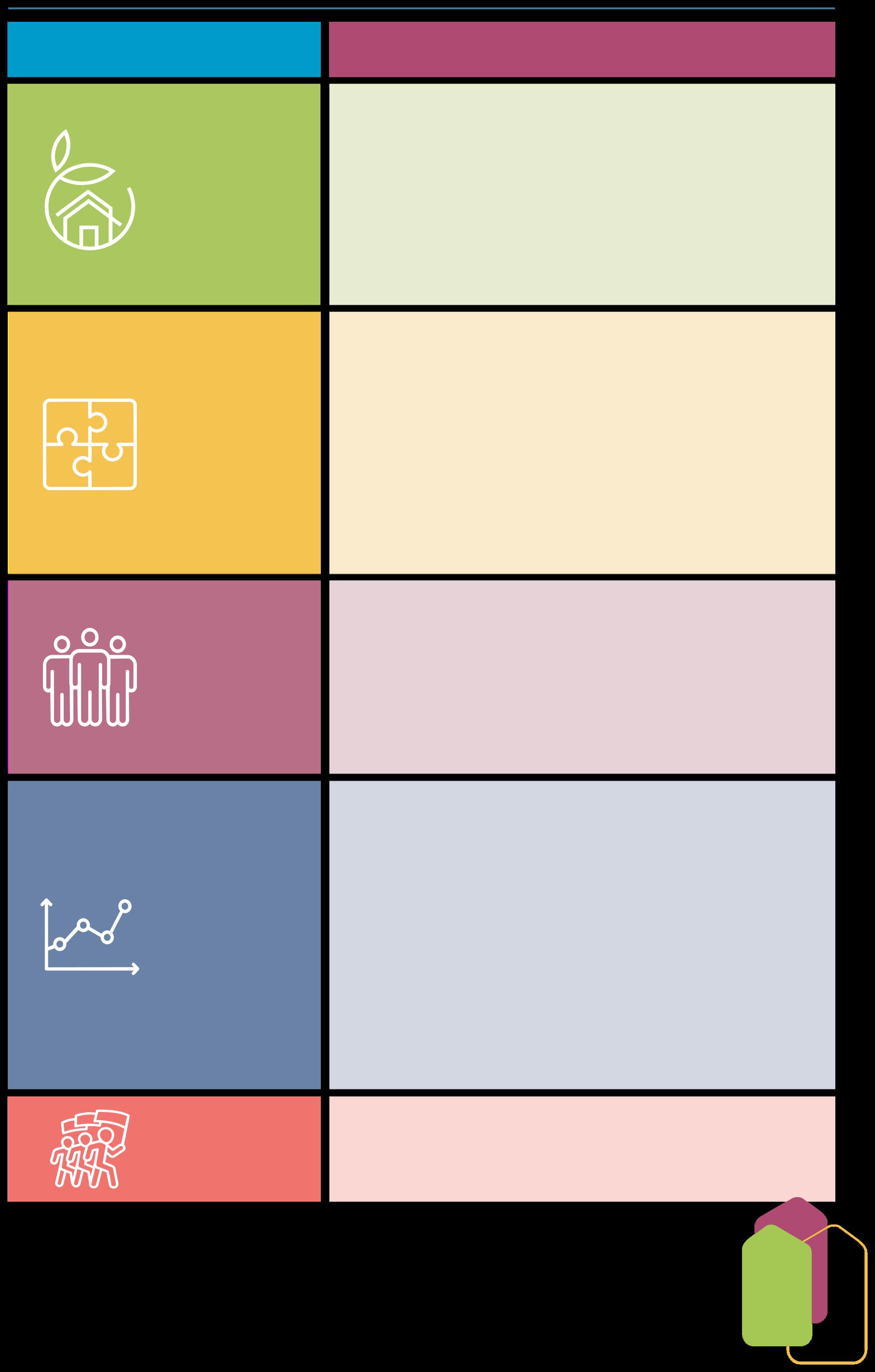
Goal 1
Growing cooperative housing
• CHI delivered 849 homes in 2023
• At the end of 2023
CHI owns and manages over 5 187 homes in addition to the 3 000 it supported through homeowner co-operatives
• Providing homes to an additional 14 000 people
• Celebrated its 50th year of delivering truly affordable housing with the official launch of its largest development ever of 208 homes at Kilruddery Glen, Bray, Wicklow
• The majority of our new homes are sustainable BER A-rated homes
• Prudent financial management and recertification for lending from the Housing Finance Agency
Goal 2
Building sustainable co-operative communities
Goal 3
Developing co-operative leadership
•
• • • • •
Production of a Member Association Event resource guide to complement the Member Association Handbook
Communal Artwork unveiled at Halliday Mills, Dundalk
CHI wins ‘Building Community’ at ICSH Allianz Community Housing Awards 2023 for Halliday Mills Member Association
Additional 57 homes at Newcourt, Dublin 8, received energy efficient upgrades as part of ‘Improving Warmth and Wellbeing’ bringing the total number to circa 110
CHI wins ‘Net Zero in Housing’ at the CIH All Ireland Housing Awards for its commitment to retrofitting homes
Targeted support to households on a number of issues including fire safety training, being a good neighbour, and paying rent
• 8 Members took part in our Board Skills Training Programme
• CHI established 20 Member Associations and finished 2023 with 10 in progress
• Community Leadership Wheel designed and disseminated to assist Member Associations in their leadership development
• CHI runs its inaugural International Women s Day campaign with an event Inspiring Women in Leadership an in-person panel discussion including the voices of women Member Tenants
• CHI now operates in 24 counties and delivered homes in Westmeath and Monaghan for the first time in 2023
• Continual improvement in how CHI operates to meet needs and improve efficiencies
• Rent arrears at 3 03% in December 2023
Goal 4
Raising our own capacity
Goal 5
Leading the co-operative movement
•
•
• Further growth in staff to 102 by December 2023, up 17% from 87 staff in January 2022 (excluding childcare)
• Evolve – Transforming Co-operative Housing Ireland
CHI s business transformation programme – Evolve – was launched in March 2023 The business has continued to grow exponentially, adding more homes and more people to the organisation year after year
Restructuring to Evolve
The Housing Services and Community Engagement division was restructured as part of CHI’s Evolve Business Transformation Programme
• CHI wins ‘Residential: Social and Affordable up to 5m’ in the Irish Construction Excellence (ICE) awards 2023
Participated in national and international forums on co-operatives housing and community issues
Ulster 22 849 homes delivered in 2023
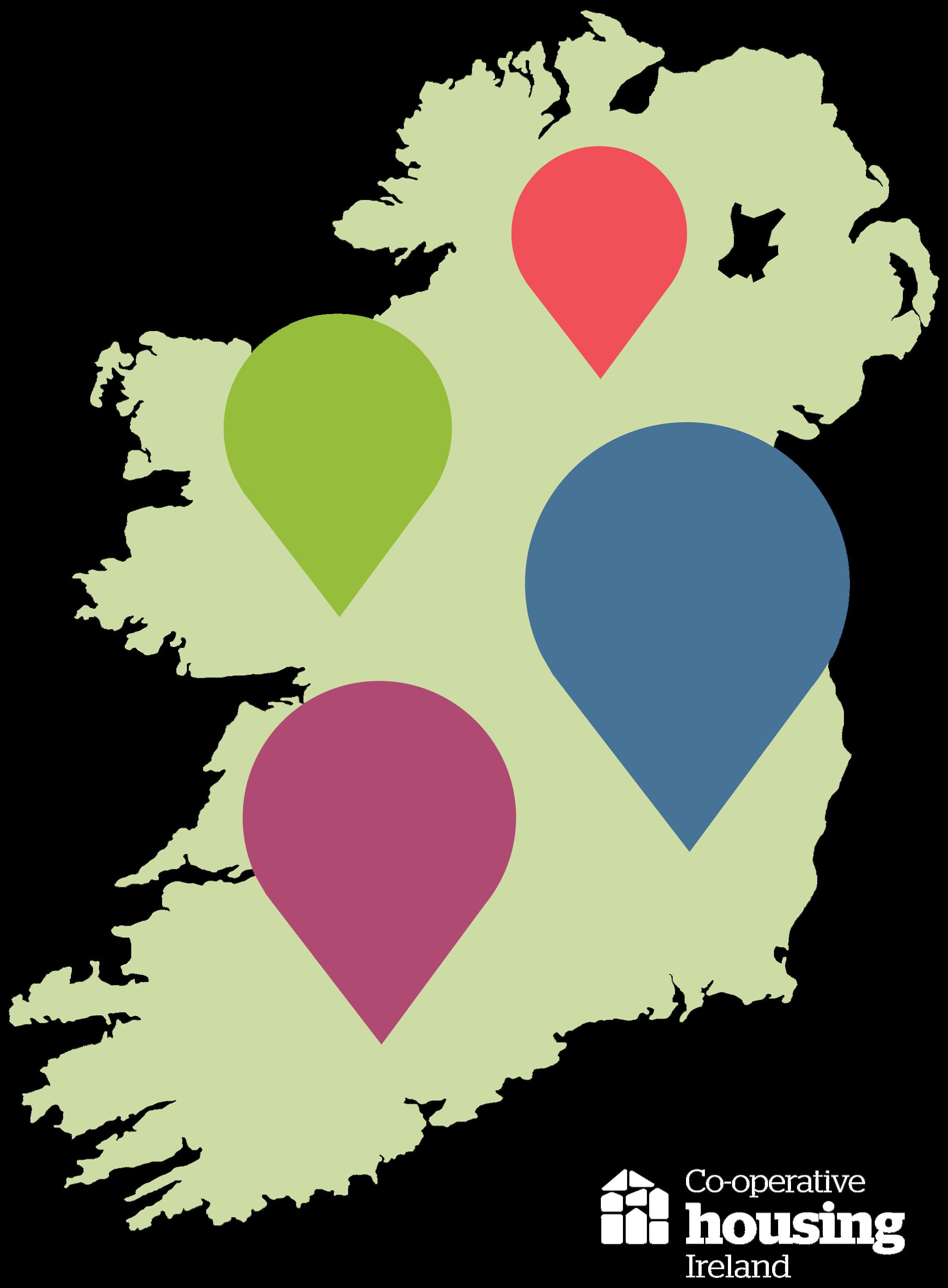
Connacht
Munster
Leinster
Co-operative Housing Ireland delivered 849 homes during 2023. The largest delivery of homes was in Leinster with 624 homes, followed by Munster at 147 homes, and Connacht with 56 and Ulster with 22 homes. Homes were delivered across sixteen counties: Carlow, Cavan, Clare, Cork, Galway, Kerry, County Dublin, Kildare, Laois, Limerick, Mayo, Monaghan, Sligo, Wexford, Westmeath and Wicklow. At the end of 2023, CHI managed over 5,187 homes nationwide with over 14,257 people calling a CHI dwelling ‘home’.
The last number of years have been a particularly challenging time for the housing sector CHI aimed for another record-breaking year in 2023, with a target of 700 homes. 2023 was a landmark year for the organisation, with its highest housing yield to date of 849 homes
This accounted for an 87% increase in delivery versus 2020 The impact of uncontrollable delays in construction prevented CHI exceeding the success of 2021 and reaching its 2022 target, as the residual impact of the Covid-19 pandemic was surpassed by the war in Ukraine Despite challenges presented by the pandemic, CHI’s housing output grew exponentially in the years that preceded 2023, with a delivery of 190 homes in 2017 to 849 homes in 2023, and a 347% increase over a six-year period The sustainability of quality housing stock for future generations will require a dedicated and steady contribution from organisations like CHI Under Housing for All, 90,000 new social houses are
to be provided from now until 2030, and AHBs will be central to this This ramping up of output is testament to the important role AHBs must play in social housing provision CHI is adapting to the difficulties presented by today’s building climate by seeking out larger schemes in a tighter pipeline This enables CHI to consolidate its workload while keeping delivery high CHI is focusing its delivery where it has a strong foothold, for example, where it has housing teams in operation and strong relationships with local authorities The organisation promotes the continued expansion of the co-operative housing sector as a solution to housing need
CHI is strongly influenced by its members Several of its 12 Board members are elected by the Membership households that live in CHI homes The inclusion of the Member voice at all levels ensures that CHI not only provides housing units, but homes where people can thrive
Leinster accounted for 624 new homes, or 73% of CHI’s output for 2023. These homes were provided primarily in Wicklow and the greater Dublin region
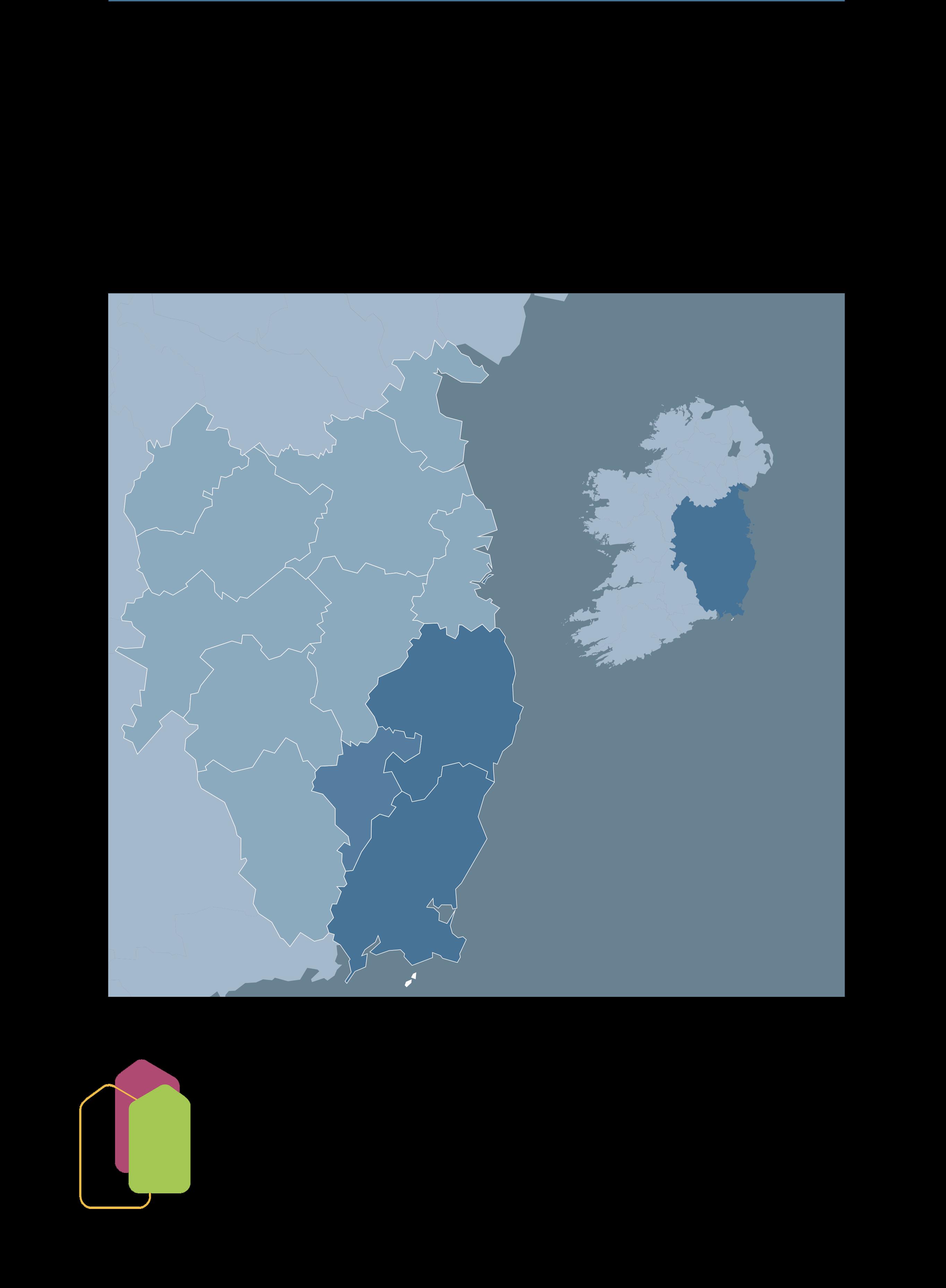
624 Homes delivered in 2023
“They thought I couldn’t live alone with autism, but look at me now”
Joseph McGoldrick, Moongate, Wexford
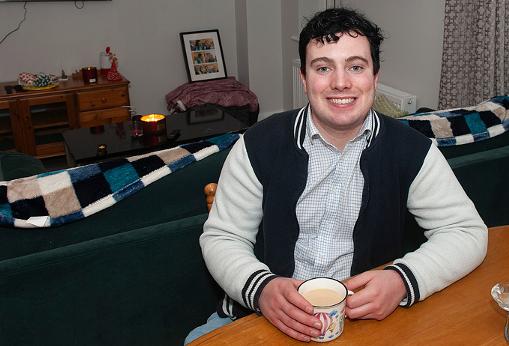
Joseph McGoldrick had a difficult childhood having moved into foster care at the age of fifteen. Originally, from Limerick, he was moved to Rosslare where he lived until the age of 18 Joseph has high-functioning autism and he struggled in school despite his hard work and efforts to study. Although he didn’t complete his junior or leaving certificate, Joseph was able to complete a QQI level 3 in the National Learning Network. Joseph is very proud of this achievement after suffering much doubt and negativity from his family.
Joseph is also extremely proud of his independence and positivity He has worked hard to protect his personal health and wellbeing and to keep the negative people at bay He cites part of his success to the support he received from his foster mother who encouraged his independence
Part of Joseph’s independence came from applying for housing and he was delighted to move into his new home in Moongate, Co Wexford in September 2023
Always cautious about money, Joseph was happy to receive such an energy efficient home which is well connected and convenient for his commute to Waterford where he is studying catering and hospitality
His future interest lies in a career in the restaurant business and in travel Joseph travelled on his own to Turkey at the age of 19 and he has a long list of places he would like to visit including France and Italy
“I felt ready to live alone, I was enthusiastic about it.”
– CHI Member Joseph McGoldrick
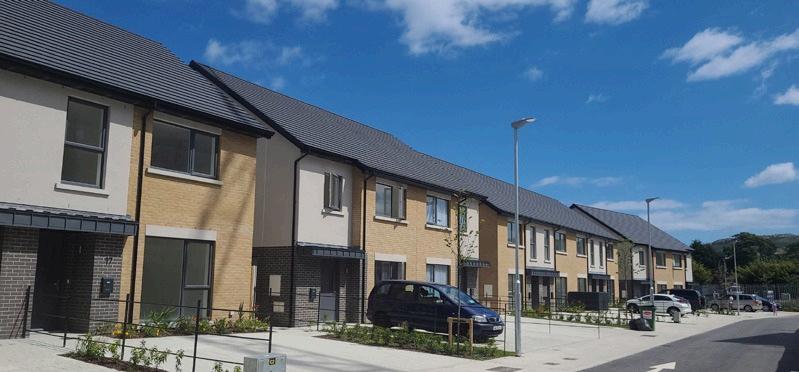
The launch of 208 homes in Kilruddery Glen, Bray, Co Wicklow was a landmark event in the history of Co-operative Housing Ireland. Coinciding with CHI’s 50th anniversary year, the delivery of the homes in Kilruddery Glen toward the close of 2023 put the year-end closing figure at 849 homes delivered – trebling CHI’s annual output in five years.
An official opening was held at the estate on November 15th, 2023, led by Minister for Housing, Local Government and Heritage, Darragh O’Brien, TD, and Cathaoirleach of Wicklow County Council, Cllr Aoife Flynn-Kennedy. Other notable attendees at the event were Wicklow TDs, Minister for Health, Stephen Donnelly, and our current Taoiseach, Simon Harris, who attended in his capacity at the time as Minister for Further and Higher Education, Research, Innovation and Science
Speaking at the event, Co-operative Housing Ireland
Chairperson, Pearse O’Shiel said, “208 homes is a significant development for Co-operative Housing Ireland, our largest to date It is equivalent to the annual social housing delivery of a county the size of Wicklow It is fitting that we mark our 50th anniversary with this achievement We are a national organisation currently with 5,000 homes, community building in 24 counties and on target for a record delivery of over 700 homes this year ”
Minister O’Brien said, “Co-operative Housing Ireland and others are key to achieving our housing delivery targets as set out under Housing for All. The organisation has grown, sustainably, to meet the challenge of delivering more homes. Approved Housing Bodies like Co-operative Housing Ireland have a critical role, as they will deliver approximately half of all social homes this year working in tandem with my Department. I want to wish all of the new residents here the very best of luck as they begin a new
chapter of their lives in these magnificent homes ”
Cathaoirleach of Wicklow County Council, Cllr Aoife Flynn-Kennedy stated “It’s a pleasure to be here today to celebrate the official opening of Kilruddery Glen Developments like this help us to achieve the quality of housing that we hope for, for all of our citizens, and will contribute to the economic and social diversity of Bray and County Wicklow by creating both a more stable and more vibrant community ”
Also speaking at the event was member tenant, Kasha Byrne, who said “For the first time in our lives, we’re finally putting down roots We have a home for life, we’re not isolated, we’re part of something and we’re emotionally invested in making it a happy and thriving community now and in the future.”
Bray Poet Laureate, Kayssie K , a poet and singersongwriter, who was born in Zimbabwe and raised in Bray recited a poem, commissioned by CHI, at the event called ‘Memories in Hallways’
The delivery of the A-rated, sustainable homes was achieved through a partnership with the Wicklow County Council, the Department of Housing, Local Government and Heritage, the Housing Finance Agency, the Housing Agency, and the estate was built by residential developer, Lioncor Construction, Townmore and designed by BHA Architecture
“My son used to get a lot of stares in the community, here we get waves and hellos and the children make a huge effort to interact. Being part of a community is great.”
Kasha Byrne, Bray, Co. Wicklow
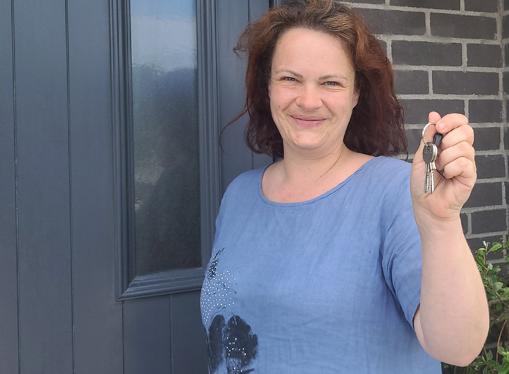
CHI member tenant, Kasha Byrne was among the first to move into the new estate, Kilruddery Glen, in Bray, Co. Wicklow. The estate signifies the largest single delivery of homes in CHI’s history which is fitting for the same year in which CHI celebrates fifty years in operation. Kasha moved into her home with her partner, Martin, who is a chef, and their three children, two of whom are on the ASD spectrum. The children all now have their own room and her girls have their own bathroom.
Karen felt very isolated in her previous home There were no other kids in the community and no road for the kids to play on Kilruddery Glen has been a completely different experience for them all with neighbours and children calling in regularly and a much greater sense of community There is a wealth of schools in the area and Kasha’s family have been able to make choices for their children based on each child and what suits their educational needs best There are so many choices they don’t have in other secondary schools It depends on the child what suits them
The transfer from the local authority house where Kasha and her family had been living took four years after nominations were put forward Kasha felt their last house didn’t meet their needs at all, as her children grew older Being settled and having security has given them much more structure to work from and has resulted in a more positive mindset for everyone in the family
Munster accounted for 147 homes, or approximately 17% of CHI’s output for 2023. The majority of these homes were delivered in Kerry
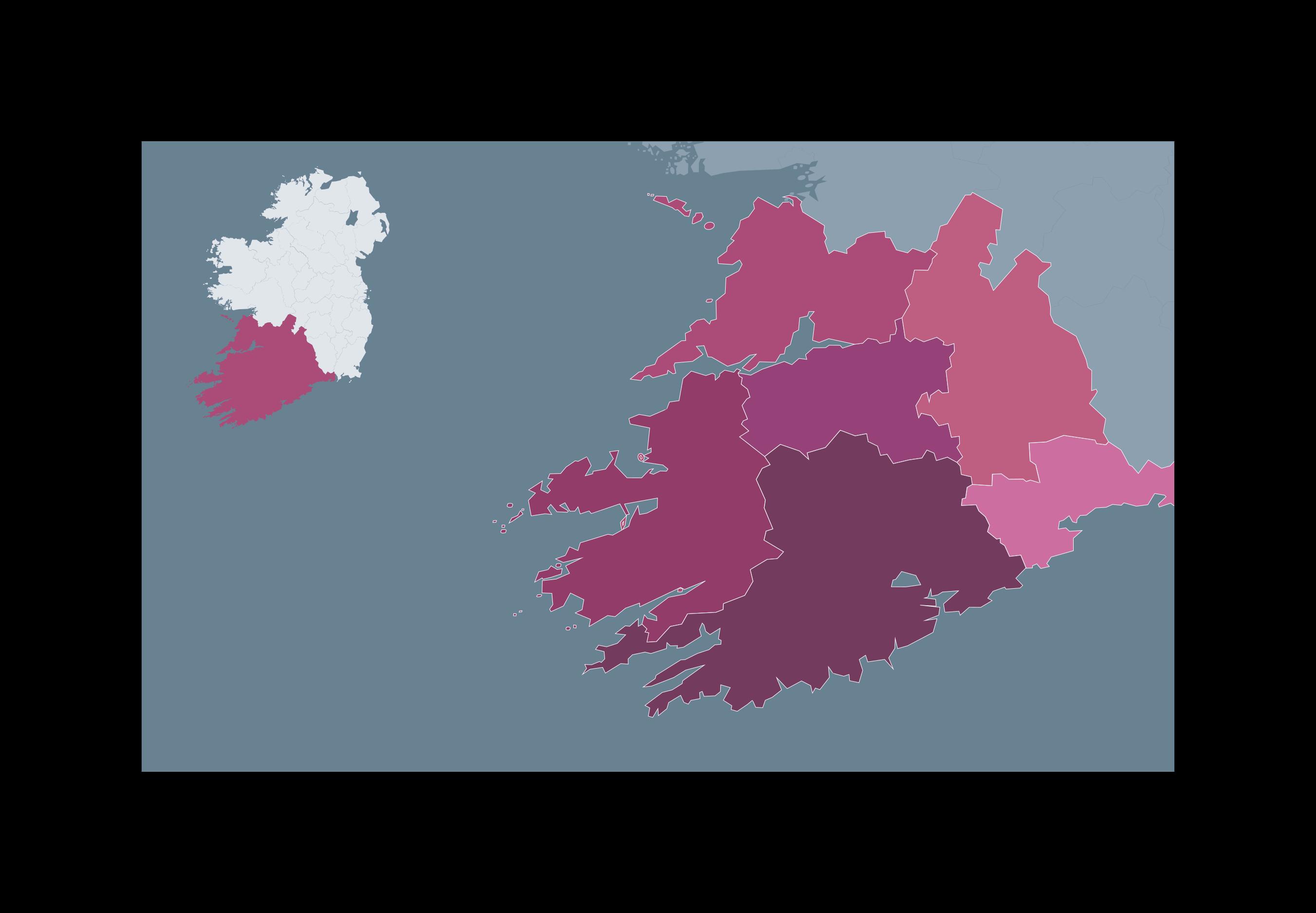
Sharon Malupande, her pastor husband Themba, and their daughters, 15-year-old Natasha and 9-year-old Shekinah, moved into their new home in Amharc Muileann in Limerick in December of 2021.
Before being offered their CHI home at Amharc Muileann, Sharon’s family had been living in private accommodation which the landlord decided to sell As a result, they found themselves without secure tenure which really took its toll on the family The family qualified for inclusion on the local authority housing list but there were no houses available and a lot of families ahead of them so there followed a very unsettling time in emergency accommodation

“The landlord wanted to sell and a lot of landlords were doing that at the time We loved the area we lived in and our children were in school there But even if we rented somewhere else privately, there was no guarantee that we would not be asked to move again ”
A representative from the local council introduced them to the possibility of a home at the Amharc Muileann development which is how the family came to be one of the first residents of the estate on Bloodmill Road which was officially opened by Darragh O’Brien Minister for Housing Local Government and Heritage of Ireland in June 2023
“We were so excited when we were offered the home in Amharc Muileann, we knew we wouldn’t have to worry about moving again. We felt very relieved. My family love it.”
– CHI Member Sharon
“The house is lovely, and we have great neighbours,” Sharon said of the three-bed home
“Our children didn’t have to change school I can walk into work from here and my husband, who’s a minister and works part-time for Amazon is near to work as well ”
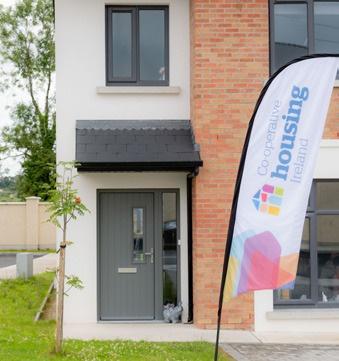
“Having all the kids with me in my own home is what I’m looking forward to the most this Christmas It’s been a nightmare getting here and life threw curveballs at us [but] we’re in our new home now and we love it.” Karen said. Karen and her children were waiting 11 years for a permanent home before taking up residence in her brand new ‘forever’ home in Lawlor’s Hill, Ardfert During that inordinate wait, they endured frequent insecurity amid eviction notices and difficult challenges of often cramped rented spaces In June 2023, on Karen’s birthday, she received a welcome call from CHI to notify her that she was in line for a new home Karen and her family moved in three weeks before Christmas
“It feels like life is starting over again” as she can finally put down roots and has the security and peace of mind that comes with a home of her own
The past few years have been tough for Karen and her family, as it was for many people, during the pandemic. In the two-bedroom apartment where she lived previously, Karen found her living situation very stressful with her two older boys sharing one bedroom, an apartment that was cold and damp and a landlord who was very difficult.
Moving into her new home at Lawlor’s Hill was a seamless process Her ready-to-move-in home was the perfect canvas for her to make her own and add her own personality
“It’s been a few years since I’ve had my whole family around the table sharing a meal and having a laugh That’s my dream ”

Connacht accounted for 56 homes or approximately 7% of CHI’s output for 2023.
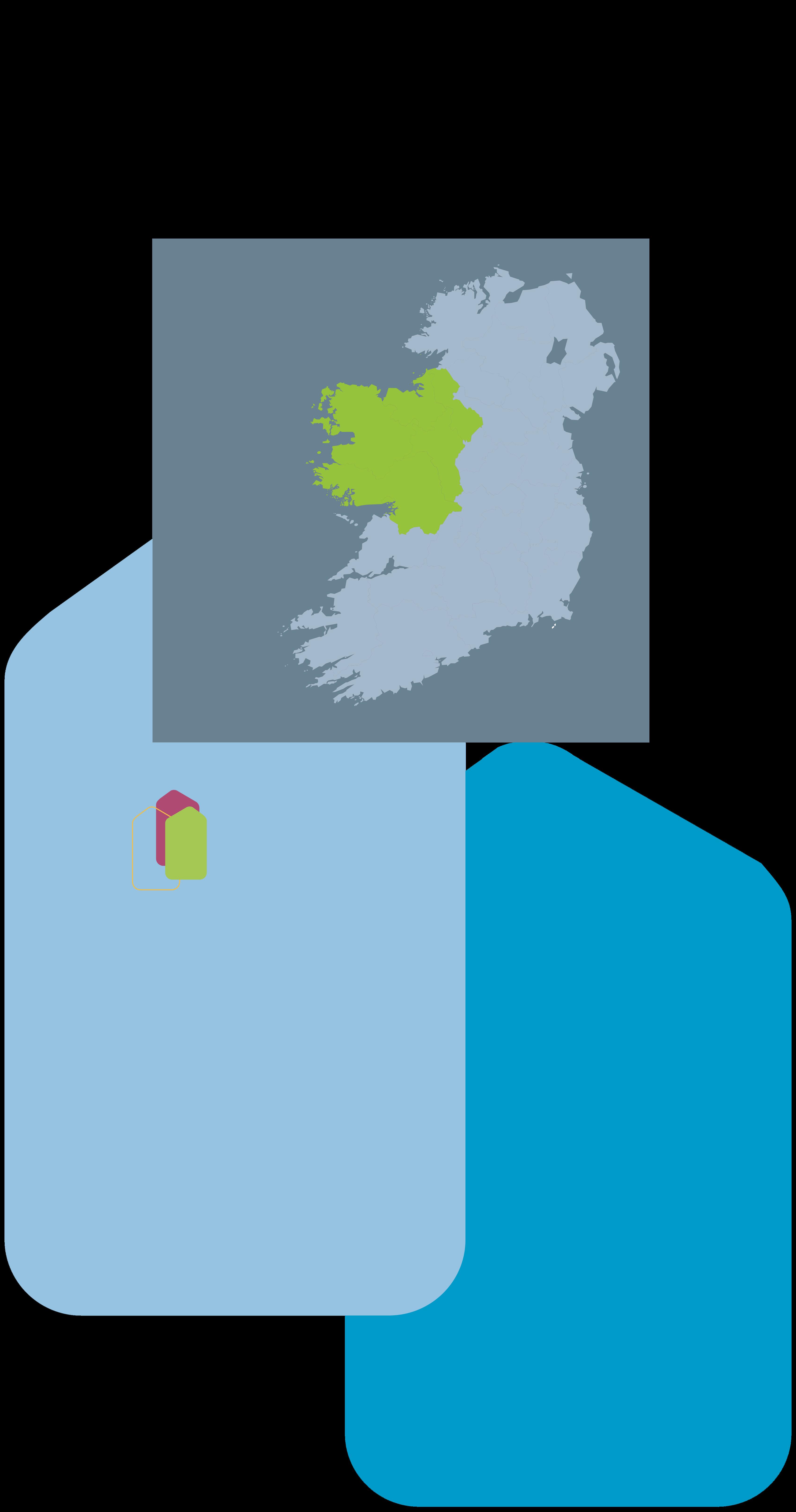
“To have the comfort and security of my own home now makes such a difference.”
Mary Gormley, Vicar’s Choral, Tuam
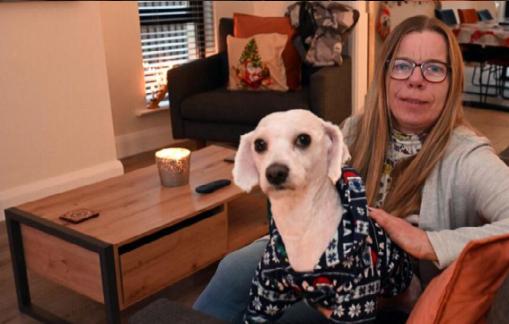
Mary and her family moved into Vicar’s Choral in Tuam, Co. Galway, in August 2023. Mary moved in with her 17-year-old son and her 23-year-old daughter. Mary’s family had spent the previous 23 years living in privately rented accommodation in a nearby estate which was a lot larger and much more hectic. “With renting, you are on tenterhooks every day because the landlord could decide to sell at any moment. To have the comfort and security of my own home now makes such a difference.”
Mary’s family are enjoying their new home which they say is very peaceful and quiet yet only a few minutes from the town centre “The houses are beautiful It’s great to put our own stamp on it To move into a brand new, sparkling house, I felt like I won the lotto! I was delighted with the fine big kitchen Another thing I love about the house is that the heating is air-to-water, there’s no need for firelighters, turf, coals, and there are no ashes to clean In the previous place, we had a stove that heated the house and the water, but you would have wanted a bag of coal a day to heat the place! Now, it’s constantly warm ”
The pandemic had a big impact on the wellbeing of Mary’s children and having a secure and safe place to live has had a very positive impact
“My kids love the place, especially my daughter. Sure, you know boys -- my son would sleep in a tent, but it was really important for my daughter to have a stable place. She has settled well. She’s in great form and the house has made such a difference. And my son loves being beside the stadium.”
Ulster accounted for 22 homes, approximately 3% of CHI’s output for 2023. The organisation delivered its first homes in Monaghan; Drumbear Wood is a development of 17 homes located outside Monaghan Town.
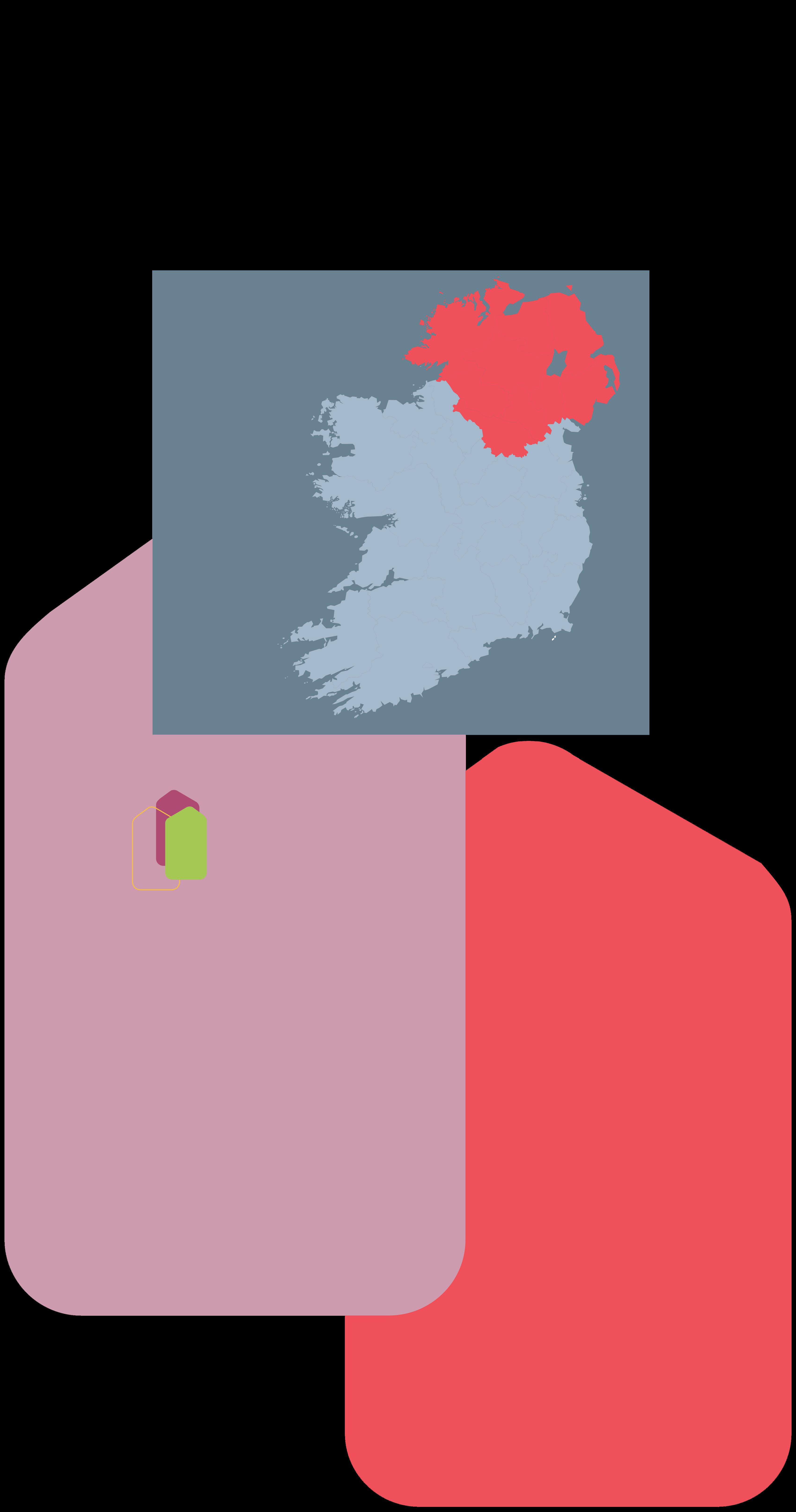
“I don’t know how CHI managed to find the right community [for us]; it’s like CHI almost have a magic remedy. It’s important to me that we sustain what we’ve been given here, as we grow as a community and the next generation is coming up.”Olivia Johnson, Drumbear Wood, Co. Mo
Olivia Johnson and her four teenagers (two girls and two boys) were living in rented accommodation in Emyvale for over seven years before moving into their forever home in Drumbear Wood, Monaghan. While their landlords were lovely people, the home they rented in Emyvale was quite antiquated and Olivia felt like she was always living with a low-grade concern that the landlords would give notice and ask them to move.

Since moving to Drumbear Wood, Olivia feels like she finally has a connected community. “There is such an interesting selection of people living here. I’ve spoken to them all and they all call over and our kids have become friends It’s interesting that we are all similar in age, and we have had a lot of different life experiences We’re all in a place where we don’t have time for drama ”
Sustainability and the environment are very important to Olivia, and she wants to encourage biodiversity so working with the community on some growing projects is a high priority for her “We’re lucky there’s a forest nearby, and the oxygen supply from that is great to offset in a built-up area I want to get a Member’s Association set up so we can put things in place and run some activities ”
Olivia is an art teacher and she studied design in the IT in Galway and then went on to do fine arts degree
in DIT, followed by library management in UCD. She’s also completed other diplomas in ceramics, art, and horticulture. She volunteers in youth work with LGBT+ teens. “Working with art, people, and in nature, it’s amazing the positive release of chemicals that brought about in people I’m not an indoors person, so if I can work outside, I will ”
Olivia is looking forward to watching her children grow and making her new home in Drumbear Wood her own with gifts of art which she gets for her kids each year She’s happy to have a home where she and her children can inject their own sense of style She’s also looking forward to the real sense of security that comes with growing and being a part of a community
2023 has seen continued growth for Co-operative Housing Ireland where we delivered a record 849 homes (21% of AHB housing delivery in 2023), despite challenges facing housing delivery. Our Pipeline for 2024/25/26 is very strong and we expect to deliver 10,000 homes by 2030 Last year due to supply chain issues and inflation housing delivery was immensely challenging. The new CALF model has been very challenging as there are delays in obtaining CALF approvals over the old model and this also has delayed projects completing within their planned timelines Housing prices and construction inflation continues to rise resulting in increased costs to deliver new homes.
Despite these obstacles, CHI is confident of reaching our goals and delivering substantial numbers of new homes over the coming years.
With the emphasis on delivering new and much-needed social housing, our early contact with new Members before they moved into their new homes was a key part of our engagement throughout the year This communication phase is crucial for establishing clear roles and responsibilities for both tenants and CHI as the landlord Communication was carried out through letters, messages, website posts, social media updates (Facebook and Twitter), and SMS text messaging Our quarterly Member newsletter was produced and delivered by post to each household and emailed in electronic format The Housing Team has relied on ICT to communicate with new and existing Members

Reflecting the growth in our housing stock, the Asset Management and Property Services (AMPS) Division continued to expand across 2023 A key area of this growth has been the Contact Centre Team, which as of September 2023, assumed responsibility for managing all incoming calls to CHI including the Repairs and Customer Services lines This centralisation aims to enhance service efficiency and ensure we deliver an excellent customer service while achieving value for money
Our Capital Works programme and the Improving Warmth & Wellbeing project also continued throughout 2023 At our Newtown Court Scheme in Dublin, 57 additional homes received energy efficiency upgrades, improving their BER to a minimum of B2 and in most instances achieving even better ratings Phase 2 of our Window Replacement Programme at Newtown Court was also completed, along with several other smaller component replacement projects across the country
In the second year of our rolling Stock Condition Survey, CHI conducted over 900 detailed inspections of individual properties and 89 blocks This detailed data will enable CHI to plan and forecast future capital lifecycle component replacement works with greater accuracy and efficiency

Total Calls answered: Answer Rate: 97% Average wait time: 27 seconds
29,933
Fire Alarms Serviced: 600
Average daily calls per agent: 62

Compliant Repairs orders raised: 11,000+ Lifts Serviced: 196
Spend on Responsive Repairs: €2m
Total Spend on Capital Works: €4. 5m
Chimneys Cleaned: 842

Total number of Stock Condition Surveys completed in 2023 as part of our rolling Stock Condition Survey:
990 homes 89 blocks and
In 2023, The Member Engagement team changed their title to Community Engagement as it represents more clearly what the team are trying to achieve In CHI the word community can be understood in a number of different ways be it;
• Communities of place.
• Communities of interest.
• Identity-based communities.
• Communities of need.
The Community Engagement team have grown this year through the addition of colleagues to the team, as well as its ambition and visibility across the CHI network
This annual report provides the reader with a taste of what the Community Engagement team have achieved but does not take a deep dive into the amount of time and creativity it has taken to achieve the actions set out in the annual report
This year the Community Engagement team alongside their colleagues in CHI were recognised by the ICSH for their efforts by winning the category ‘Building Communities’ at the ICSH award 2024 will bring about the next step in the approach of Community Engagement within CHI through creative opportunities to increase the involvement and influence of our member tenants in decision making processes that impact their lived experience

The Community Engagement Team have completed the year with 30-member association (resident groups) set up in CHI communities There are 20 member associations that have been fully set up (with bank accounts) They have availed of the community fund that is made available through CHI The remaining 10 are in a process of development Throughout the year the community engagement team have had 466 interactions with each of the committees through calls emails and in person meetings
The benefits of the established member associations can be seen throughout CHI as well as the wider communities that they are situated in They help Members to:
• Create a sense of belonging within the
• Run events and activities that benefit the community as a whole
• Share advice and information with other people in the community
• Campaign on issues that relate to all the members in the community
Locations of CHI community Member Associations in Ireland
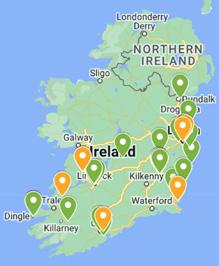
This year Member Associations have been invited to participate in the Community Leadership Wheel which is a confidence and capacity programme The intent of the programme is to support the Member Associations in their development so that they have the confidence and capacity to grow as a member association and community Sessions are tailored to the needs of the group and are bespoke to each community
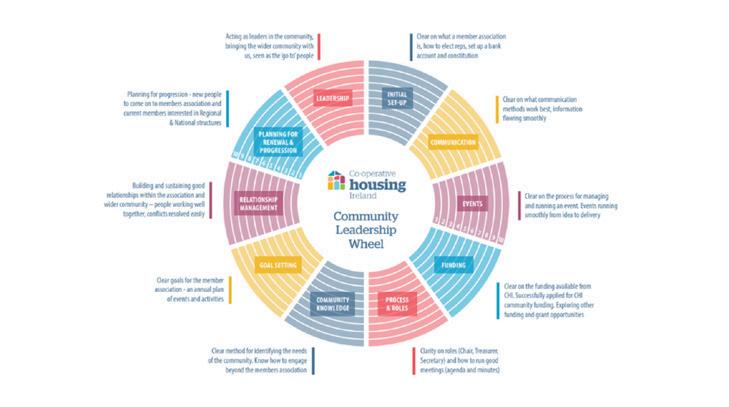
CHI’s Member Engagement team invited Member Associations to apply for €400 funding, separate to the Community Fund, to hold an event that brought neighbours together to celebrate diversity in the community. The aim was to enhance community spirit and connection. Eight communities from across the CHI network took part in Neighbours Day, this coincided with International Diversity Day The celebration is an opportunity to reconnect with the values of solidarity, conviviality and friendship that should be at the forefront of neighbourly relations. The communities held family days, had food sharing initiatives, and played games from their youth, and communities that they originated from
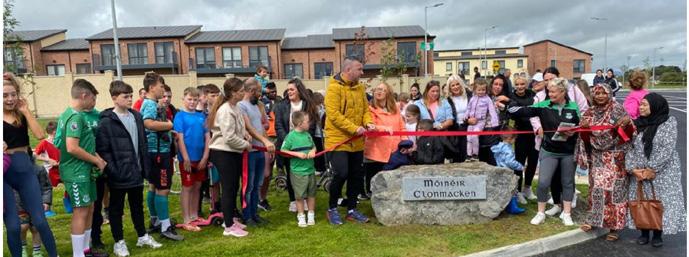
Sarah Power of Móinéir Clonmacken Member Association shares her experience of Neighbours Day: “My name is Sarah Power; I am a second year student in CWELL and I truly enjoy working within communities Last year I moved into the newly built housing estate on the northside of Limerick city After two months of settling into our home CHI invited the residents to a meeting to talk about forming a committee I was delighted to attend and was voted in as secretary As I grew up in a disadvantaged area, I had seen firsthand how deprived some communities are and how this leads to anti-social behaviour, criminality, violence, negativity and so on I was eager to get involved in my Member Association to prevent this from happening in our community I have 4 children ranging in ages from 3 up to 10 years old and I only want what’s best for them growing up just like any mother does I want to lead by example and teach them to do nice things for others and get involved I feel that when children are involved in anything, be it helping to clean up our estate or give out leaflets of information,
they will respect it more, as they see the work they put into it Móinéir is a multi-cultural community I along with others on the association felt it would be great to hold a Neighbours Day event on August 12th We also had an official opening day for Móinéir This date suited everyone as the final phase of houses had been completed and all the Members had moved in It was our hope that all the families living here would come out to meet their neighbours, we also suggested some households bring a dish, this gave everyone a chance to meet each other and show others what skills they have We had a marquee set up with all different types of foods which were delicious! There was a kid’s entertainer ice cream van face painting and a soccer tournament for the kids The turnout for our event was spectacular Everyone enjoyed it It gave everyone a sense of belonging to their community and the kids made friendships During the day of our event a lot of members wanted to join our association which was absolutely brilliant! We were delighted to get new people on board ”
Each year the Community Engagement team in consultation with the entire Housing Service and Community Engagement division select a number of communities that they will work with throughout the year using the community development approach. The community engagement team work alongside the community to support them to understand their needs and requirements to shape a sustainable flourishing community.
This community of 85 homes is based in an apartment complex in Dundalk The community is a diverse one that faced several challenges in the early stages Even through the challenges many of the member tenants wanted to ensure that it was an active vibrant community With the support of CHI they established a member association and ran a number of activities
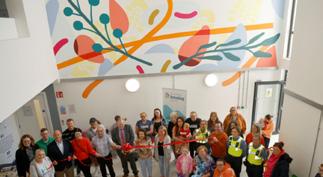
For the larger community development project an initial consultation took place to invite the residents to engage with the process The outcome of the consultation was to put more colour and life into Halliday Mills Working with the repairs team colour was introduced in the doorways and the lift shaft Through community consultation with a street artist, an original art piece was developed A launch was held inviting community partners
The community of residents living in houses and apartments are based in Blackrock in Cork Through a consultation with residents, it was identified that many residents do not know each other, and they felt it was important to bring the community together in a shared experience The community engagement team organised a sports day event with The Junction using a local amenity, Blackrock Hurling club, as the venue for the event It was a major success bringing many residents
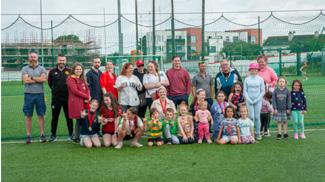
together This led to the member association being reestablished with fresh enthusiasm and a meeting with CHI colleagues to also bring about trust between CHI and the community
Aisling Estate has 23 homes based in Clare Like the other community development projects the community members took part in a consultation There were several items in the consultation that the community felt like they would benefit from, but most importantly that they wanted to get to know each other a bit more This community development project started in 2022 In 2022 the community were invited to take part in a community crafts day In 2023 the community were invited to participate in a Halloween Fun Day This was an effective event as residents were able to mix with each other and start sustainable conversations
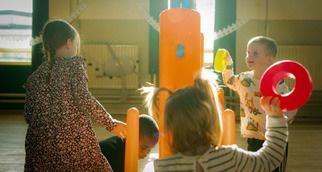
Communities can be defined in many ways. Either through geography, interest, position in the world, belief system etc. It is important to recognise that we are not just in one community but many and the positions that we take in each of the communities are different depending on the familiarity, distance or engagement with the community. In CHI we are aware of this and understand that our member tenants are not just in a community based upon the home that they live in.
There are three communities of interest that are facilitated by CHI
Book Club
This has been running for three years By the end of the year it is a member led group with the hope that it will sustain itself In 2023 there were eight consistent members

ALMAS Story:
‘I shouldn’t have been so apprehensive of joining an online Book Club on Zoom for it turned out to be quite uncomplicated.
Living away, I’d just returned to live with my daughter and grandson to find that Co-operative Housing have an on-line book club which I cautiously joined; I had little expectations as I don’t belong to any social media platforms like Facebook Nonetheless, my daughter pressed all the right buttons, and I was in!
As in all books you enter into a different dimension and one of which was ‘In Order to Live’ by Neomny Parks in North Korea It is a most extraordinary description of escaping terror and hunger through China and finally to freedom in South Korea by way of Mafias! The book ended so incredibly well after real, life-threatening episodes, thus showing in our own lives having no way out, we end up utilising our own weaknesses to become our strengths
Though I am a slow reader, I read through our last book quite quickly ‘The Ladies’ Midnight Swimming Club’, which I enjoyed a lot at first, until my fellow readers pointed out many inconsistencies which I partly agreed with, so, I was glad I had read it all continuously
Seeing you all my fellow readers in your homes is very comforting and I have taken enjoyment from being part of our Book club!’
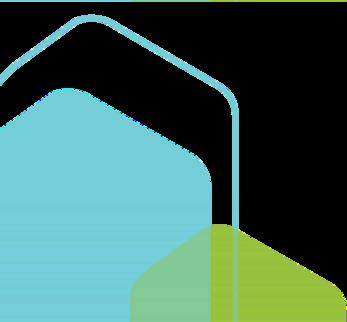
CHI is aware of the knowledge and interest that our member tenants have in horticulture, and it was through this that the growing community stemmed The group have introduced the growing corner in the member newsletter and have an active role in the community engagement Facebook Page
From a request of the member tenants CHI have launched a creative writing group with the aspiration of developing a self-published book of short stories

This year we have seen the growth and development of the training that we have been able to provide to our member tenants. The online training has been most effective during the dark nights, while in person training works best during the summer months.
Workshops that are designed to support individuals to participate fully on a board of their choice Eight people fully completed the board skills training in 2023
In collaboration with Inner City Enterprise the Community Engagement team hosted a set of workshops to support individual member tenants who want to be their own boss and go on the journey of entrepreneurship First Aid
The Community Engagement team with the expertise of a number of First aid providers hosted a pilot programme of first aid training in three regions in 2023 Dublin Carlow and Limerick This has been a success and will be repeated in 2024
Laptops for Member Tenants entering third level education
In 2023, with the support of the CHI National Board the Community Engagement team embarked on a social investment project supporting residents in CHI homes who were entering a degree level programme for the first time by gifting them a laptop These laptops support these individuals so that they can actively participate in their course and engage with the course material 46 residents applied with 23 residents fulfilling the eligibility criteria
The Community Engagement team set up a Community Engagement closed Facebook group for residents of CHI homes back in 2021 The aim of the group is to share community activities that are going on throughout the country, to share ideas and to generate discussion The group has gone from strength to strength in 2023 There are now 959 members on the Facebook group the engagement between member tenants has increased and to this day there has been no negative interaction on the page This is a good-natured sharing group which shows the spirit of the national community
Over the past year, the Community Engagement team have developed two member resources.

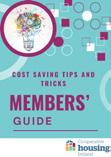
The first is a ‘next steps’ booklet that supports Member Associations to organise and develop community actions and initiatives This booklet will be given to Member Associations that are trying to find their feet, follow good practice and generate ideas that they can participate in with their communities

The next is a co-created booklet with the Community Engagement team, Income team and member tenants The booklet is titled ‘Cost Saving Tips and Tricks’ The narrative of the document comes from the voice of the member tenants through their participation in two engaging focus groups The booklet was designed due to the active cost of living crisis that we are all living in

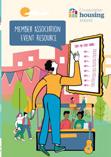
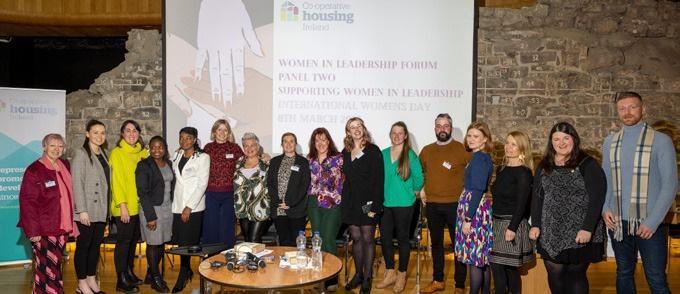
Two thirds of the residents living in CHI homes are female and CHI believe that it is important to raise awareness of International Women’s Day every year.
The first panel focused on Inspiring CHI leaders and comprised of CHI Members who have contributed significantly to their communities, been active Members of the CHI board, or grown their own businesses Joining the discussion were CHI members Mamy Nzema Nkoy, Caoimhe McCarthy and Marianne Ward-O’Leary Maughan
CHI Member Mamy Nzema Nkoy shared her experiences of supporting people in education, academia, and finding her feet as a leader in her community Last year, Mamy was presented with a Leader in the Community award by the BallyfermotChapelizod partnership for promoting education in her area At the Women in Leadership Forum, Mamy said
the most important thing a leader needs to have is a “clear vision that others can get behind and support”
Women who have inspired Mamy include her own mother and Julia Gillard, the first female prime minister of Australia, whom she admires for having risen to a role in leadership after settling in a new country
Member Caoimhe McCarthy discussed the steps she took when setting up family-run business, Sitto Z, who make their own signature artisan chilli sauces, dry rubs and juices Discussing the business, Caoimhe described how in 2016 her husband, a chef by profession, suffered life altering injuries which rendered his chef days over Sitto Z was created to bring the skills of the family together into a viable business
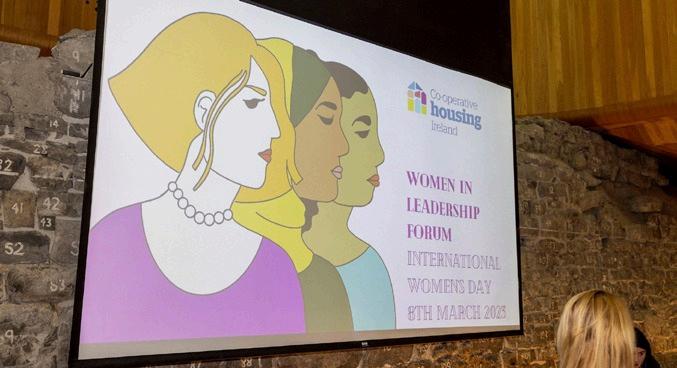
During the discussion, Caoimhe emphasised the importance of teaching her teenage girls practical interpersonal skills to be successful, especially in business These skills included “engaging with the public at marketing events, offering samples, and being wellversed in explaining a product ” When asked about women leaders who inspired her, Caoimhe said she always looked to her own mam, who was “constantly reinventing herself”
“Women have a lot of life education to bring to the table, which should not be overlooked by others or by women themselves.”
She emphasised that women have a lot of “life education” to bring to the table, which should not be overlooked by others or by women themselves She described her move from the halting site to her forever home in Kilcronan Court in 1996 She said that she was “ very proud” of her “traveller heritage and traditions” and that her move was something she did so that her children would have “ a better chance” at pursuing their goals Speaking about women who inspired her, Marianne said her mother was a “strong woman ” and a huge inspiration for her, having lived “most of her life by the roadside which presented many challenges for her and her family
CHI Member and Board Member Marianne WardO’Leary Maughan joined the discussion to talk about the importance of encouraging women to take on leadership roles Marianne was recently voted onto the national board of CHI and is the chair of the Members Association in Kilcronan Court Marianne described a good leader as someone who has “support, empathy, passion and drive”
Co-operative Housing Ireland’s ambitious plans for growth in housing delivery and services to Members required a necessary growth in the organisation’s team and their professional development. At the end of 2023, CHI operated across 24 counties and the number of people working for CHI, across all areas of the organisation, excluding childcare, increased to 102 An increase of 17% since 2022
Evolve – Transforming Co-operative Housing Ireland
CHI’s business transformation programme – Evolve – was launched in March 2023 The business has continued to grow exponentially, adding more homes and more people to the organisation year after year This trajectory of growth would see us reaching around 10k properties by the end of the decade Becoming an effective larger business, however, is about much more than adding properties and people
To remain fit for purpose CHI needs to change the way it does things, and in some cases change the things it does Or to put it another way, we need to do things better and do better things During 2023 a series of ‘visioning’ sessions were held with the Executive Management Team, colleagues across CHI and a group of interested tenants. From these sessions several themes emerged which provided the framework for the business transformation programme, these were:
• CHI the organisation
• People
• Acquiring and maintaining our homes • Tenancy and Neighbourhood Management services • Performance management –KPIs and targets
We then prepared to move into 2024, recognising that the next steps in the Evolve programme were to develop these themes into a programme of work which will help shape the business as we move forward.
As an initial next step (following on from the Housing Services restructure, which was, effectively, the first project to be delivered under the Evolve programme)
an internationally recognised customer service training organisation, the Mary Gober Institute (MGI) was engaged to provide training across the organisation. Before the year came to an end, MGI held introductory sessions with managers across the business to prepare us for the work to come in 2024
The Housing Services and Community Engagement division was restructured as part of CHI’s Evolve Business Transformation Programme. This restructure primarily focused on moving from a geographic model to a functional model.
One benefit of a functional model is that it provides the strongest opportunity to achieve both service consistency and high levels of performance It also allows room for the division to scale up within a growing organisation Colleagues can develop specialist skills in one clear area of focus Two new Heads of Housing Services roles were created to bring clarity on the management structure and provide single points of management accountability for individual services across the entire country
It is important for the new teams to work together in a spirit of collaboration and partnership This cultural aspect was central to the restructure It is lead from the top by the Director of Housing Services and Community Engagement, and re-enforced at all levels of the division, to ensure that the functional arrangements don’t result in silos, but that joint-working is the hallmark of how services are delivered
The new teams and their roles/responsibilities are as follows:
• Neighbourhood Team (Allocations & Lettings / Tenancy & Estate Management)
• Income and Financial Inclusion Team (arrears / other debt management / rent collection / financial inclusion)
• Safer Neighbourhoods Team (Anti-social behaviour / domestic abuse)
2023 proved to be a challenging year for the Income Team. In July and August there were significant issues with the Tenancy Management system, these hampered the income collection process, there were also further issues during the year with the system which impacted on the arrears recovery process. Thankfully with the assistance of the IT team many of the issues have been resolved. Although arrears did increase for CHI in 2023, the arrears percentage compares favourably against those reported by other AHB’s.
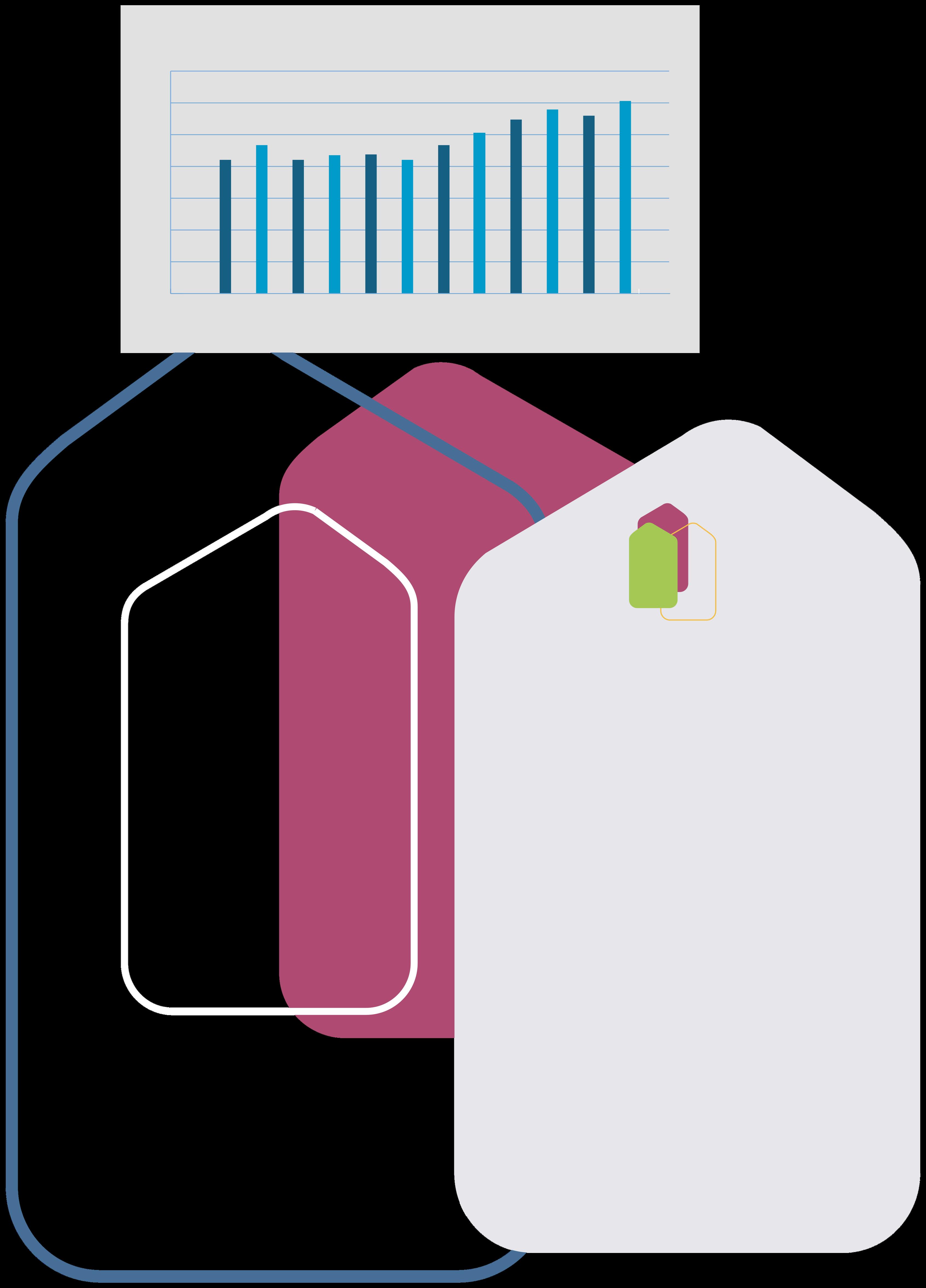
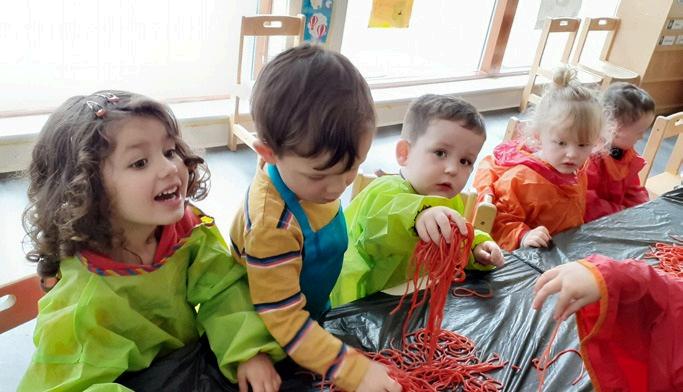
Co-operative Housing Ireland continues to provide quality early years education and school-aged childcare programmes to our CHI members and the wider community of East Wall, Dublin 3.
Nationally, the demand for childcare is increasing and this is evident particularly with the schoolaged Childcare programme By the end of 2023, our registration status was at 89% for our early years and school-aged programmes
The early learning and childcare sector saw a substantial package of €403 million in the Budget 2023 hitting the First 5 investment target of €1 billion This funding has been greatly appreciated by the sector nationally
From January 2023, funding of €121 million was allocated to reduce the parental co-payments for those registered on the NCS This funding saw an increases from €0 50 per
hour to €1 40 per hour for those accessing the universal subsidy With a major investment injected into the early learning and childcare sector this resulted in all our families signing up and benefiting from the reduced fees with some parental co-payments dropping by 21% making access to childcare more affordable for the families we work with
In August 2023, Co-operative Childcare Island Key renewed their contract with the Core Funding for the 2023/2024 academic year guaranteeing affordable childcare to our families by continuing to operate a fee freeze and ensuring the quality care provided remained high for both children and staff members
Co-operative childcare Island Key were successful in obtaining capital funding for the ‘Building Blocks Improvement Grant’ under the National Development Plan This funding was used to redesign and upgrade the existing kitchen and children’s sanitation spaces These works were completed in August 2023 and have provided more storage space, additional toileting and washing facilities and better accessibility
Co-operative Childcare strive to ensure we provide the best quality of care to our children and families We continued to work closely with Better Start throughout 2023 in delivering positive outcomes for children by working with the Siolta and Aistear Frameworks
Upon completion of the programme, all staff remained focused on developing the ‘Parent Partnership’ and ‘Curriculum’ pillars as well as implementing new ones
One staff member completed and graduated from the LINC programme in October 2023 at Mary Immaculate College, Limerick
The LINC programme is a Level 6 Special Purpose Award (Higher Education) that is designed to support the inclusion of children with additional needs in the early years
We also continued to work in partnership with several childcare organisations throughout 2023 Island Key worked closely with the National College of Ireland in delivering the Early Learning Initiative to the early years and school-aged childcare programmes to improve their literacy and numeracy understanding
Other organisations that we worked with regularly included Dublin City Childcare Committee, Early Childhood Ireland, POBAL, Tusla, National Childcare Scheme, Better Start and other local organisations
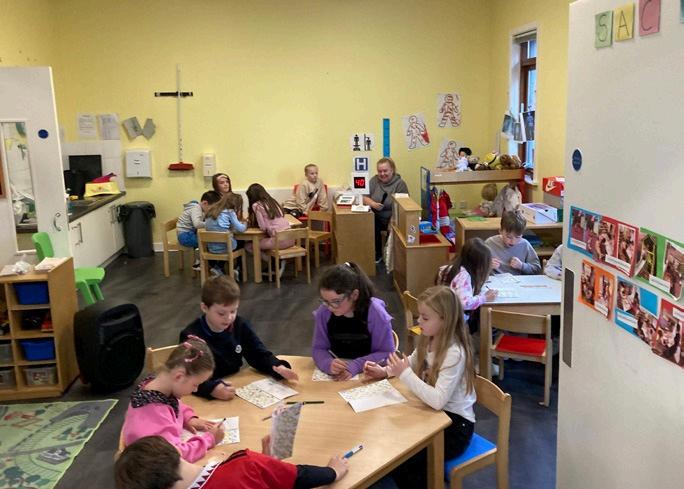
Co-operative Housing Ireland Society Limited (“the Society”) was formed in 1973 under the Industrial and Provident Societies Acts (Reg No 3174R) and is the national organisation representing, promoting, and developing the co-operative housing movement in Ireland The Society is jointly owned by its affiliated co-operative housing societies It is a not-for-profit organisation whose objectives are charitable in nature and has charitable status (CHY 6522) The Society’s Registered Charity Number (RCN) is 2001218
Co-operative Housing Ireland is Governed by its Rules, which were last amended at a Special General Meeting on 23 September 2023
Co-operative Housing Ireland’s Board comprises twelve non-executive members Up to seven Members of the Board are elected by the Members of Co-operative Housing Ireland and up to five are co-opted, by the Board, through a competitive, publicly advertised, process Prospective co-opted members apply by submitting their CV and a letter outlining how their skillset meets the needs of the organisation This is followed by an interview process
Board members serve for a two-year term which may be renewed up to a maximum tenure of ten years The Chairperson is elected, yearly, by the Board after the AGM up to a maximum of six years The CEO is not a member of the Board
Co-operative Housing Ireland’s Rules stipulate that an Election takes place every two years; 2023 was not an election year Outside of election years, when vacancies arise – for example, upon a resignation – Board members can be co-opted
The Board give their time to Co-operative Housing Ireland on a voluntary basis and receive no remuneration Out-of-pocket expenses may be reimbursed
The Board met 9 times in 2023 (10 times in 2022) with an attendance of 79% (2022, 69%) Some meetings were held virtually, and some meetings were a blend of inperson and virtual attendance
During the year between the approval of the 31 December 2022 financial statements and the approval of the 31 December 2023 financial statements, there were no new appointments or resignations to the Board of Management The board members who served throughout the 2023 financial year were Pearse O’Shiel, Enda Egan, Frances Kawala, Derek Maher, Cinnamon Blackmore, Regina Coakley, Nuala Savage, Marianne Ward-O’Leary Maughan, Michael Heaney, Eugene McLoughlin, Gerard McDonagh, and Ken Burke The Board remains steadfast in its commitment to maintaining the highest standards of corporate governance, ensuring continuity and stability in its oversight and strategic direction






Pearse O’Shiel (Chairperson)
Pearse O’Shiel is the chairperson of the CHI Board. He is a Ph D researcher and lecturer in the philosophy of education He was raised in a home built by the New Homes Housing Co- operative in Dublin Pearse lives in Co Clare and is married with three adult children
Enda Egan (Vice Chairperson)
Enda Egan is a serving civil servant since 1983. He has been volunteering for many years with the Richard Pampuri Social Club which is a social club for young adults with learning disabilities and special needs
Cinnamon Blackmore
Cinnamon Blackmore is the chairperson of the Slaney Co-operative She came to social activism to campaign for support and services for parents of special needs children, affordable housing and increased mental health services for young people in Wexford. She lives in Gorey and is a full-time carer to her son
Regina Coakley
Regina works full time in manufacturing and has held positions as Training Instructor, Health and Safety Co-ordinator and is currently Production Supervisor and Planner Regina lives in a Co-operative Housing scheme in Graiguecullen, Co. Laois.
Frances Kawala
Frances Kawala, although now retired, uses her arts background to find creative ways to encourage community involvement working with several local organisations to promote the needs of seniors, including their housing needs. She lives in a CHI home in Birr, Co Offaly
Derek Maher
Derek Maher is the Chairman of Downview Residents’ Association and is currently Chairman of Munster Co-operative He is married with four children and two grandchildren.



Nuala Savage
Nuala grew up in Bray, Co Wicklow, and is the mother of one son She works as a nurse, and previously owned and ran a creche in Leopardstown. Her son has special needs, and she actively engages in courses to support his care Nuala describes herself as a ‘people person’, with a lot to offer and to learn She loves putting her knowledge to good use in the community and getting things done.
Ken Burke
Ken lives in Dublin and has over 25 years’ experience leading financial services businesses He holds board positions in regulated firms in Ireland and the UK and was previously CEO of AIB Mortgage Bank and Head of AIB Business Banking He runs a successful strategic advisory business and has extensive property, commercial and risk skills. Ken is a Certified Director and holds a Masters in Business Administration from Trinity College Michael Heaney
From 2017 to 2022, Michael Heaney served as CEO of Údarás na Gaeltachta, the state agency with responsibility for economic, social and cultural development in Ireland’s Gaeltacht regions Prior to this, he was Director of Planning, Economic Development, Community and Cultural Services with Donegal County Council. He also served as Chief Executive of the Donegal County Development Board. He has worked in other roles within the state, local development, community development and development of education sectors Michael is a Board Member of the Irish College Leuven, of Asia Matters and of Donegal Tourism. At present, he is Vice-President of the Assembly of European Regions (AER) Gerard McDonogh

Gerry is a Chartered Accountant and experienced Finance professional having spent his early career working with PwC and subsequently spent 28 years with Musgrave Group in senior finance leadership positions before retiring in 2021 He has extensive experience in financial risk management, Corporate Governance and regulatory compliance Gerry is a director of Douglas Credit Union, a not-for-profit regulated financial institution and lives in Cork with his family.
Eugene McLoughlin


Eugene has over 40 years’ experience in the financial services industry and has held senior positions in Ulster Bank Group and The National Asset Management Agency He is a Fellow of The Institute of Bankers in Ireland and holds a Diploma in Company Direction from The Institute of Directors in Ireland. Eugene lives in Dublin and is married with three adult children
Marianne Ward-O’Leary Maughan
Marianne is a CHI Member, married with five kids and two grandchildren who are her heart and soul. Marianne loves music, cars, animals, and working in the community to help improve the area She’s proud of where she lives, the progress the community has made in the past few years, and the neighbours and friendships she has made along the way. Marianne looks forward to being part of a team of strong people and working towards more improvements across the board for all CHI Members
The attendance of members was as follows:
Name Present Absent Length of Service (years)
Pearse O Shiel
Derek Maher
Frances Kawala
Cinnamon Blackmore
Regina Coakley
Marianne Ward O’Leary Maughan
Nuala Savage
Enda Egan
Michael Heaney
Eugene McLoughlin
Gerry McDonogh
Ken Burke
Co-operative Housing Ireland Committees
The Board also has four standing sub-committees that meet on a regular basis: the Audit Assurance and Finance Committee Housing Services & Community Engagement Committee, Asset Management & Property Services Committee, and Development and Growth Committee The membership of these sub-committees includes Board Members, as well as others who are not members of the Board who, in a voluntary capacity, provide their expertise
There are also Ad Hoc Officer, Co-operative Structures, and Remuneration Committees
Details of the standing sub-committees are outlined below:
Name Length of Service (years)
Meeting Attendance/ No. of elligible meetings 2024 (up to 30th June) Representing, Promoting, Developing Since 1973
Eugene McLoughlin
Gerry McDonogh
Brian Heffernan
Aleksandra
The Audit, Assurance, and Finance (AAF) Committee is comprised of voluntary membership and met formally seven times during 2023 This was supplemented with various ad hoc work undertaken by the Committee, and its working groups, and provided individually by its members during the year
The workings of the AAF Committee are subject to terms of reference stipulated by the Board The Committee gives assurance to the Board in giving objective advice on the adequacy of the systems of governance internal control and risk management in the Society including oversight of the work of the internal audit function The role of the AAF Committee is therefore advisory rather than supervisory In summary it provides oversight of the financial reporting process, risk management systems, governance, internal controls and audit functions of the Society and provides assurance on the adequacy of and compliance with these systems On the basis of its considerations during the financial year, the AAF Committee is satisfied that the controls in place in CHI have been developed in a manner which addresses the range of risks for the Society and that these controls are operating satisfactorily
The Committee is also satisfied that the Internal Audit function and the external auditors are making a valuable contribution to the overall control environment through their evaluation and recommendations for improvement of controls across the activities of CHI
Kim Olin
Angela Shafer
Tracy Tuffin
Derek Maher
Coakley
The role of the Housing Services and Community Engagement 2023 Committee, is to provide direction and oversight on the Society’s work in engaging customers, including their wider community, to provide services that meet their needs and improve the customer experience In addition, the committee has oversight of the collection of rental income, asset management and the operation of the Childcare business The sub-committee helps to ensure that efficient and effective services are provided to meet agreed strategic and corporate outcomes, objectives and values, and that mitigation action is taken to address under performance where necessary It has a particular focus on customer and community insight and ensuring that the Society learns from and is responsive to customer and community feedback
Asset Management and Property Services Committee
Sub-committee - Asset Management and Property Services
Name Meeting Attendance/ No. of elligible meetings
Michael Heaney
Stephen Branigan
David Cullen
Alan Gallagher
Luke Howard
Ciaran King
O’Shaughnessy
of Service (years)
The Asset Management and Property Services Committee sub-committee provides oversight on all aspects of the maintenance and protection of the assets of the business, giving advice and making recommendations to the Board with specific focus on CHI’s Asset Management Strategy including consideration of the multi-annual capital component replacement programme, Deep Energy Retrofit Programme, and priorities for planned maintenance and asset improvements
Representing, Promoting, Developing Since 1973
Name Meeting Attendance/ No. of elligible meetings Length of Service (years)
Ken Burke
Frances Kawala
Peter Carroll
Martin Hanratty
Catherine Sturgeon
The Development and Growth Committee provides detailed scrutiny on all aspects of developing the Society’s business, giving advice and making recommendations to the Board on all aspects of growth and development including investment in specific housing developments The sub-committee has a strategy development role on behalf of the Board for forward growth and major new business The subcommittee also acts as a sounding board for long-term development planning and provides advice on best practice in the areas of planning design access and sustainability to the Board
All new Board Members are required to complete an induction process which includes presentations on the aims of Co-operative Housing Ireland how they are being achieved and an extensive training programme In partnership with The Wheel (Ireland’s national association of community and voluntary organisations) CHI has developed a bespoke training programme which includes content on the role of the board, governance, strategy, strategic change, leadership, communications, housing policy, and two modules on finance Failure for a Board Member to complete their required training during their first term will preclude them from re-election or re-co-opting
All Board Members must sign a Code of Conduct form which outlines possible conflicts of interest Members also must complete a Register of Interests form which records all business interests for themselves and all their immediate family All Board Members sign an Attendance Sheet at each Board Meeting which states that they do not have a conflict of interest with any item on a meeting’s agenda for that meeting All meetings have ‘Conflict of Interest’ as a standing item and the Chairperson specifically asks the attendees if they have any conflict of interest with any item on the agenda
The collective and individual performance is assessed on a bi-annual basis This process is managed by an independent consultant The process includes a self-reflective exercise for each Board Member and a one-on-one interview with each Board Member The independent consultant also attends several Board Meetings in an observer capacity The independent consultant then gives individual feedback to each Board Member on a confidential basis The independent consultant also produces a report which is given only to the Chairperson The Chairperson having assessed the findings of the report may choose to take specific actions as they see fit
Co-operative Housing Ireland’s Board members have signed up to a Code of Conduct which underpins all their actions The Code of Conduct is based on the following values and principles – honesty best interest of CHI loyalty commitment to declare conflict confidentiality law abiding maintaining requirements of tenancy agreement, and integrity
The Board is committed to maintaining the highest standard of corporate governance and they believe that this is a key element in ensuring the proper operation of the Society’s activities They are responsible for providing leadership, developing strategy and ensuring control The Board currently comprises twelve nonexecutive members The Board is provided with regular financial and operational information It meets regularly as required and met in full 9 times in 2023 The role of Chairperson and Chief Executive Officer are separate, and the Board is independent of the management of the Society The Board is committed to achieving best practice in all the Society’s operations and recognises its responsibility to ensure that the Society has appropriate systems of internal control
If a Board or Sub-committee Member has a conflict of interest or perceived conflict they will make this known and absent themselves for the relevant part of a meeting This is then recorded in the minutes of the meeting
Material ‘Conflicts of Interests’ may require Board Members to resign their position on the Board CHI Rules deal comprehensively with Conflicts of Interest
The Executive Management Team in 2023 comprised of Chief Executive Officer, Director of New Business and Development, Director of Finance, Director of Corporate Services, Director of Housing Services and Community Engagement and Director of Asset Management & Property Services and Director of Policy and Communications
Co-operative Housing Ireland is regulated by several entities including the Approved Housing Body Regulatory Authority (AHBRA) and the Charities Regulator AHBRA’s role is to regulate AHBs for the purposes of protecting housing assets provided or managed by AHBs In 2022 CHI participated in the AHBRA’s ‘Pilot Assessment Programme’ in addition to making a return to its Annual Monitoring process
CHI did not receive any protected disclosures in 2023
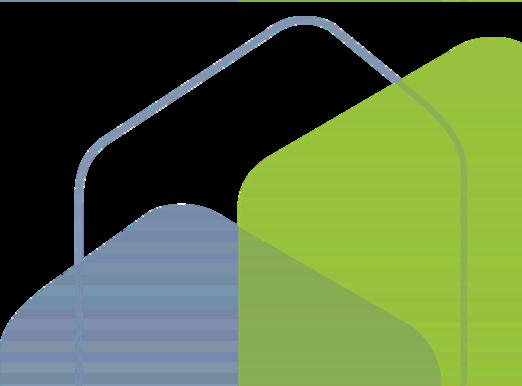

Our financial outcome is presented in the audited financial statements from page 65. A detailed budget is prepared in line with the strategic plan, and it is reviewed by the Audit, Assurance and Finance sub-committee and further reviewed and approved by the Board of management.
Actual results and outcomes are compared against the budget to ensure alignment with plan, tight budgetary control, and value for money. +32.5% +26.4% +14.3% EBITDA Income Operating Surplus (Earnings Before Interest Tax Depreciation and Amortisation)
2023 saw CHI achieve strong financial results following the delivery of 849 additional units in the year.


The total income for CHI in 2023 amounted to €63.77m. This was an increase of 26.4% on 2022. This was a very solid performance confirming strong growth ahead of expectations.
*A Glossary of Financial Terms are presented at the back of this Report
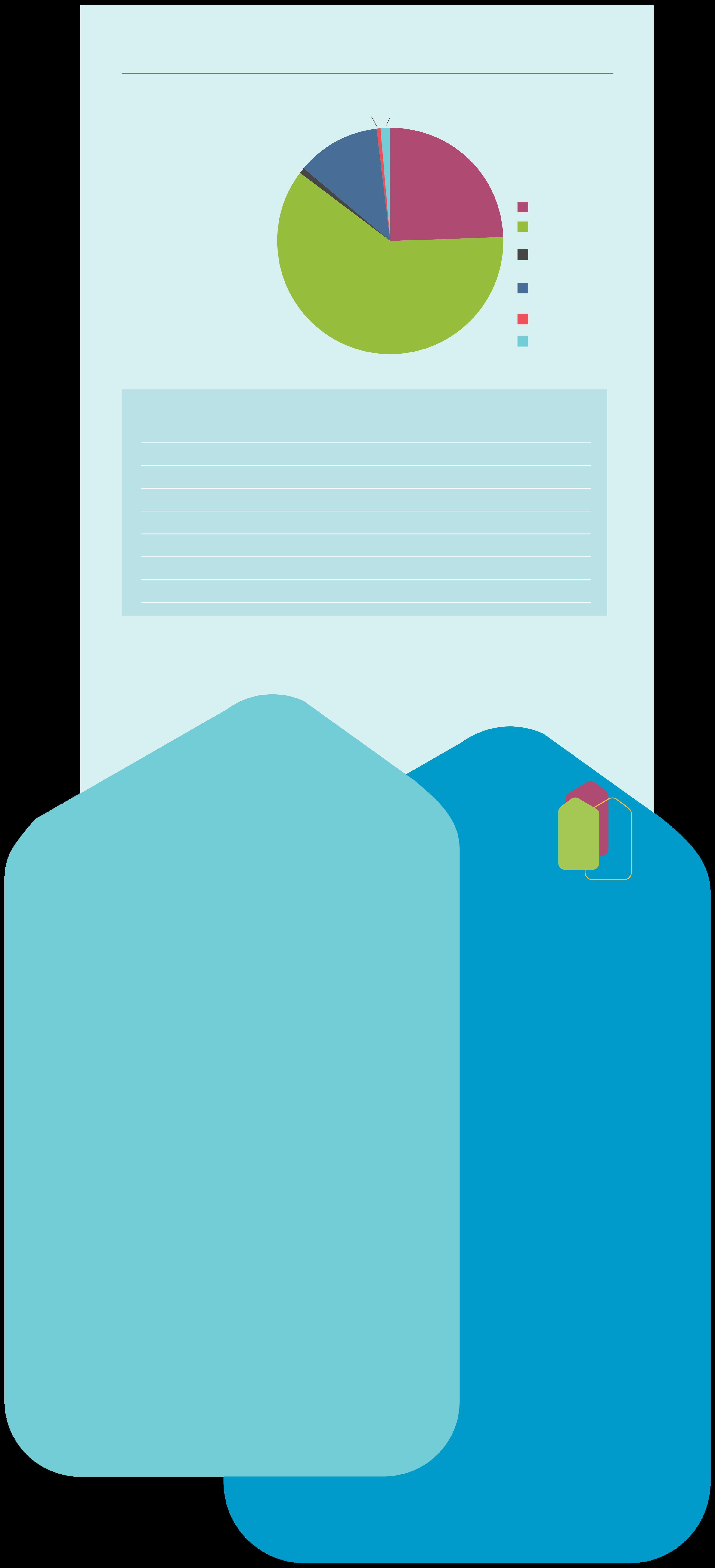
Income
€63.77m 2023 by Category
Rental Income
Payment Availability Agreements Income
Management & Maintenance income
Capital Subsidies Amortised
Revenue Based Grants
Other Income (0%)
Income
Rental Income & Service Charges
Payment & Availability Income
Management & Maintenance Income
Capitalised subsidies amortised
Revenue Based Grants
Other Income
Total Income
The main driver for the increase in income was the continued growth in social housing homes delivered by CHI CHI acquired 849 units in 2023 Total housing stock at the end of 2023 amounted to 5,187 units
The growth in units resulted in increased Payment and Availability Agreement income to €38 66 million and Rental Income and other charges to tenants to €15 74 million These income streams constituted 85 3% of CHI’s total income in resourcing the operational costs of CHI’s activities and debt financing
Expenditure
Expenditure on Housing and Community services for 2023 was €21 705m an increase in costs of 27% from 2022. These costs were in line with expectation.

€21.705
€21.812
Housing & Community Expenditure
Depreciation
Expenditure 2023 v 2022
2023 Expenditure as millions m m m m
€43.517

Expenditure 2022
€32.726
Expenditure 2023 excluding impairment

The operating surplus is shown as per the financial statements including depreciation and capital grants amortised
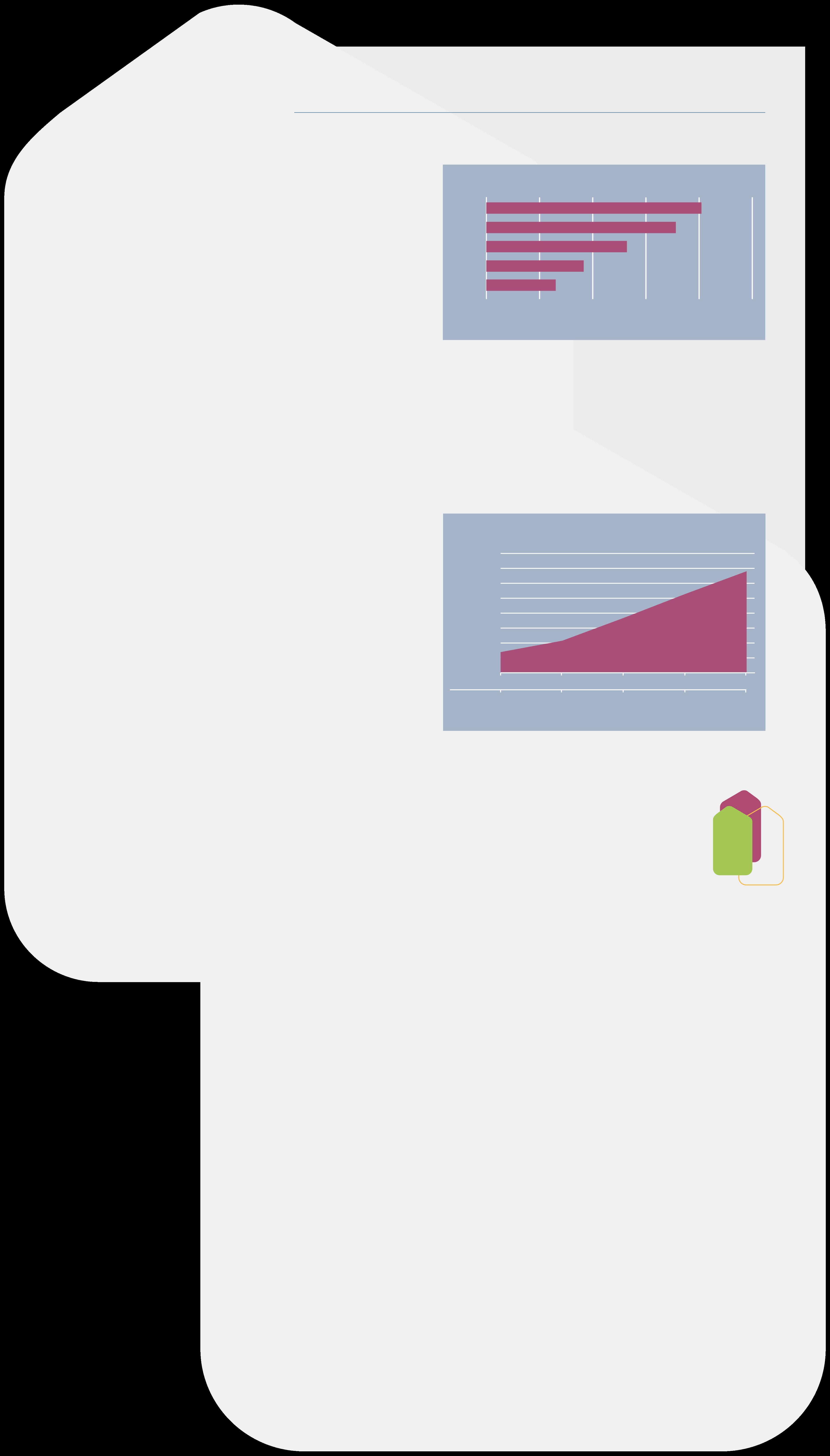
*Operating surplus before Impairment was €20.256m in 2023. A specific asset impairment charge has been included in the financial statements in relation to a current development site for €4 59m Operating surplus after Impairment was €15.66m in 2023.
(Earnings before interest, tax, depreciation and amortisation)
EBITDA in 2023 amounted to €34 5m, an increase of 32% on 2022 EBITDA is an effective indicator of the financial strength generated from CHI’s operations CHI has continued to grow its EBITDA line over a five-year period Five-year EBITDA trending 2019 – 2023 is
as:
EBITDA 2019 -2023
There are several financial indicators that the Board, Committees and Management use to monitor the financial performance of CHI.
Ratios/KPIs
EBITDA Margin
EBITDA Interest Cover
Debt Service Cover
Gearing Gearing excl CALF
The KPIs confirm the solid financials at the end of 2023.
• EBITDA Margin – Earnings (EBITDA) as % of
Total Income (Less Amortisation)
61% Indicates financial strength generated by CHI operations
• EBITDA Interest Cover – Earnings (EBITDA) as % of Interest payable
225% Indicates that Earnings are comfortably covering our Interest amounts payable on loans, well ahead of the threshold required by our lenders
• Debt Service Cover – Earnings (EBITDA) as a % of Interest and Capital Repayments.
117% Indicates that Earnings are covering our Interest and Capital amounts payable on loans well, well ahead of the threshold required by CHI lenders.
• Gearing
76% Gearing Ratio– Loans less cash as a % of Historic Cost of Properties
53% Gearing Ratio excluding CALF – Loans less cash excluding CALF Loans as a % of Historic Cost of properties
The Gearing ratio has increased due to the incremental debt drawn to fund property purchases during the year. CHI funds its investment in social housing through the Government supported framework of CALF and Payment and Availability funding. Bank and other finance sources are evaluated on an ongoing basis. The Board and Management is comfortable with increasing gearing because State backed income is being used to underpin the debt. With CALF excluded the ratios are lower. The current gearing ratio limit set by the Board is 80% as specified in the Treasury Management Policy.
CHI’s liquidity continues to be strong with cash and short-term debtors more than its current liabilities At the end of 2023, the liquidity ratio was 149% This confirmed additional head room of 49% over the amount of the short-term liabilities at year end Pursuant to the Treasury Management Policy, CHI is always required, to hold a minimum cash deposit of €2 million The CHI combined bank balances increased by €3 million to €28 2 million in the full year ended 2023
Current sources of funding to CHI are loans from the Housing Finance Agency (HFA), Bank of Ireland, Multaque CU AHB Fund and Department of Housing under Capital Advance Leasing Facility (CALF) This debt increased from €566.2m in 2022 to €865.5m at year end 2023.
CHI Debt Profile 31/12/2023
€865.5m Total Debt €249.8m €569.6m €44m Total Debt Funding Balances
CHI continues to evaluate alternate funding strategies which are economically positive, prudent and ensure financial resilience for the organisation in the long term Funding
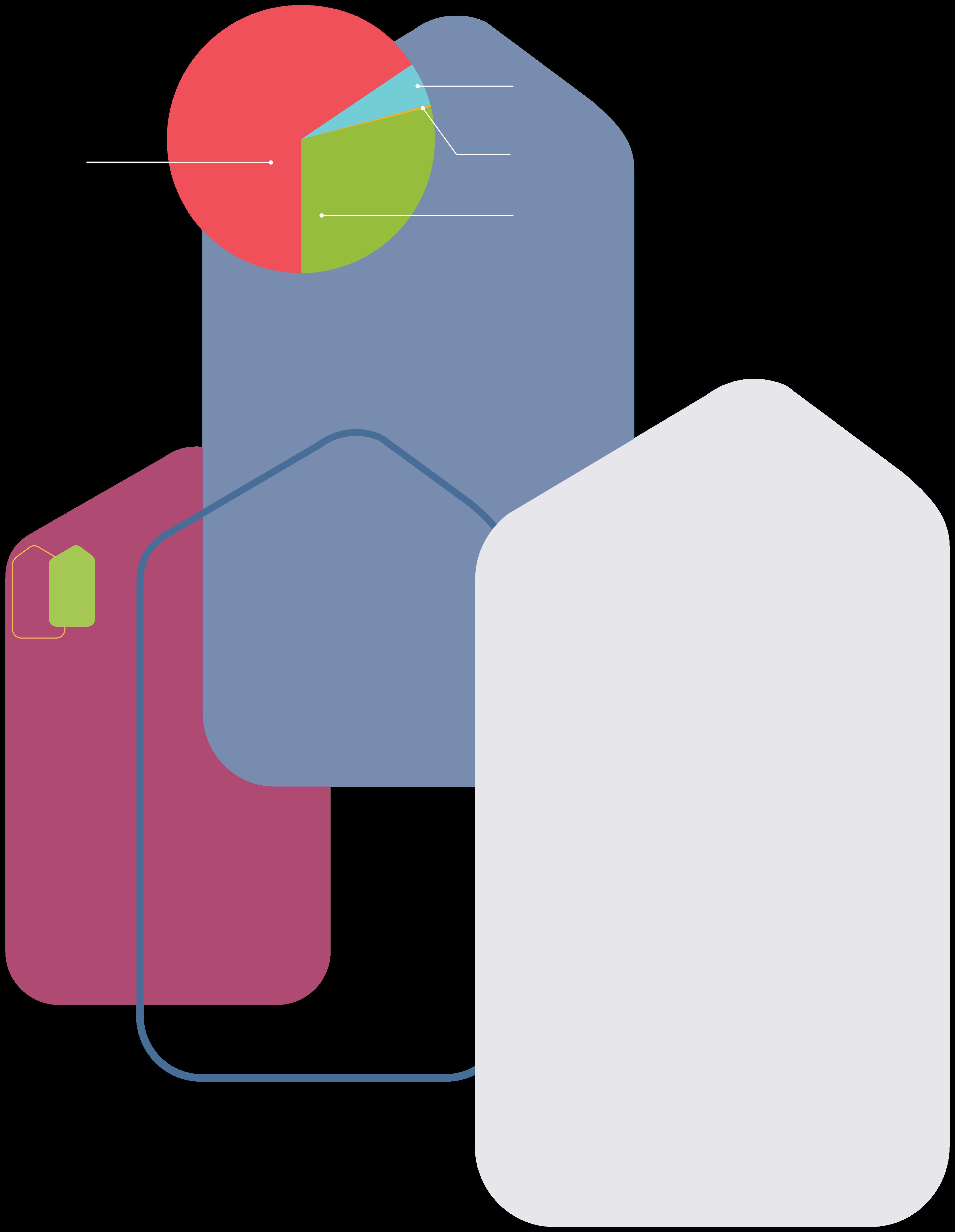
The HFA continues to be the key lending partner to CHI. CALF funding from Local Authorities is an important funding pillar to support bank debt and external non-state funding streams.
CHI adopts a risk averse approach to its residential housing borrowings by using fixed interest rates for the terms of the loans, secured on specific properties, and matched to the term of the State support Payment and Availability contracts.
The weighted average Loan Interest rate for the categories of outstanding debts were represented as:
Loan interest charged to the Income and Expenditure accounts amounted to €15 5 million in 2023 This represented an increase of 51% The increase in loan interest charged is directly related to the growth in loan drawdowns and rising interest rates during 2023
Housing Tangible Fixed Assets
Housing Tangible Fixed Assets at cost amounted to €1 1 billion at the end of 2023 The corresponding amount for 2022 was €786 million This represented an increase of €314 million The amount included the purchase costs of 849 social housing homes in 2023
Reserves Position
The CHI Reserves policy is reflected in the 2023 Financial Statements
Revenue Reserves
CHI’s policy is to retain a level of revenue reserves which reflect its needs at the current time and in the foreseeable future The reserves are sufficient to meeting, as a minimum, the running costs for a period of 12 months net of contractually committed State backed Payment and Availability income Annually the Board reviews the adequacy of the amount and period amending it, where necessary, to reflect changing needs
CHI’s policy is to retain a level of designated reserves in cash backed form The 2023 designated reserves are sufficient to meeting as a minimum the following year ’ s 2023 budgeted Stock Condition/Major Repairs Capex On an ongoing basis the Board aims to generate a surplus on operations which will allow for augmentation of the CHI designated reserves
Co-operative Housing Ireland is precluded by its rules from paying dividends either as part of normal operations or on a distribution of its assets in the event of a winding-up
The Board have taken all necessary steps to ensure that they have been made aware of all relevant audit information and confirm that so far as management are aware there is no relevant information of which the statutory auditors are unaware
CHI continues to seek avenues to develop new cooperative housing across tenures throughout the country CHI will actively expand the co-operative housing model across Ireland in response to housing needs Expansion will be in line with the Development Growth Plan adopted by the Board in September 2020
Based on the results for the year, the year-end financial position and the approved 2023 budget, the Board believes that CHI has adequate resources to continue in operational existence for the foreseeable future The Board believes that there are therefore no material uncertainties that call into doubt CHI’s ability to continue in operation Accordingly, CHI continues to adopt the “going concern ” basis in preparing the financial statements
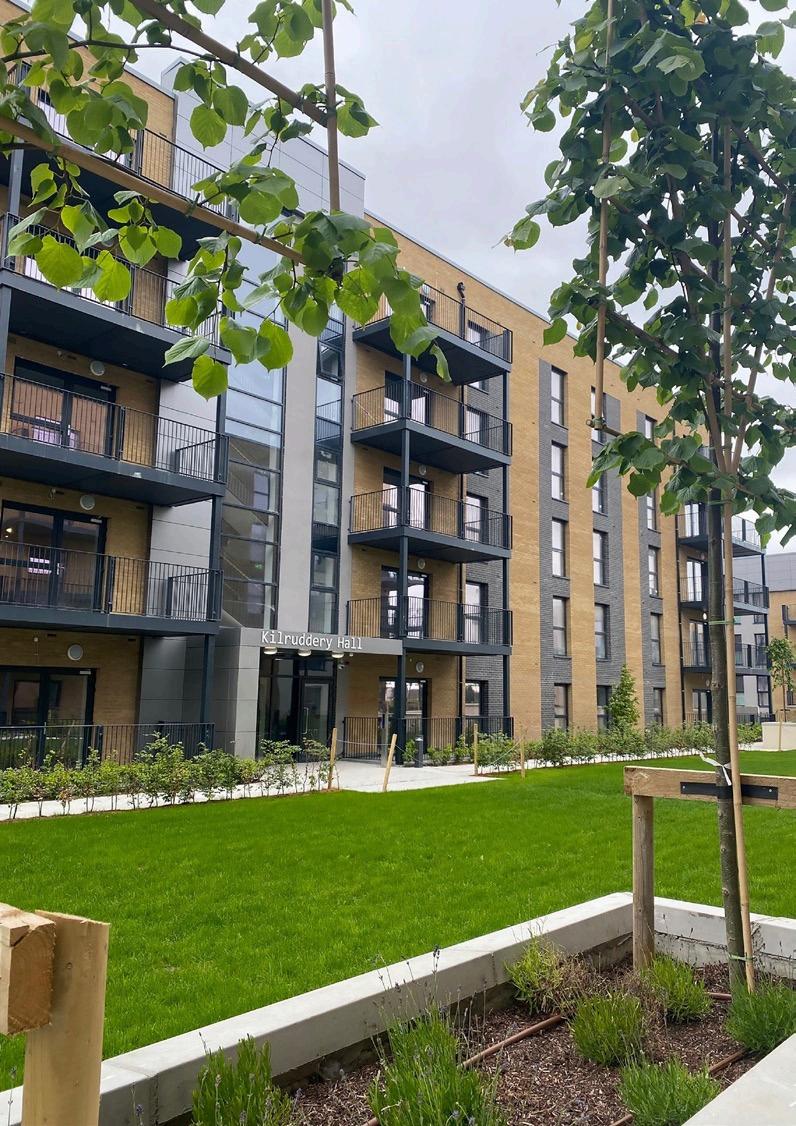
Throughout 2023, CHI remained committed to rigorous risk management practices to ensure the stability and effectiveness of our operations in a challenging and dynamic environment CHI operates in a regulatory environment which includes the Approved Housing Bodies Regulatory Authority (AHBRA), the Charities Regulator, and the Residential Tenancy Board (RTB); we are therefore focused on maintaining and enhancing our governance structures This proactive risk management approach has allowed us to maintain a strong compliance record, which is essential for sustaining public trust and securing ongoing support
CHI remained vigilant about operational risks, particularly those related to housing demand and service delivery Given the ongoing housing demand, CHI prioritised strategic planning to optimise the use of our resources so as to accelerate housing delivery where possible The organisation also maintained open lines of communication with stakeholders, including member tenants, government departments and agencies, and funders to address emerging risks promptly
Overall CHI’s comprehensive risk management efforts in 2023 have strengthened the organisation’s capacity to face future challenges By continually assessing and adapting to the risk landscape CHI is well-positioned to achieve our long-term objectives and continue making a meaningful impact on the lives of those who rely on our housing services
Managing risks and uncertainties is integral to our resilience and long-term success We adopt a proactive approach, regularly identifying and assessing potential risks across all areas of operation By implementing robust risk management frameworks, we ensure that risks are mitigated through strategic planning, continuous monitoring, and timely response mechanisms Our risk management strategy is dynamic, allowing us to adapt to evolving challenges and uncertainties We also foster a culture of risk awareness among our staff, empowering them to identify and address issues early This comprehensive approach enables us to navigate uncertainties while safeguarding our mission and objectives
In 2023 CHI identified and actively managed the top risks that could potentially impact operations and the delivery of the organisation’s strategic goals To ensure these risks were effectively monitored and addressed, CHI’s Risk Management function instituted monthly risk reviews with all risk owners This enabled us to remain agile and responsive in a rapidly changing environment


IT System Risk – Risk specifically relating to potential outages of the IT Business System (3rd party system)
Vulnerable Adults Risk - Failure to comply with legal, statutory or regulatory requirements in respect of vulnerable adults/children that may be at risk of abuse/ neglec t
The IT Business System is diligently managed with robust contingency plans in place to mitigate any risks of critical system failure, ensuring continuous service delivery
This risk has been newly identified as part of our ongoing commitment to safeguarding vulnerable adults and children. Recognising the evolving landscape of legal and regulatory requirements, we have proactively incorporated this into our risk management framework to ensure that our practices are continually aligned with the highest standards of care and protection By addressing this risk, we reinforce our dedication to maintaining a safe and supportive environment for all individuals.
New policies and procedures are currently being developed to address this risk in a comprehensive manner
Reputation and public trust remain paramount to CHI’s operations, especially given our stewardship of public funds
Reputational Risk - Adverse publicity due to perceived governance and compliance failures
We maintain a prudent approach in all our activities to ensure transparency, accountability, and the highest standards of service delivery
Robust recruitment (for co-optees), performance appraisal, and training procedures for board members were implemented.
Legislative & Regulatory Requirements - Failure to comply with legislative and regulatory requirements, e g , regulatory returns, tax reforms, accounting, employment, property, H&S, government investigations and/or audits.
IT Security Risk - The risk of an event or events occurring which result in a business’ information being lost, stolen, copied, or otherwise compromised
The Board of Management Report and Annual Audited Accounts are submitted to relevant stakeholders including the Approved Housing Bodies Regulatory Authority (AHBRA), CRO and Charities Regulator.
We maintain regulatory relationships through ongoing communication and strict adherence to deadlines.
Liquidity - Risk that CHI will encounter difficulties in meeting obligations arising from Financial Liabilities, including unplanned over-runs on construction projects
To mitigate IT security risks, including cyber risks, we employ a comprehensive strategy that includes implementing advanced firewalls, intrusion detection systems, and regular security audits Continuous monitoring and real-time threat detection allow us to respond swiftly to potential security breaches Additionally, we regularly update our systems with the latest security patches and conduct employee training programs to enhance awareness of cybersecurity best practices Our commitment to these proactive measures ensures the protection of our IT infrastructure and the integrity of the data we manage
Financial Oversight: Daily and weekly review of bank accounts Cashflow position forecasting; Matching of mortgages to funding
Governance Oversight: Audit, Assurance & Finance Committee review of project management reports that may identify budget overruns
Construction projects include contingency provisions Performance bonds included for large scale construction projects Legal Advisors are in place to engage with external parties where required Quarterly Treasury Report and a Treasury Management Policy are in place
The Board’s strategic focus is on turn-key acquisitions with a very limited number of direct built construction projects
During the fiscal year 2023, our Internal Audit function continued to play a critical role in assessing and improving the effectiveness of our risk management, control, and governance processes The internal audit team, RBK, successfully completed the final phase of their 4-year audit plan, which included comprehensive reviews of key operational areas These audits provided valuable insights and actionable recommendations, which were promptly implemented to strengthen CHI’s internal controls
In line with the organisation’s commitment to continuous improvement and best practices, a tender process was initiated for the appointment of a new internal audit function This process was rigorous, involving a thorough evaluation of potential service providers based on their expertise, industry experience, and ability to align with our strategic objectives The tender process concluded in December 2023, resulting in the appointment of Mazars, effective from January 2024 CHI is confident that this transition will bring fresh perspectives and enhanced audit capabilities further supporting our commitment to robust governance and sustainable growth
The measures taken by the board members to ensure compliance with the requirements of Sections 13 and 14 of the Industrial and Provident Societies Act 1893-2021 with regard to the keeping of accounting records are the employment of appropriately qualified accounting personnel and the maintenance of computerised accounting systems The Society’s accounting records are maintained at the Society’s registered office at 11/12 Warrington Place, Dublin 2
Lobbying and Political Contributions
The Society is registered with the Charities Regulatory Authority (No 20012182) and with the Regulator of Lobbying and submits regular returns
Post balance sheet event
Since 31st December 2023, CHI is engaged with a 3rd party charity Childcare provider regarding the transfer of the remaining CHI childcare operation at Island Key, Dublin
Co-operative Housing Ireland with continue to focus on managing its growth in terms of the number of new homes it provides while developing and improving services to its member tenants This will be in line with its Development and Growth Plan and guided by its Strategic Plan
To achieve this CHI, in 2024, will:
• Drive further improvements in the services we provide to member tenants including a revised tenancy management policy, embedding tenancy feedback, promoting safer neighbourhoods, enhancing community engagement, and support for local co-operatives
• Enhance the asset management and property services for member tenants and stewardship of its housing stock, continually meet regulatory compliance, and develop a new interim asset management strategy
• Focus on improvement of information systems and IT across the organisation including a plan to replace the current housing management software
There have been no significant events affecting the Society since the end of the financial year
The Society is precluded by its rules from paying dividends either as part of normal operations or on a distribution of its assets in the event of a winding up Statement of relevant audit information
The board member has taken all the steps that ought to have been taken as a board member in order to be aware of any relevant audit information and to establish that the Company’s auditor is aware of that information
The auditor, Grant Thornton, continues in office in accordance with section Sections 13 and 14 of the Industrial and Provident Societies Act 1893-2021
• Follow its Development Growth Plan in providing homes CHI will work to continue increasing the number of homes in a sustainable way
• Introduction of a whole organisation, best in class, customer service training programme for all staff and not just frontline employees
• Commitment to supporting our people by expanding the human resources team providing relevant training and professional development, and identifying a new office location for an expanding organisation
• While CHI and all Approved Housing Bodies rely heavily on the Housing Finance Agency for funding CHI remains committed to seeking funds from other Central Bank approved lenders
• Further role out of CHI’s business transformation programme
• Continue to advocate for positive change, to support the organisation in achieving its goals
• Continue to examine other forms of housing developments, including, co-operative housing, community land trusts, cost rental, and low/zero carbon
2023 was a celebration for CHI as it marked its 50th anniversary However, the challenge of accessing housing and housing affordability for people that existed in the 1970s has persisted and, in many ways, exacerbated
The inflationary impact on building materials labour and other costs, while now stabilised, has had a considerable impact on project viability and debt levels for all, including social housing providers Revisions to the state’s core funding scheme to AHBs have gone someway in addressing this viability gap, however, the issue of sectoral debt levels needs addressing
It is now clear that targets for the building of new homes set in Housing for All, the Government’s housing strategy to 2030 fall short of need Census data highlighted the extent of pent-up demand for housing and over 50,000 households on the social housing waiting list While the Housing Commission Report was expected to be published in 2023, this was delayed until May 2024 The report provides a blueprint for a revised national strategy and recommended delivery targets
Revised targets (estimated at between 50,000 and 60,000 homes) will stretch the ability of key stakeholders including the state and state bodies, the construction sector, and AHBs to deliver While CHI has exceeded its housing delivery targets for 2023 it has a future ambition to deliver 1,000 new homes annually To achieve this output from the construction sector and housing delivery needs to increase dramatically as well as the multi-annual funding commitment of Housing for All
Reputationally the social housing and homelessness sector has been negatively impacted over the past 18 months with revelations of poor governance practices in a small number of organisations The sector is highly regulated including the Approved Housing Bodies Regulatory Authority (AHABRA) the Charities Regulator and the Residential Tenancy Board CHI will continue to engage positively and proactively with regulatory bodies
Highly anticipated co-operative legislation has been further delayed This legislation’s potential is significant in terms of the positive impact that co-operatives, including housing co-operatives, can play in meeting our citizens’ needs and aspirations
To overcome many of these challenges CHI engages in a collaborative and meaningful way with key stakeholders It attends various bilateral meetings with Ministers through its membership of the Community and Voluntary pillar, it maintains an open dialogue with government departments, in particular the Department of Housing, and it is a member of Housing Europe and the International Co-operative Alliance Through the support of the Department of Housing and various Dublin Local Authorities, the Irish Council for Social Housing, with CHI, will host the 2025 International Social Housing Festival

• Pearse O’Shiel (Chairperson)
• Enda Egan (Vice Chair-person)
• Frances Kawala
• Derek Maher
• Cinnamon Blackmore
• Regina Coakley
Name
Co-operative Housing Ireland
Society Limited
Registered Office
11/12 Warrington Place, Dublin 2
D02 E221
Registration Numbers
Certificate number 3174R
Registered Charity Number 20012182
Charity number
CHY6522
Tax Reference Number 4547534B
Secretary
Pat Moyne
• Nuala Savage
• Marianne Ward O’Leary Maughan
• Michael Heaney
• Eugene McLoughlin
• Gerard McDonagh
• Ken Burke
Auditor
Grant Thornton
Chartered Accountants & Statutory Audit Firm
13-18 City Quay
Dublin 2
RBK
Park View House
Beech Hill Office Campus
Clonskeagh
Dublin 4
(Internal Auditor)
Solicitors
Gleeson McGrath Baldwin 29 Anglesea Street
Dublin 2
Beauchamps, Riverside 2, Sir John Rogerson’s Quay, Grand Canal Dock, Dublin 2, D02 KV60
Internal Auditor
RBK
Park View House
Beech Hill Office Campus
Clonskeagh
Dublin 4
Bankers
Bank of Ireland
St Stephen’s Green
Dublin 2
Allied Irish Bank
Lower Baggot Street
Dublin 2
Housing Finance Agency
46 St Stephen’s Green
Dublin 2

Chief Executive Officer
Kieron Brennan has been CEO of Co-operative Housing Ireland since 2014. He has extensive experience in the community, voluntary and co-operative sector, which saw him lead the Irish League of Credit Unions from 2008 – 2014. Prior to this, he held a leadership position as a Programme Manager with POBAL, a not-for-profit community development and financing company, which manages programmes on behalf of the Irish Government and the EU. He was also Irish Manager of Triodos Bank (one of Europe’s largest ethical banks), Executive Director of Clann Credo (social development fund) and Chief Executive of Partas

Director of Finance
Mark Bolger joined Co-operative Housing Ireland as Director of Finance in February 2019. A qualified Chartered Accountant with a MSc in Real Estate he has held senior leadership positions including Director of Finance & Company Secretary of Horse Sport Ireland (the governing body for the equestrian sector in Ireland), Director General of the Irish Horse Board Co-operative Society, Financial Controller of the Racecourse & Property Division of Horse Racing Ireland (Commercial Semi-State) He has a wide range of experience of having also worked as Financial Controller in the private sector with the Industrial Print Group Mark trained with Deloitte

Director of Policy and Communications
Eoin Carroll’s expertise is in the areas of housing policy, communications, and organisational development. With senior management experience, including as Executive Director, he previously led the Policy and Public Affairs function in Extern, an all-island charity supporting 25,000 vulnerable children, individuals and families each year Eoin has also worked in services for people experiencing homelessness He is currently on the Board of a not-for-profit that supports organisations to create high quality, evidenced based services and is a former chairperson of the Irish Social Policy Association. Eoin holds a MSc. Social Policy (LSE), MBS Business (UCC), BA Sociology & Social Policy (TCD), Dip Corporate Governance, and Dip. Community Development.
Padraic Clancy

Director of New Business & Development
Padraic Clancy is Director of New Business, leading the Co-operative Housing Ireland Development Team Padraic has over 25 years in Property Acquisition and Development and holding a Honours Degree in Surveying and a National Diploma in Estate Management Padraic has managed properties on behalf of NAMA, all major Banks and receivers and is a specialist in property management, security and maintenance Padraic was previously Head of VPSitex in Ireland, managing the security and maintenance works on large mixed Property Portfolios for PWC, Mazars, Grant Thornton and Duff and Phelps.

Director of Housing Services & Community Engagement
Dave has worked in social housing for more than 24 years Before coming to CHI he spent his career to date in England, working for several different housing providers He has operated in senior management positions since 2010 and at director level from 2017 – 2022 in Onward Homes, a housing association owning and managing 35,000 homes in the northwest of England. Dave has a background in transformational change while delivering high levels of performance He has a passion for quality, customer service and maximising social benefit

Director of Asset Management & Property Services
David McCourt joined Co-operative Housing Ireland as Director of Asset Management & Property Services in June 2021. A Chartered Engineer with an Honours Degree in Civil Engineering, David has held senior leadership positions including Head of Technical Services at Centre Parcs Ireland where he was a senior member of the project implementation team, and as Chief of Infrastructure with the International Peacekeeping Mission in Kosovo He has a wide range of experience having served over 20 years in the Irish Defence Forces serving in the Corps of Engineers, overseas with both the United Nations and NATO and on secondment to Irish Aid & DFAT

Director of Corporate Services
With more than 30 years’ experience of IT and Management Consultancy Pat is leading the Change Programme to restructure the business to prepare for the growth strategy of the business and the new regulatory environment that is now in place Pat studied Computer Science at Trinity College Dublin and has worked with a number of large IT and Management Consulting firms as well as working in the Banking industry and, more recently, with a large property services firm Pat was the Operations Director of BearingPoint and the Head of Operations and Service Delivery for Savills Ireland Pat is a Member of the Irish Computer Society
the financial year ended 31 December 2023
The board members are responsible for preparing the Board members’ Report and the financial statements in accordance with Irish law and regulations.
Irish Society law requires the board members to prepare the financial statements for each financial year Under the law, the board members have elected to prepare the financial statements in accordance with the Sections 13 and 14 of the Industrial and Provident Societies Act 18932021 and Financial Reporting Standard 102 ‘The Financial Reporting Standard applicable in the UK and Republic of Ireland’
Under Society law, the board members must not approve the financial statements unless they are satisfied that they give a true and fair view of the assets liabilities and financial position of the Society as at the financial year end date, of the profit or loss for that financial year and otherwise comply with the Sections 13 and 14 of the Industrial and Provident Societies Act 1893-2021
In preparing these financial statements, the board members are required to:
• select suitable accounting policies for the Society’s financial statements and then apply them consistently;
• make judgements and accounting estimates that are reasonable and prudent;
On behalf of the board
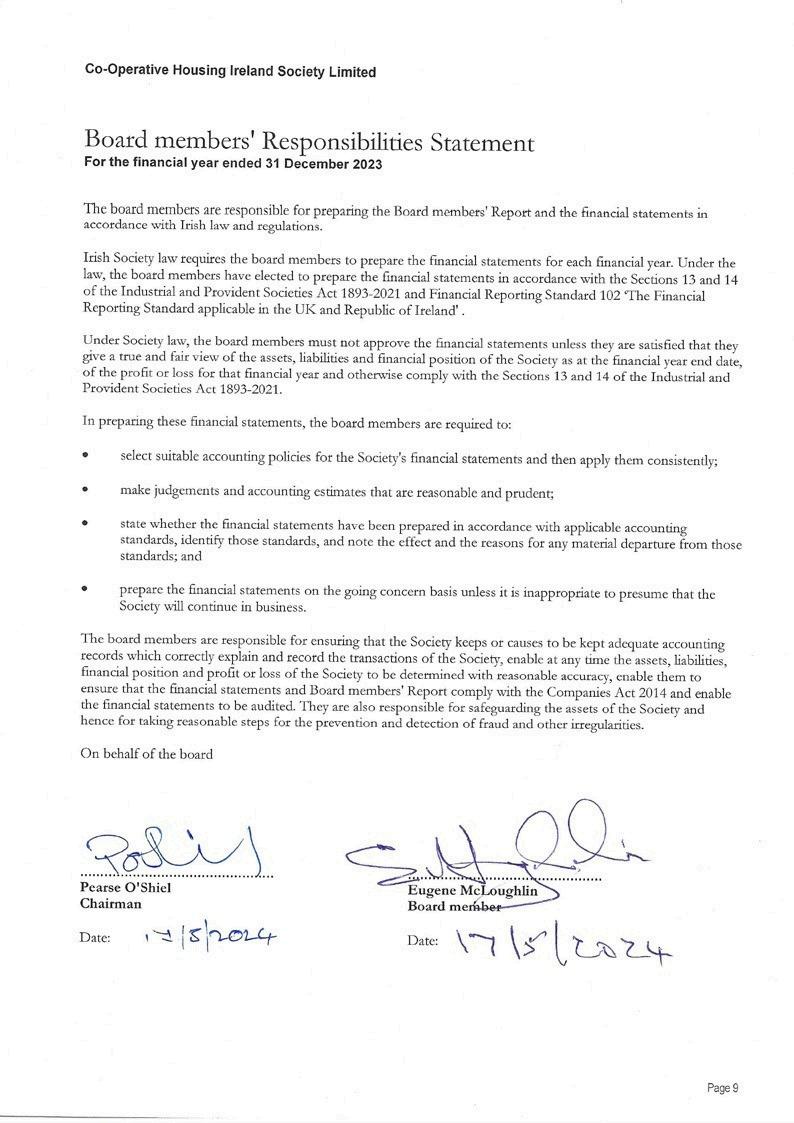
• state whether the financial statements have been prepared in accordance with applicable accounting standards, identify those standards, and note the effect and the reasons for any material departure from those standards; and
• prepare the financial statements on the going concern basis unless it is inappropriate to presume that the Society will continue in business
The board members are responsible for ensuring that the Society keeps or causes to be kept adequate accounting records which correctly explain and record the transactions of the Society, enable at any time the assets, liabilities, financial position and profit or loss of the Society to be determined with reasonable accuracy, enable them to ensure that the financial statements and Board members’ Report comply with the Companies Act 2014 and enable the financial statements to be audited They are also responsible for safeguarding the assets of the Society and hence for taking reasonable steps for the prevention and detection of fraud and other irregularities
We have audited the financial statements of Co-Operative Housing Ireland Society Limited “the Society”, which comprise the Statement of comprehensive income, the Balance sheet, the Statement of changes in equity and the Statement of cash flows for the financial year ended 31 December 2023, and the related notes to the financial statements, including the summary of significant accounting policies
The financial reporting framework that has been applied in the preparation of the financial statements is Irish law and FRS 102 “The Financial Reporting Standard applicable in the UK and Republic of Ireland” (Generally Accepted Accounting Practice in Ireland)
In our opinion, Co-Operative Housing Ireland Society Limited’s financial statements:
• give a true and fair view in accordance with Generally Accepted Accounting Practice in Ireland of the assets liabilities and financial position of the society as at 31 December 2023 and of its financial performance and cash flows for the financial year then ended; and
• have been properly prepared in accordance with the requirements of the Industrial and Provident Societies Act 1893 to 2021
We conducted our audit in accordance with International Standards on Auditing (Ireland) (‘ISAs (Ireland)) and applicable law Our responsibilities under those standards are further described in the ‘Responsibilities of the auditor for the audit of the financial statements’ section of our report We are independent of the society in accordance with the ethical requirements that are relevant to our audit of the financial statements in Ireland including the Ethical Standard for Auditors (Ireland) issued by the Irish Auditing and Accounting Supervisory Authority (IAASA), and the ethical pronouncements established by Chartered Accountants Ireland, applied as determined to be appropriate in the circumstances for the entity We have fulfilled our other ethical responsibilities in accordance with
these requirements We believe that the audit evidence we have obtained is sufficient and appropriate to provide a basis for our opinion
In auditing the financial statements, we have concluded that the Board of Management’s use of going concern basis of accounting in the preparation of the financial statements is appropriate
Based on the work we have performed, we have not identified any material uncertainties relating to events or conditions that, individually or collectively, may cast significant doubt on the society s ability to continue as a going concern for a period of at least twelve months from the date when the financial statements are authorised for issue
Our responsibilities and the responsibilities of the Board of Management’s with respect to going concern are described in the relevant sections of this report
The Board of Management is responsible for the other information Our opinion on the financial statements does not cover the other information and except to the extent otherwise explicitly stated in our report we do not express any form of assurance conclusion thereon
In connection with our audit of the financial statements, our responsibility is to read the other information and, in doing so, consider whether the other information is materially inconsistent with the financial statements or our knowledge obtained in the audit, or otherwise appears to be materially misstated If we identify such material inconsistencies in the financial statements, we are required to determine whether there is a material misstatement in the financial statements or a material misstatement of the other information If, based on the work we have performed, we conclude that there is a material misstatement of this other information, we are required to report that fact
We have nothing to report in this regard
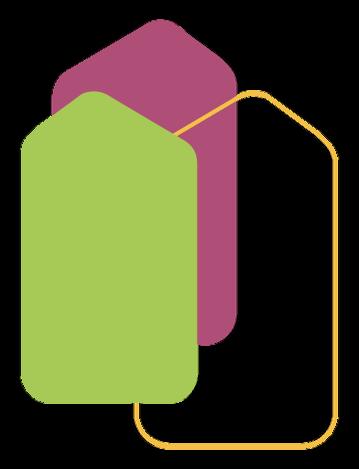
As required by Section 13(2) of the Industrial and Provident Societies Act 1893 we examined the balance sheets showing the receipts and expenditure, funds and effects of the Society, and verified the same with the books, deeds, documents accounts and vouchers relating thereto and found them to be correct duly vouched and in accordance with law
As explained more fully in the board members’ responsibilities statement, management is responsible for the preparation of the financial statements which give a true and fair view in accordance with Generally Accepted Accounting Practice in Ireland, including FRS102, and for such internal control as they determine necessary to enable the preparation of financial statements that are free from material misstatement, whether due to fraud or error
In preparing the financial statements management is responsible for assessing the Society’s ability to continue as a going concern, disclosing, as applicable, matters related to going concern and using the going concern basis of accounting unless the management either intends to liquidate the Society or to cease operations or has no realistic alternative but to do so
Those charged with governance are responsible for overseeing the Society’s financial reporting process
The auditor’s objectives are to obtain reasonable assurance about whether the financial statements as a whole are free from material misstatement, whether due to fraud or error, and to issue an auditor’s report that includes their opinion Reasonable assurance is a high level of assurance, but is not a guarantee that an audit conducted in accordance with ISAs (Ireland) will always detect a material misstatement when it exists Misstatements can arise from fraud or error and are considered material if, individually
or in the aggregate, they could reasonably be expected to influence the economic decisions of users taken on the basis of these financial statements
As part of an audit in accordance with ISAs (Ireland), the auditor will exercise professional judgment and maintain professional scepticism throughout the audit The auditor will also:
• Identify and assess the risks of material misstatement of the financial statements whether due to fraud or error design and perform audit procedures responsive to those risks and obtain audit evidence that is sufficient and appropriate to provide a basis for their opinion The risk of not detecting a material misstatement resulting from fraud is higher than for one resulting from error, as fraud may involve collusion, forgery, intentional omissions, misrepresentations, or the override of internal control
• Obtain an understanding of internal control relevant to the audit in order to design audit procedures that are appropriate in the circumstances but not for the purpose of expressing an opinion on the effectiveness of the society’s internal control
• Evaluate the appropriateness of accounting policies used and the reasonableness of accounting estimates and related disclosures made by Board of Management
• Conclude on the appropriateness of Board of Management use of the going concern basis of accounting and, based on the audit evidence obtained, whether a material uncertainty exists related to events or conditions that may cast significant doubt on the society’s ability to continue as a going concern If they conclude that a material uncertainty exists, they are required to draw attention in the auditor s report to the related disclosures in the financial statements or, if such disclosures are inadequate, to modify their opinion Their conclusions are based on the audit evidence obtained up to the date of the auditor’s report However, future events or conditions may cause the society to cease to continue as a going concern
• Evaluate the overall presentation, structure and content of the financial statements, including the disclosures, and whether the financial statements represent the underlying transactions and events in a manner that achieves a true and fair view

The auditor communicates with those charged with governance regarding among other matters the planned scope and timing of the audit and significant audit findings including any significant deficiencies in internal control that may be identified during the audit
The
purpose of our audit work and to whom we owe our responsibilities
This report is made solely to the society’s members as a body, in accordance with sections 13 and 14 of the Industrial and Provident Societies Acts 1893 - 2021 Our audit work has been undertaken so that we might state to the society’s members those matters we are required to state to them in an auditor’s report and for no other purpose To the fullest extent permitted by law, we do not accept or assume responsibility to anyone other than the society and the society’s members as a body, for our audit work, for this report, or for the opinions we have formed
Michael Nolan
for and on behalf of Grant Thornton
Chartered Accountants
Statutory Audit Firm
Cork
Date:
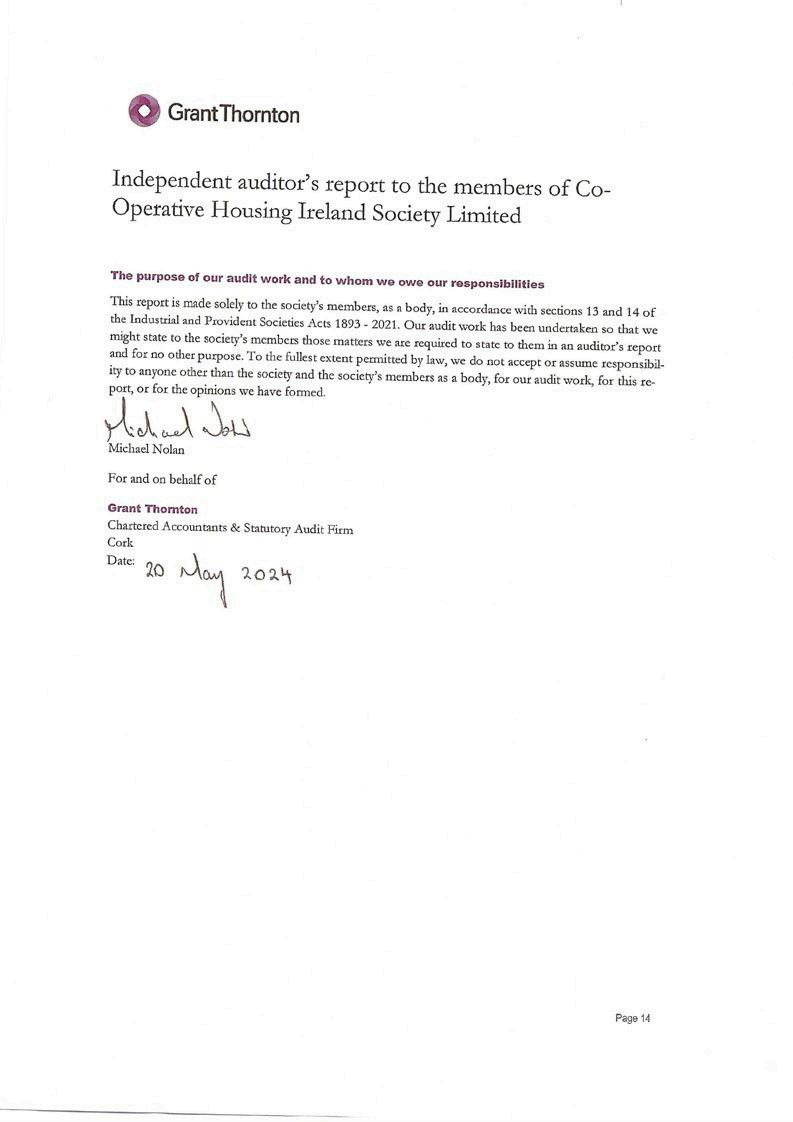

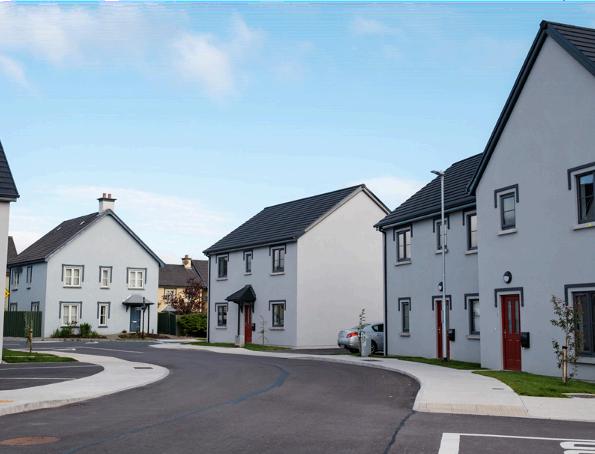
For the financial year ended 31 December 2023
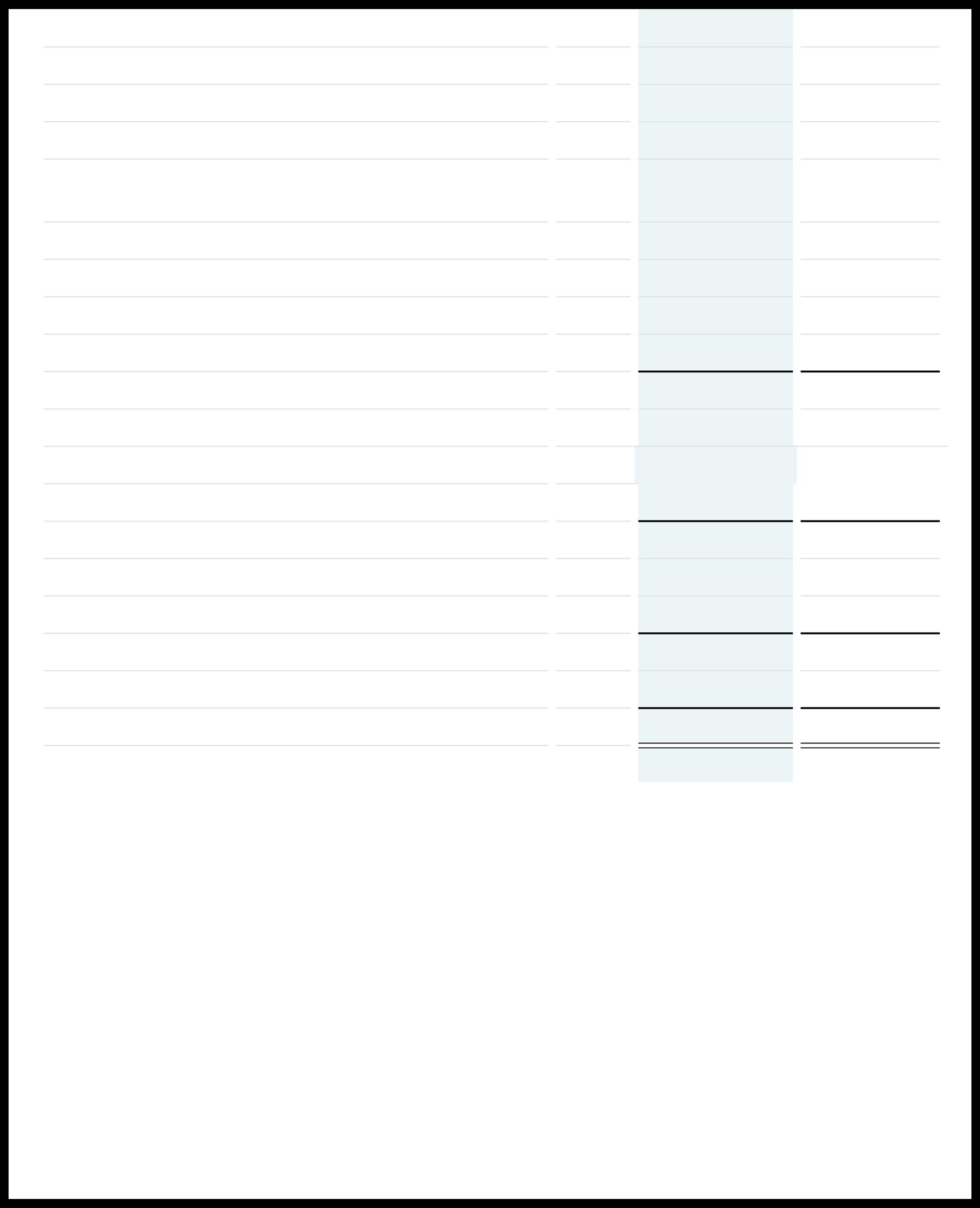
Impairment of freehold property - charge
Operating surplus Interest receivable
Interest payable and similar charges
Surplus before taxation Tax on Surplus
Surplus for the financial year
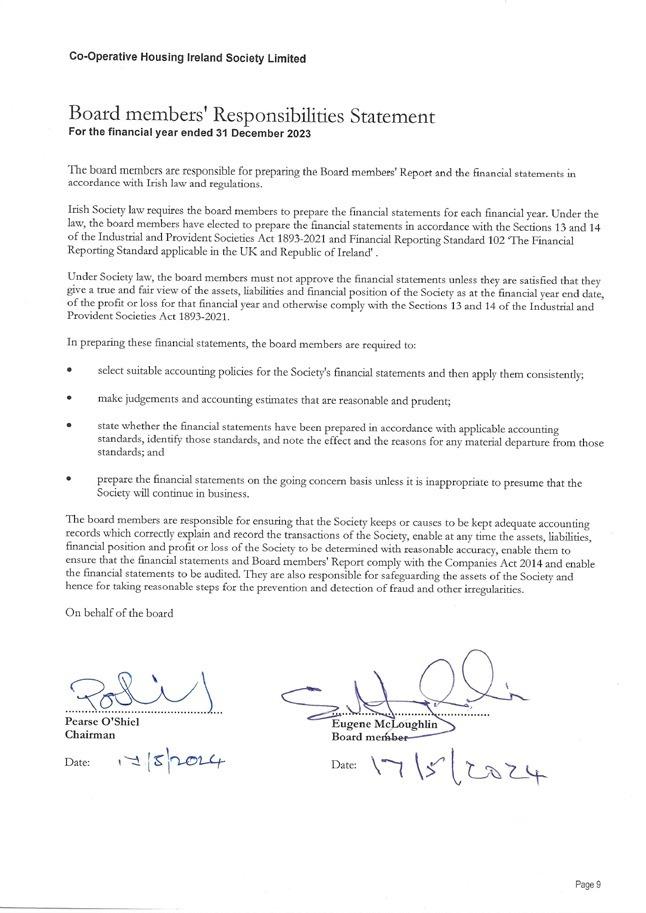
There were no recognised gains and losses for 2023 or 2022 other than those included in the statement of comprehensive income
There was no other comprehensive income for 2023 (2022:€NIL) 17,729,596 2022 € 27,914,238 13 377 695 7,335,442 677,592 1,150,502 50,455,469 (17,064,529) (15 661 344) (10 249 995) 7,479,6017,479,601
sheet as at 31 December 2023
Current assets 7,587,205 28,159,529 35,746,734 (22 ,191,675) 2023 € 375 5,865,022 56,607,971 62 ,473, 368 983,984,676 852 ,97 1 2,579 984,840,226 13,555,059 998, 395, 285 (935,921,917) 62 ,473, 368 Representing, Promoting, Developing Since 1973
Freehold property
Other tangible assets
Investments
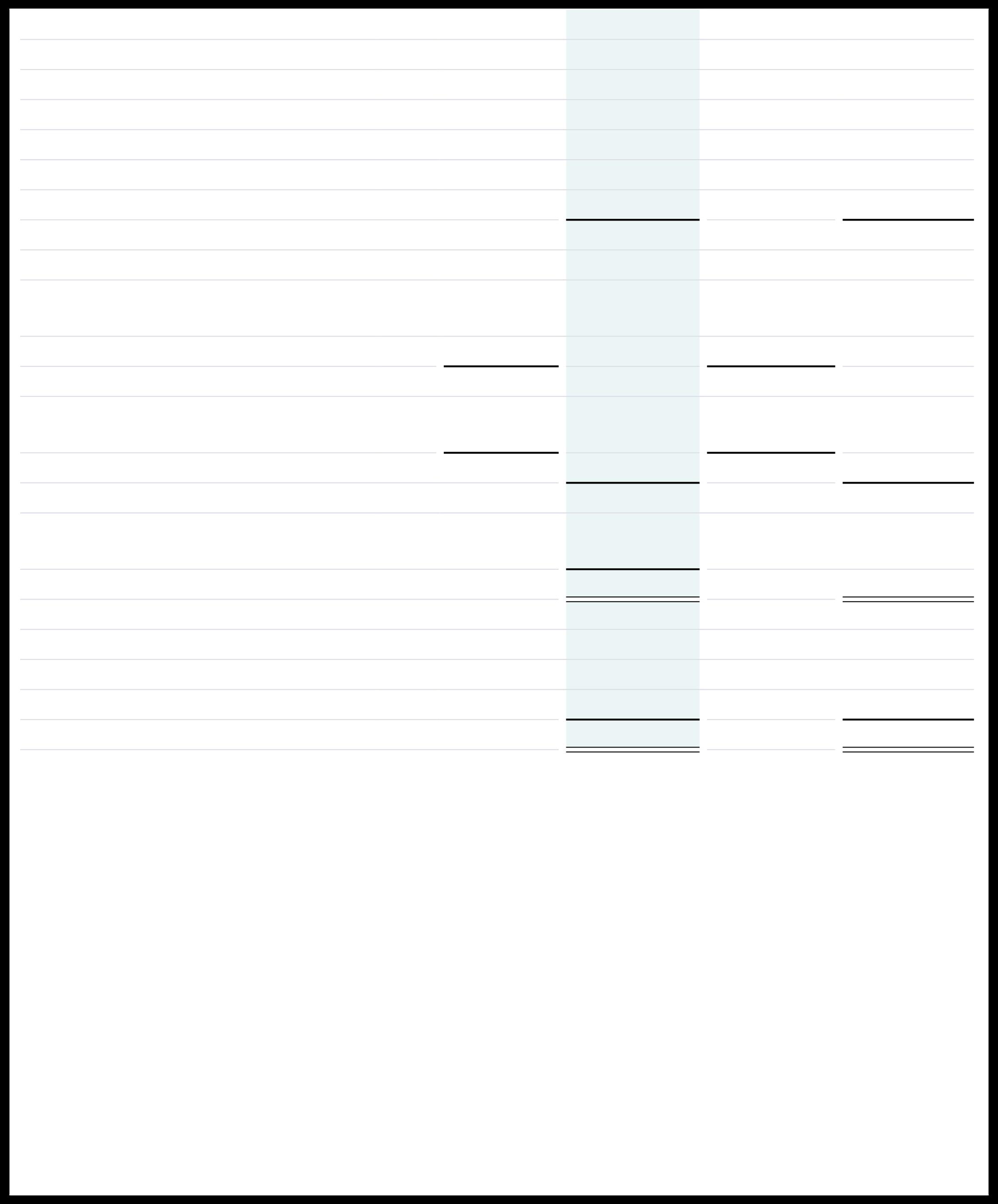
Debtors: amounts falling due within one year
Cash at bank and in hand
Creditors: amounts falling due within one year
Net current assets
Total assets less current liabilities
Creditors: amounts falling due after more than one year
Net assets
Capital and reserves
Called up share capital presented as equity
Designated reserve
Profit and loss account
Shareholders’ funds

The financial statements were approved and authorised for issue by the board: 1,603,991 24,916,372 26 520 363 (15,420,085) 692,487,319 893, 546 2 579 693,383,444 2022 € 375 5,534,600 56,644,448 62,179,423 11,100,278 704,483,722 (642,304,299) 62,179,423 Fixed assets
For the financial year ended 31 December 2023

The notes on pages 71 to 84 form part of these financial statements
For the financial year ended 31 December 2022
62,179,423 At 1 January 2022 At 1 January 2023
At 31 December 2022 At 31 December 2023 Other comprehensive income Surplus

The notes on pages 71 to 84 form part of these financial statements
Representing, Promoting, Developing Since 1973
For the financial year ended 31 December 2023
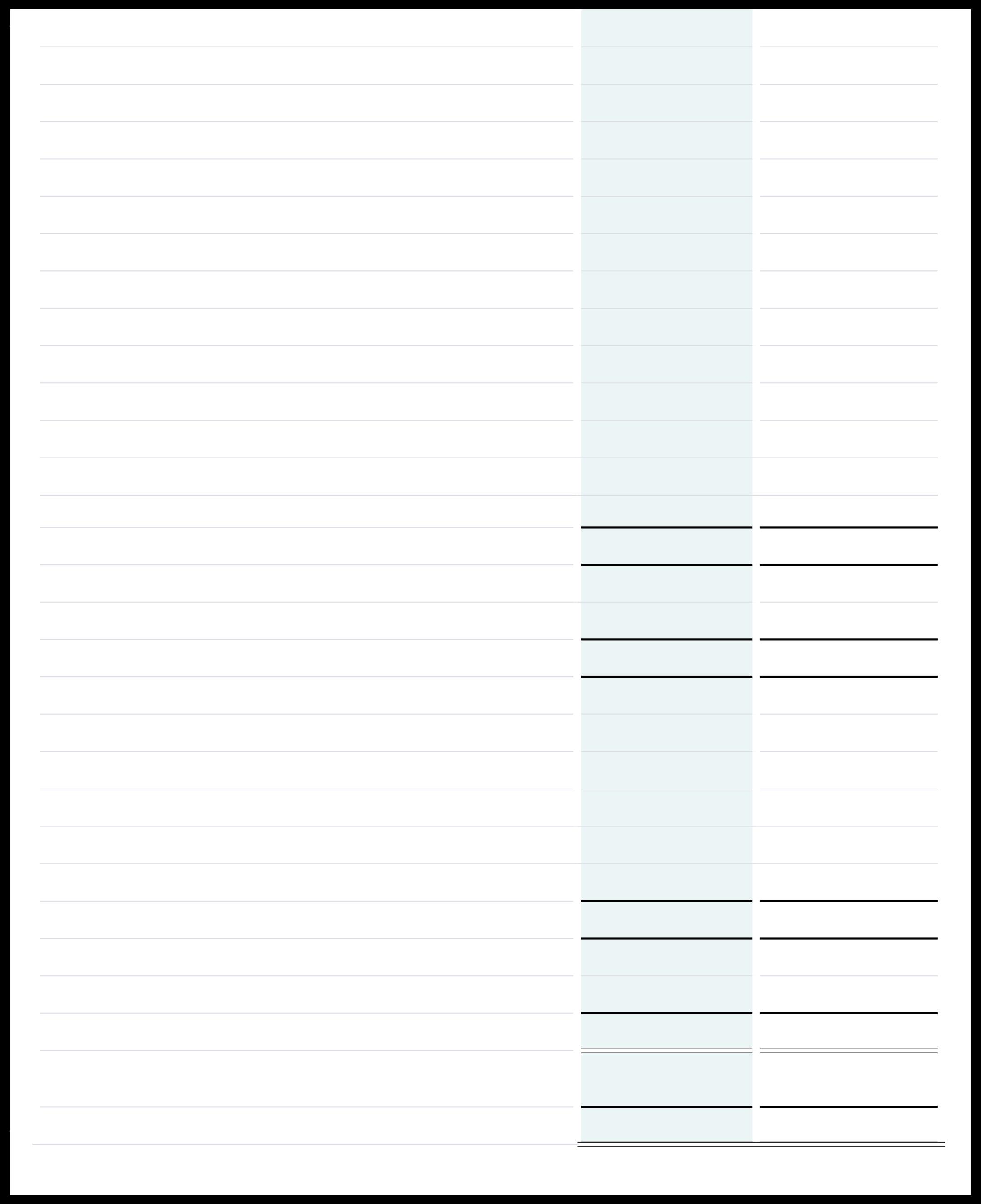
Cash at Bank and in hand (figures for 2023 and 2022) 28,159,529 293,945 2023 € (315,743,821) (315,743,821) (7,551,668) 21,812 , 212 4,593,702 15,498, 588 (11,790,864) (4,358,400) 1,206,634 (692,143) 19,012,006 309,725,349 (14,159,609) 3,609,169 800,063299,974,972 3,243,157 24,916,372 28,159,529 € The notes on pages 71 to 84 form part of these financial statements 24,916,372 2022 7,479,601 154,459,030 (10,037,004) 1,497,075 499 900 595,900 147,014,901 7,010,342 17,906,030 24,916,372 (158,792,038) (158 792 038) (7,335,442) 15,661, 3 4410 249 995 (7,660,282) 147,248 245,01518,787,479
Cash flows from operating activities
Surplus for the financial year
Adjustments for:
Amortisation of intangible assets
Depreciation of tangible assets
Impairments of fixed assets
Interest payable and similar charges
Interest paid
(Increase)/decrease in debtors
Increase in creditors
Transfer of assets from Munster Co-op
Net cash generated from operating activities
Cash flows from investing activities
Capital expenditure
Net cash from investing activities
Cash flows from financing activities
Loans drawn down
Repayment of loans
SHCEP Grants received
IIP funds received
Fixed rate loan realised gain
Net cash used in financing activities
Net increase in cash and cash equivalents
Cash and cash equivalents at beginning of financial year
Cash and cash equivalents at the end of financial year
For the financial year ended 31 December 2023 At 1 January 2023
Cash at bank and in hand
Debt due within 1 year
Debt due after 1 year
24,916,372 (13,035,876) (553,177,897) ( 541, 297,401) Cash Flows € 3,243,157 (5,657,170) (293,616,290) (296,030,303) At 31 December 2023 € 28,159,529 (18,693,046) (846,794,187) (837,327,704)
The notes on pages 71 to 84 form part of these financial statements
Representing, Promoting, Developing Since 1973
For the Financial Year ended 31 December 2023
1 - General information
Co operative Housing Ireland Society Limited (“the Society”) is a Society limited by shares and incorporated and domiciled in Ireland The Society is incorporated under the Industrial and Provident Societies Acts 1893 2021
2 - Accounting policies
2.1 Basis of preparation of financial statements
The financial statements have been prepared in accordance with Financial Reporting Standard 102 the Financial Reporting Standard applicable in the UK and the Republic of Ireland and Irish statute comprising of the sections 13 and 14 of the Industrial and Provident Societies Acts 1893-2021
The preparation of financial statements in compliance with FRS 102 requires the use of certain critical accounting estimates It also requires management to exercise judgement in applying the Society’s accounting policies (see note 3)
The following principal accounting policies have been applied:
2.2 Revenue
Revenue is recognised to the extent that it is probable that the economic benefits will flow to the Society and the revenue can be reliably measured Revenue is measured as the fair value of the consideration received or receivable, excluding discounts, rebates, value added tax and other sales taxes The following criteria must also be met before revenue is recognised:
Revenue from a contract to provide services is recognised in the period in which the services are provided in accordance with the stage of completion of the contract when all of the following conditions are satisfied:
• the amount of revenue can be measured reliably;
• it is probable that the Society will receive the
consideration due under the contract;
• the stage of completion of the contract at the end of the reporting period can be measured reliably; and
• the costs incurred and the costs to complete the contract can be measured reliably
Government grants are included within accruals and deferred income in the balance sheet and credited to the profit and loss account over the expected useful lives of the assets to which they relate or in periods in which the related costs are incurred
Interest income is recognised in profit or loss using the effective interest method
Finance costs are charged to profit or loss over the term of the debt using the effective interest method so that the amount charged is at a constant rate on the carrying amount Issue costs are initially recognised as a reduction in the proceeds of the associated capital instrument
2.6
All borrowing costs are recognised in profit or loss in the financial year in which they are incurred
2.7
The Society operates a defined contribution plan for its employees A defined contribution plan is a pension plan under which the Society pays fixed contributions into a separate entity Once the contributions have been paid the Society has no further payment obligations
The contributions are recognised as an expense in profit or loss when they fall due Amounts not paid are shown in accruals as a liability in the Balance Sheet The assets of the plan are held separately from the Society in independently administered funds
Tangible fixed assets under the cost model are stated at historical cost less accumulated depreciation and any accumulated impairment losses Historical cost includes expenditure that is directly attributable to bringing the asset to the location and condition necessary for it to be capable of operating in the manner intended by management
Depreciation is charged so as to allocate the cost of assets less their residual value over their estimated useful lives using the straight line method
Depreciation is provided on the following basis:
Short term debtors are measured at transaction price less any impairment Loans receivable are measured initially at fair value net of transaction costs and are measured subsequently at amortised cost using the effective interest method, less any impairment
The assets residual values useful lives and depreciation methods are reviewed and adjusted prospectively if appropriate or if there is an indication of a significant change since the last reporting date
Gains and losses on disposals are determined by comparing the proceeds with the carrying amount and are recognised in profit or loss
Assets that are subject to depreciation or amortisation are assessed at each balance sheet date to determine whether there is any indication that the assets are impaired Where there is any indication that an asset may be impaired, the carrying value of the asset (or cash generating unit to which the asset has been allocated) is tested for impairment An impairment loss is recognised for the amount by which the asset’s carrying amount exceeds its recoverable amount The recoverable amount is the higher of an asset’s (or CGU’s) fair value less costs to sell and value in use For the purposes of assessing impairment assets are grouped at the lowest levels for which there are separately identifiable cash flows (CGUs) Non financial assets that have been previously impaired are reviewed at each balance sheet date to assess whether there is any indication that the impairment losses recognised in prior periods may no longer exist or may have decreased
2.10 Valuation of investments
Investments in subsidiaries are measured at cost less accumulated impairment
Investments in unlisted Society shares, whose market value can be reliably determined, are remeasured to market value at each balance sheet date Gains and losses on remeasurement are recognised in the Statement of Comprehensive Income for the period Where market value cannot be reliably determined, such investments are stated at historic cost less impairment
Investments in listed Society shares are remeasured to market value at each balance sheet date Gains and losses on remeasurement are recognised in profit or loss for the period
Cash is represented by cash in hand and deposits with financial institutions repayable without penalty on notice of not more than 24 hours Cash equivalents are highly liquid investments that mature in no more than three months from the date of acquisition and that are readily convertible to known amounts of cash with insignificant risk of change in value
In the Statement of Cash Flows, cash and cash equivalents are shown net of bank overdrafts that are repayable on demand and form an integral part of the Society’s cash management
Short term creditors are measured at the transaction price Other financial liabilities, including bank loans, are measured initially at fair value, net of transaction costs, and are measured subsequently at amortised cost using the effective interest method
The Society has elected to apply the provisions of Section 11 “Basic Financial Instruments” of FRS 102 to all of its financial instruments
The Society has elected to apply the recognition and measurement provisions of IFRS 9 Financial Instruments (as adopted by the UK Endorsement Board) with the disclosure requirements of Sections 11 and 12 and the other presentation requirements of FRS 102
Financial instruments are recognised in the Society’s Balance Sheet when the Society becomes party to the contractual provisions of the instrument
Financial assets and liabilities are offset, with the net amounts presented in the financial statements, when there is a legally enforceable right to set off the recognised amounts and there is an intention to settle on a net basis or to realise the asset and settle the liability simultaneously
Basic financial assets
Basic financial assets, which include trade and other
receivables, cash and bank balances, are initially measured at their transaction price including transaction costs and are subsequently carried at their amortised cost using the effective interest method, less any provision for impairment, unless the arrangement constitutes a financing transaction, where the transaction is measured at the present value of the future receipts discounted at a market rate of interest
Discounting is omitted where the effect of discounting is immaterial The Society’s cash and cash equivalents, trade and most other receivables due with the operating cycle fall into this category of financial instruments
Other financial assets
Other financial assets, which includes investments in equity instruments which are not classified as subsidiaries, associates or joint ventures are initially measured at fair value which is normally the recognised transaction price Such assets are subsequently measured at fair value with the changes in fair value being recognised in the profit or loss Where other financial assets are not publicly traded hence their fair value cannot be measured reliably they are measured at cost less impairment Impairment of financial assets
Financial assets are assessed for indicators of impairment at each reporting date
Financial assets are impaired when events, subsequent to their initial recognition, indicate the estimated future cash flows derived from the financial asset(s) have been adversely impacted The impairment loss will be the difference between the current carrying amount and the present value of the future cash flows at the asset(s) original effective interest rate
If there is a favourable change in relation to the events surrounding the impairment loss then the impairment can be reviewed for possible reversal The reversal will not cause the current carrying amount to exceed the original carrying amount had the impairment not been recognised The impairment reversal is recognised in the profit or loss
Financial liabilities
Financial liabilities and equity instruments are classified according to the substance of the contractual arrangements entered into An equity instruments any contract that evidences a residual interest in the assets of the Society after the deduction of all its liabilities
Basic financial liabilities, which include trade and other
payables, bank loans and other loans are initially measured at their transaction price after transaction costs When this constitutes a financing transaction, whereby the debt instrument is measured at the present value of the future receipts discounted at a market rate of interest Discounting is omitted where the effect of discounting is immaterial
Debt instruments are subsequently carried at their amortised cost using the effective interest rate method
Trade payables are obligations to pay for goods and services that have been acquired in the ordinary course of business from suppliers Trade payables are classified as current liabilities if the payment is due within one year If not, they represent non current liabilities Trade payables are initially recognised at their transaction price and subsequently are measured at amortised cost using the effective interest method Discounting is omitted where the effect of discounting is immaterial
Other financial instruments
Derivatives, including forward exchange contracts, futures contracts and interest rate swaps, are not classified as basic financial instruments These are initially recognised at fair value on the date the derivative contract is entered into, with costs being charged to the profit or loss They are subsequently measured at fair value with changes in the profit or loss
Debt instruments that do not meet the conditions as set out in FRS 102 paragraph 11 9 are subsequently measured at fair value through the profit or loss This recognition and measurement would also apply to financial instruments where the performance is evaluated on a fair value basis as with a documented risk management or investment strategy
Financial assets are derecognised when their contractual right to future cash flow expire, or are settled, or when the Society transfers the asset and substantially all the risks and rewards of ownership to another party If significant risks and rewards of ownership are retained after the transfer to another party, then the Society will continue to recognise the value of the portion of the risks and rewards retained
Derecognition of financial liabilities
Financial liabilities are derecognised when the Society’s contractual obligations expire or are discharged or cancelled
3. Judgements in applying accounting policies and key sources of estimation uncertainty
Preparation of financial statements requires management to make significant judgements and estimates The items in the financial statements where key judgements and estimates have been made include:
The Board of management is required to determine an appropriate period for the estimated useful lives of the tangible asset balance In determining these useful lives management consider patterns of consumption, physical condition and expected economic utilisation of the assets Changes in the estimated useful life of tangible fixed assets could have a significant impact on the annual depreciation charge
Allowance for bad debts arising on rental income
The Board of management is required to annually estimate a bad debt provision for rental amounts due but not received at the balance sheet date As at 31 December 2023 the Board of management has determined that no material bad debt provision is required based on the Society’s experience of bad debts incurred to date and the best available facts and circumstances
An analysis of turnover by class of business is as follows:
Availability income
Management & maintenance allowances
Rental income and service charges
Capital subsidies amortised
Revenue based grants (Note 6)
Other income (Note 7)
All turnover arose in Ireland.
5 - Rental income and service charges
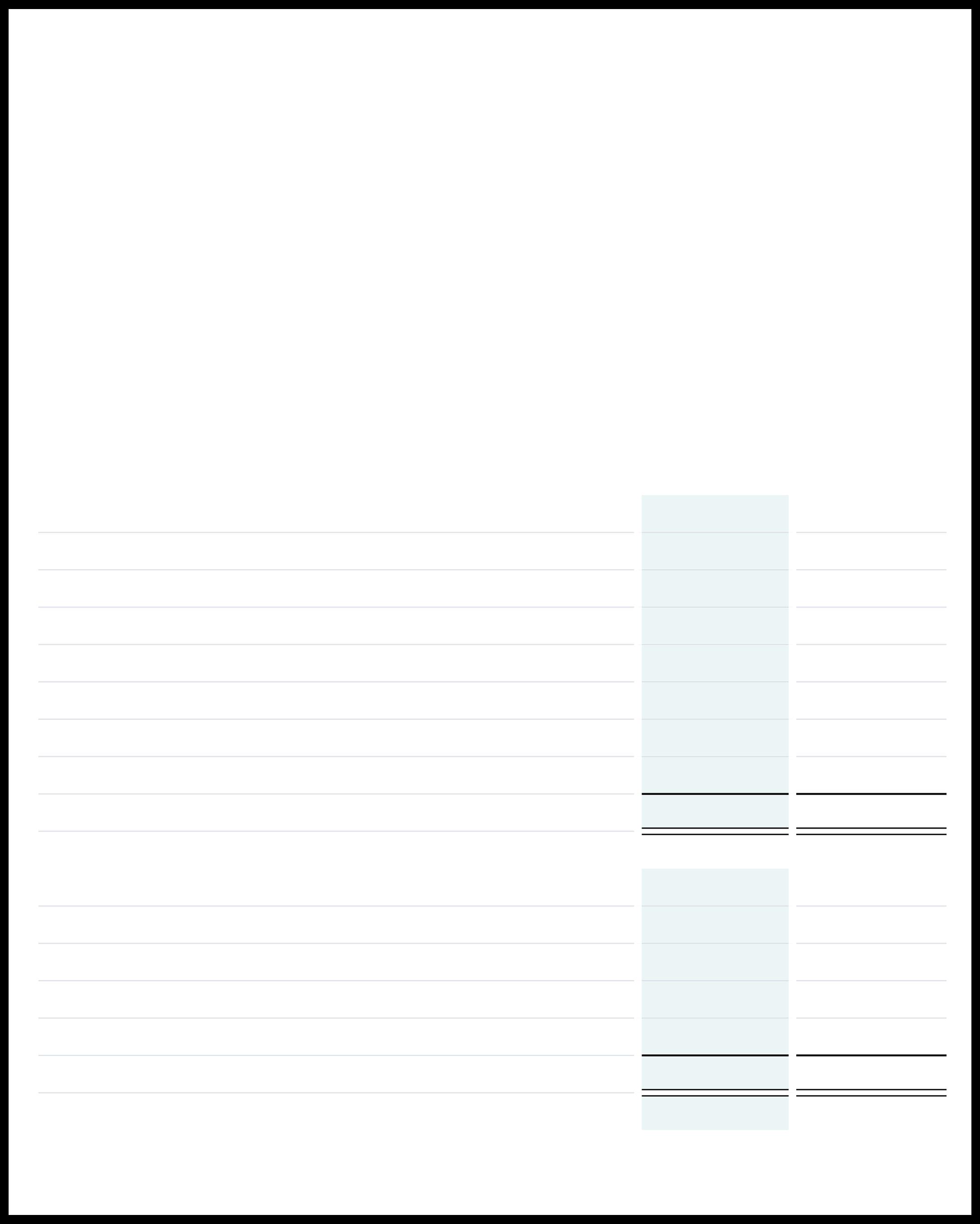
38,656,065 647,946 15,735,049 7,551,668 377,914 804,496 63,773,138 € 12,979,462 398,233 13,377,695 € 27,266,281 647,957 13,377,695 7,335,442 677 592 1,150,502
6 - Revenue based grants
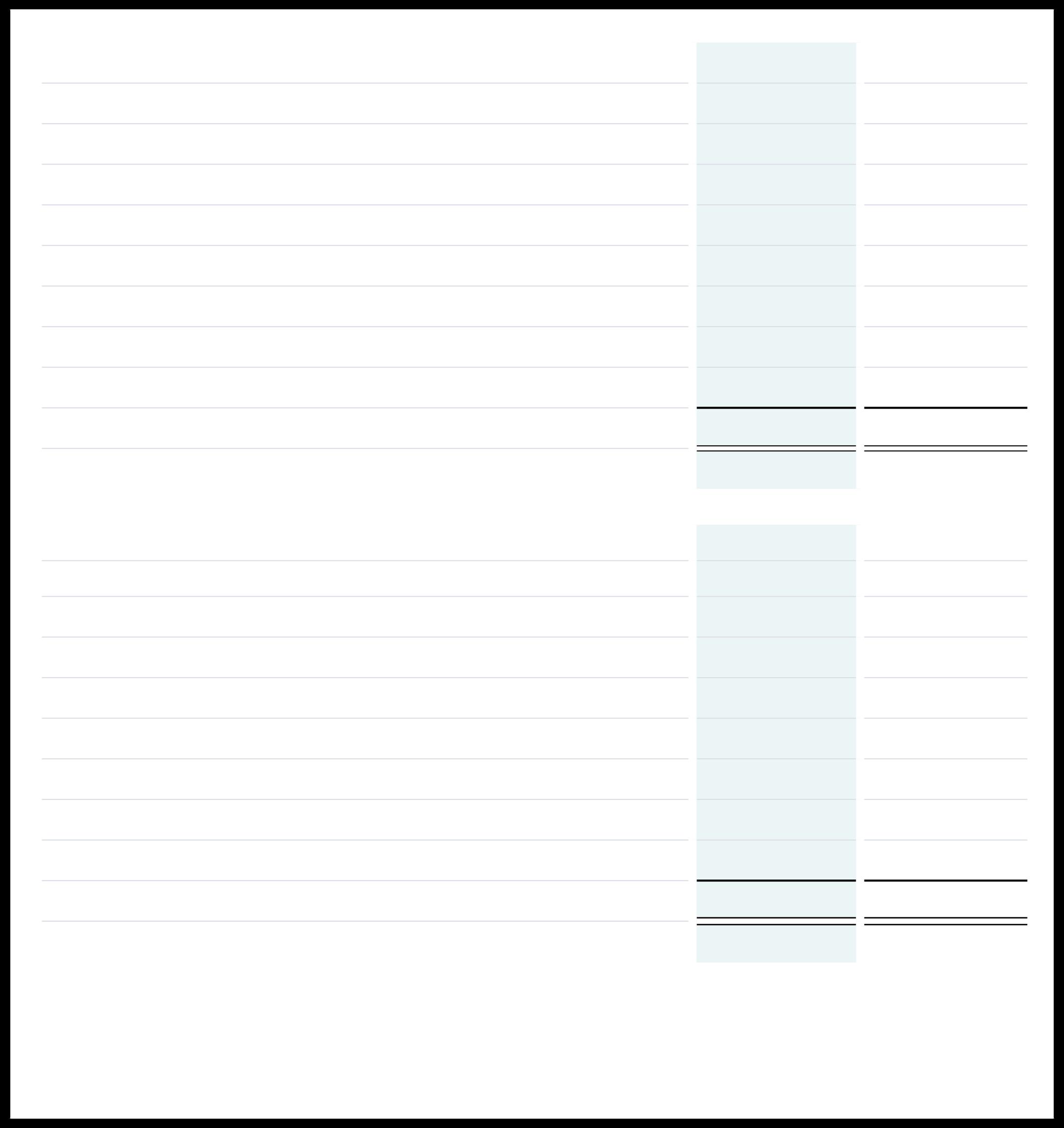
DCYA - POBAL CSS scheme
Childcare government wage subsidy scheme
DCYA - ECCE grant
Other childcare grants
DCYA - POBAL NCS scheme
DCYA - AIM grant
DoHPLG - Social Partnership Funding
7 - Other income
Childcare fee income
Leasehold income
Realised gain on financing (a)
Assets transferred from other charity (b)
Housing Finance Agency - Social Investment Fund
Other
(a) This represents a realised gain on a Fixed Rate loan break with Bank of Ireland (b) This represents assets transferred from Munster Co-op Housing Limited CHY 5421R and treated as a donation gain in CHI
1,150,502
Notes to the Financial Statements (continued)
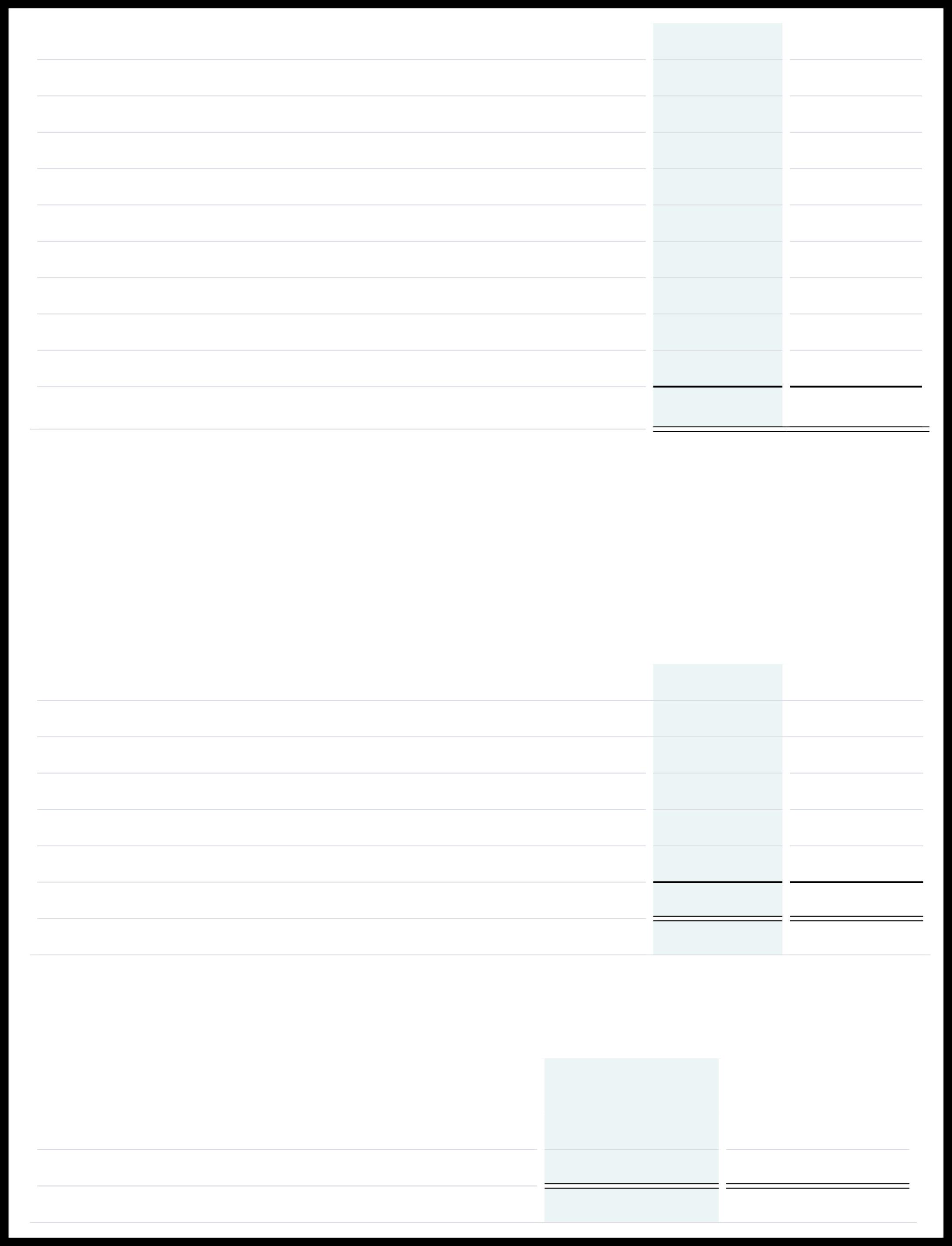
8 - Housing and community services
Staff costs
Housing management, support, repairs and maintenance costs
Operating lease payments
Insurance costs
Legal and professional fees
Internal audit fees
Sundry expenses
Auditors remuneration
,
Included in sundry expenses are 2 donations made for €5,000 each to organisations in the Ukraine which support new housing policy and provide accommodation to displaced Ukrainians Other donations made in 2023 included €310 to the Cork Student Housing Co Operative, €10,000 to UNICEF Ireland to support the Children of GAZA campaign and €10,000 to Inner City Enterprises in recognition of the services provided to CHI members
9 - Employees Staff costs were as follows: 2023 € 5,470,852 564,511 268,921 92,200 6,396,484
Wages and salaries
Social insurance costs
Cost of defined pension contribution scheme
Temporary staff costs
Capitalised employee costs during the financial year amounted to €NIL (2021 - €NIL)
The average monthly number of employees, including the board members, during the financial year was as follows:
2022 € 5,488,346 7,918,568 2,756,662 450, 305 357,557 6 150 52,318 34,623 17,064,529 2022 € 4,748,040 494 928 220,838 24,540 5,488,346
A total of 28 employees (2022: 18) had an annual salary in excess of €60,000 as follows:
€60,001 - €70,000
€70,001 - €80,000
€80,001 - €90,000
€90,001 - €100,000
Over €100,000
Amounts shown in the table above includes basic salary and excludes benefits in kind and pension contributions For the purposes of classifying individuals within the band’s remuneration, amounts have been annualised as though all relevant individuals were in employment for 12 months
Total remuneration of key management personnel in the year amounted to €825,566 (2022: €634,012) which included Chief Executive Officer’s remuneration amounting to €149,255 (2022: €140,055) in the year, inclusive of benefits in kind
Pension costs
The Society operates a defined contribution scheme which matches employees’ contributions to a maximum of 8% of annual salary The pension expense of €268,921 during the current year (2022: €220,838) represents contributions made by the Society to the fund The assets of the scheme are held separately from those of the Society in an independently administered fund Amounts payable to the scheme at year end totalled to €45,157 (2022: €Nil)
-
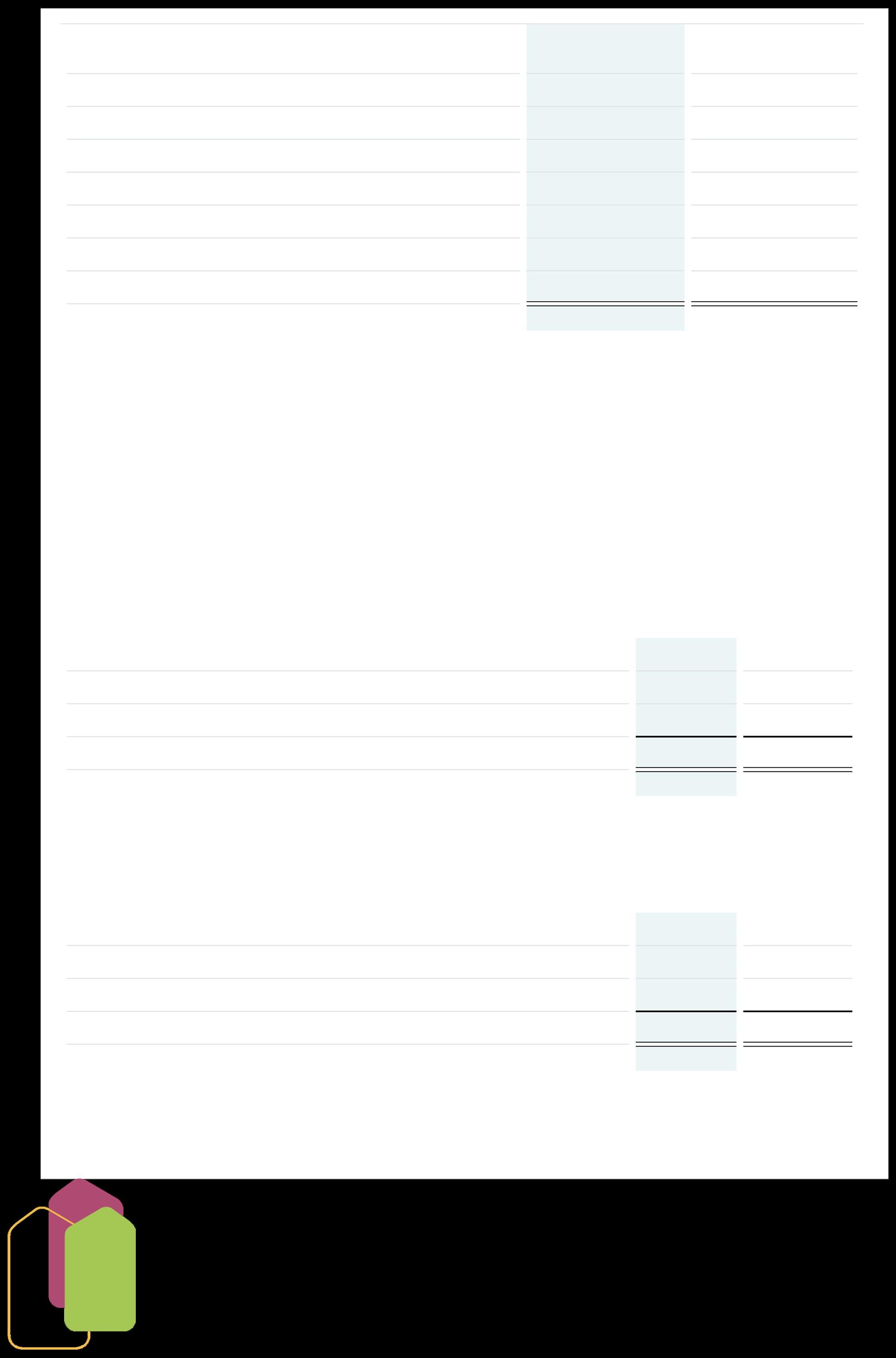
During 2023 the Society availed of raising deposit interest rates and placed deposits with Board approved counterparties to yield interest receivable
11 - Interest payable and similar expenses
12 - Taxation
The Society has been granted charitable exemption by the Revenue Commissioners and as a consequence is not subject to corporation tax
Notes to the Financial Statements (continued)
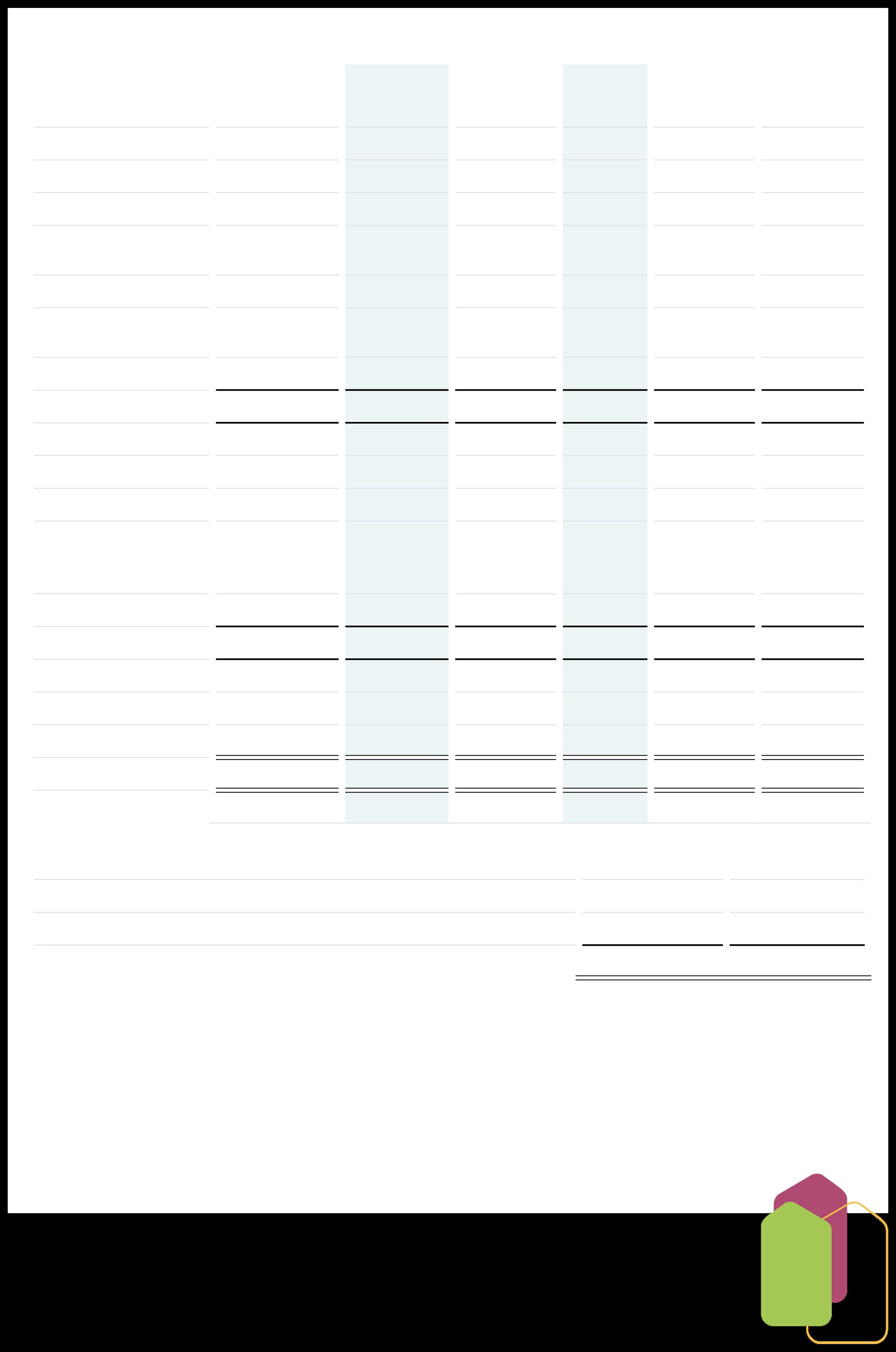
Cost or valuation
At 1 January 2023
Additions
Assets transferred from Munster Co-op
Disposals
Transfers between classes
Impairment
At 31 December 2023
Net book value At 31 December 2023 At 31 December 2022 13 - Tangible fixed assets
Depreciation
At 1 January 2023
Charge for the financial year on owned assets
Disposals
At 31 December 2023
204,096 224,603 21,812,212 984,837,64 7 693,380,86 5 (260,151) 116,343,140 Total € 788,171,944 315,743,821 2 ,118,875 (260,151)(4,593,702) 1,101,180,787 94,791,079
The net book value of land and buildings may be further analysed as follows: 2023 € 2022 € 692,487,319 692,487,319 Freehold 983,984,676 983,984,676
The net book value of assets transferred from Munster Co-op Housing Society Ltd Charity Registered no 5421R to CHI was €2,118,875 as reflected in the table above
The corresponding CLSS loan balance with of value of €1,426,732 was also transferred to CHI generating a donation gain for CHI in 2023 of €692,143 as referenced in Note 7
The total balance of housing and land and housing in the course of planning or construction which forms part of the Co-operative Housing Properties is €983,984,676 (2022: €692,487,319) Office buildings, equipment and fittings and motor vehicles totalling to €852,971 (2022: €893,546) are fixed assets of the Society which do not form part of the Co-operative Housing stock
- Impairment of freehold property - charge
During 2023, CHI performed an impairment review of a specific asset under construction at a current Dublin development site CHI and its stakeholders are currently considering the development options for this site Following the review, the carrying costs of the asset have been adjusted downward by €4,593,702 to align with the estimated fair value of the asset

CALF recoupment due
All debtors are due within one year
Debtors includes 10% CALF recoupment amounts due to the Society from the following Local Authorities at year end:
- Dun Laoghaire Rathdown CC Dublin €2,389,678
- South Dublin CC €193,303
The Society utilised its own cash resources to pre fund the above amounts to enable the purchase of social housing properties The Society’s cash balance in hand at year end is therefore understated by that amount at year end until the cash recoupment of those amounts post purchase post year end
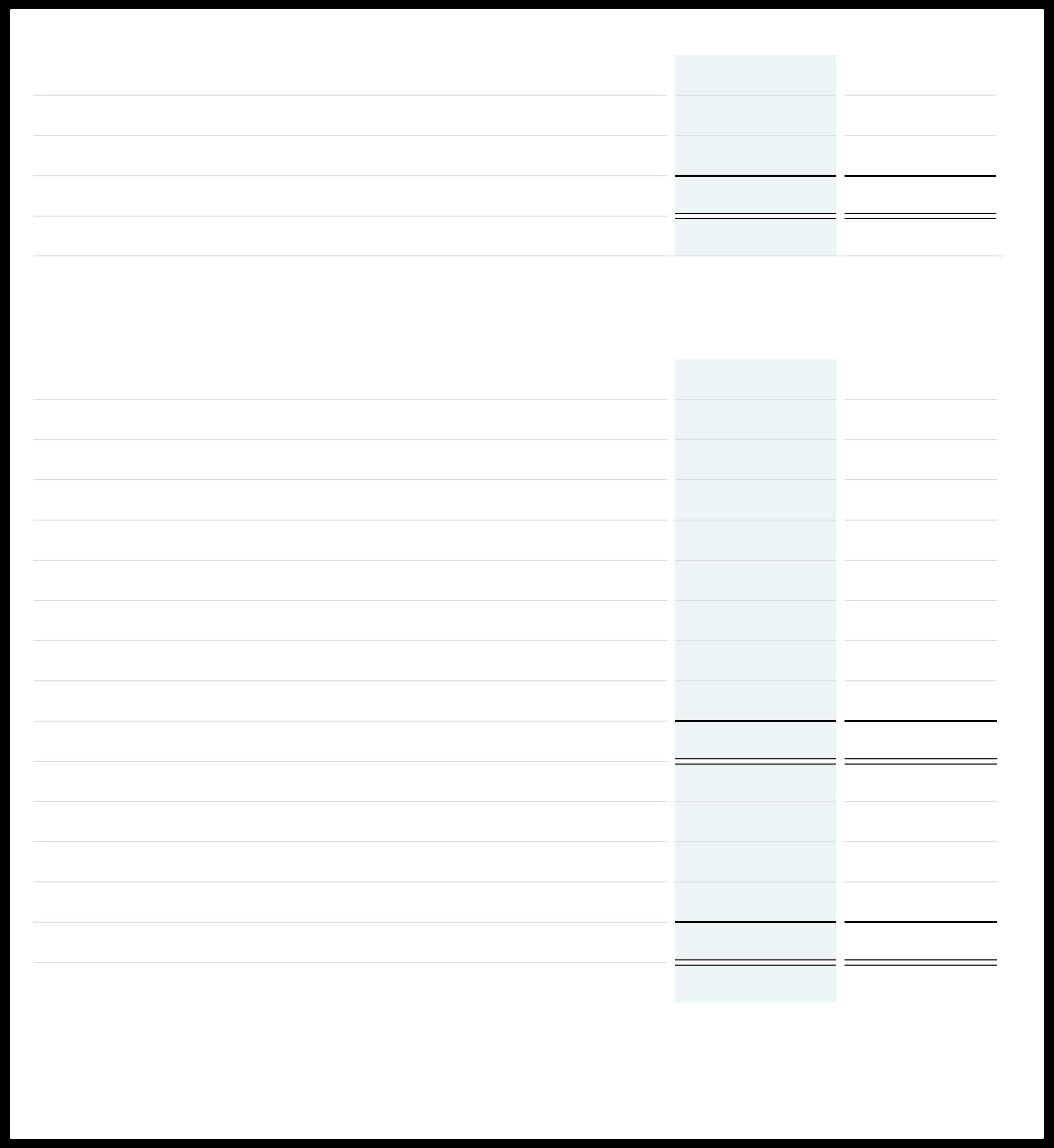
18 - Creditors: amounts falling due within one year
loans Trade creditors Taxation and social insurance Obligations under finance lease and hire purchase contracts Other creditors Accruals Deferred income
Cash at bank and in hand 17 - Cash and cash equivalents Other taxation and social insurance PAYE/PRSI
929,082 15,420,085
24,916,372 24,916,372 136, 228 10,412 91,467 238,107
Representing, Promoting, Developing Since 1973
Bank loans
Local authority financial assistance
Deferred income - Immigrant Investor Programme (IIP)
19 - Creditors: Amounts falling due after more than one year 2023 € 597,026,135 323,125,368 1,552,061 14, 218, 3 53 935,921,917
Housing loans are secured by specific charges on the Society’s land and housing properties No capital or interest repayments are required to be made on the above loans provided that the Society continues to comply with certain specific requirements of the local authorities with regard to the properties for which housing loans have been provided
The local authority financial assistance balance is broken down as follows:
Deferred income - capital grants 2022 € 388,876,143 243,438,850 784 000 9,205,306 642 , 304, 299 2023 2022 € €
Capital Loan and Subsidy Scheme (“CLSS”) and Capital Assistance Scheme (“CAS”) financing (a)
Capital Advance Leasing Facility (“CALF”) financing (b) 73,357,315 79,137,096 249,768,054 164 301 754 243,438,850 323,125,369
The capital mortgage repayments and associated interest arising on the loans are settled on the Society’s behalf by way of a subsidy The Society does not charge the interest accruing on the loans to its income and expenditure account as the cost is met through the subsidy scheme The interest expense accruing on the loans for the current year was €1,589,492 (2022: €1,698,692) Amounts drawn down under the scheme in the current year were €1,426,732 (2022: €893,995) The Society amortises the capital balance to its income and expenditure account over 30 years based on the superior loan agreements between the Housing Finance Agency (HFA) and the local authorities The local authorities have secured mortgages on CHI housing properties ranging in periods from 20 to 30 years
Amounts drawn down under the Capital Advance Leasing Financing scheme are repayable at the end of 25 years from the date of drawdown subject to the Society complying with other terms and conditions Interest accrues at a rate of 2% per annum and this has been charged to the Society’s income and expenditure account
Of the total bank loans outstanding, €569,624,640 (2022: €355,997,866) relates to loans from the Housing Finance Agency
Bank of Ireland holds mortgages over units at Auburn Lodge, Killiney, Co Dublin
Bank of Ireland holds mortgages over all units in Rathnew, Wicklow
Bank of Ireland holds mortgages over all units in, Loughlion, Kildare
Multaque Funds ICAV acting solely in respect of its sub fund CU AHB Fund, holds mortgages over properties 1 7 Crickets Field, Tuam Co Galway
The Housing Finance Agency holds a charge over all properties financed by it
The Immigrant Investor Programme (IIP) was introduced by the Irish Government in 2012 to encourage inward investment for the creation of business and employment opportunities in the State The IIP is designed to encourage investors and business professionals from outside the European Economic Area (EEA) to avail of opportunities of investing and locating their business interests in Ireland and acquire a secure residency status in Ireland Applications are determined by an Evaluation Committee composed of senior civil and public servants from relevant Irish Government Departments and Agencies
Under the IIP, investors may opt to undertake an Endowment investment
An endowment is classified as a philanthropic contribution to an approved project with a clear public benefit Investors will receive no financial return or recoupment of the principal
During 2021, the IIP Evaluation Committee approved CHI’s ‘Improving Warmth & Wellbeing Project’ as an appropriate project meeting the criteria for endowment under the IIP Scheme
Investment applicants are subject to enhanced levels of due diligence processes in respect of anti money laundering, Know Your Client, Politically Exposed Persons and sanction checks conducted by the Department/Irish Naturalisation and Immigration Service (INIS)
During 2023, CHI received endowment funding of €800,063 (2022: €499,900) pursuant to the IIP Programme
CHI applies the endowment funds received towards the costs of the ‘Improving Warm & Wellbeing Project’ The goal of this project is to deliver component replacement and high quality energy upgrades at specific social housing schemes located in the inner Dublin city area
CHI will also avail of SEAI part funding under the National Home Retro Fit Scheme for certain eligible costs of these works
CHI incurred third party facilitation and advisory fees to acquire the IIP endowment funding received
In 2023 the Minister for Justice and for Higher and Further Education announced the closure of the IIP including the Endowment Investment option with effect from 5th February 2023 The announced closure of the IIP did not affect existing projects already approved under the programme Existing approved projects continue to be able to source any new investors required to complete the funding of projects already approved All existing (approved) projects will continue to be monitored by the Department of Justice in relation to delivery of the project and for compliance purposes
Representing, Promoting, Developing Since 1973
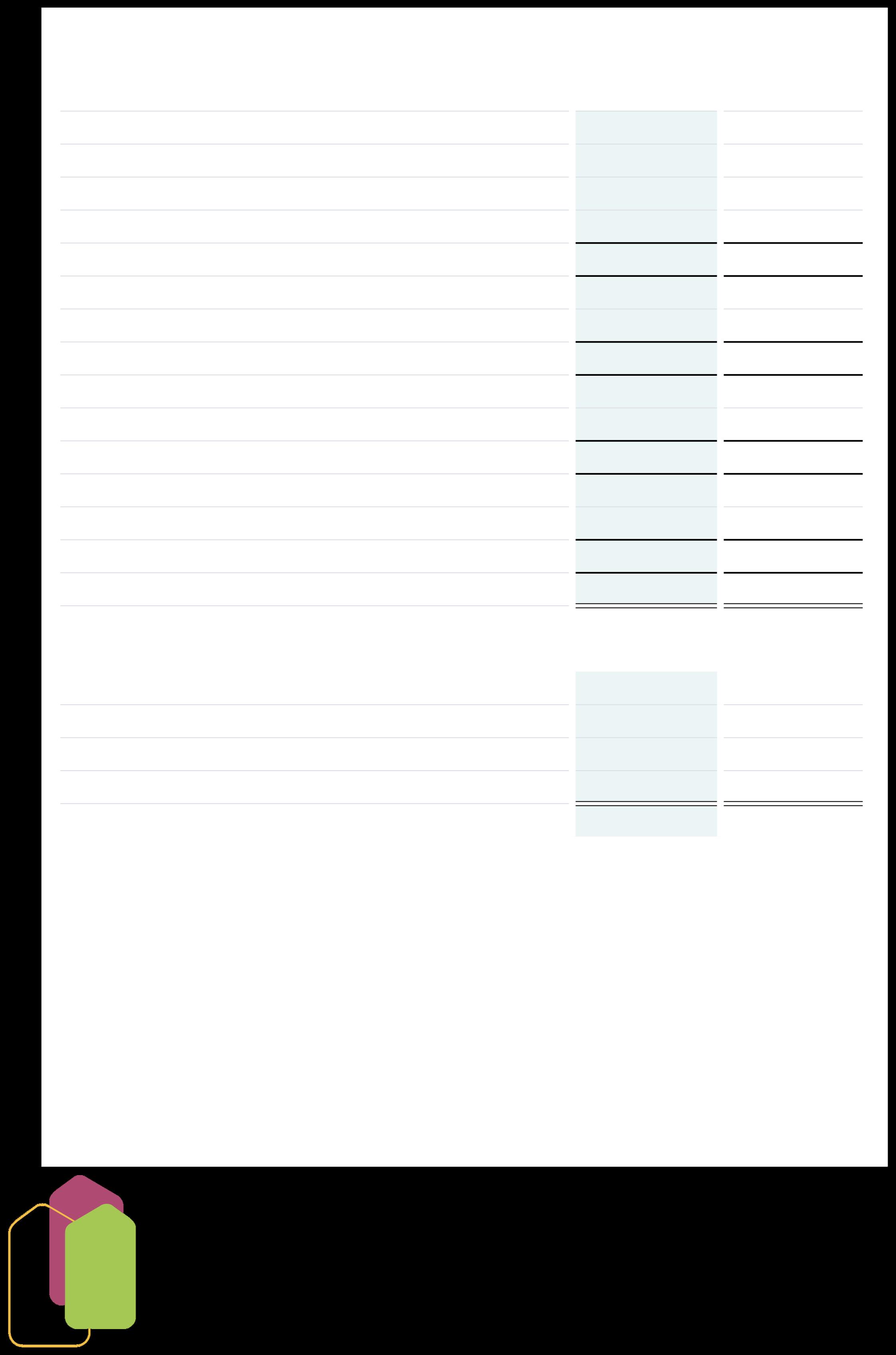
20 - Loans
Analysis of the maturity of loans is given below:
Amounts falling due within one year Bank loans
Amounts falling due 1-2 years Bank loans
Amounts falling due 2-5 years Bank loans
Amounts falling due after more than 5 years Bank loans
21 - Share capital
Authorised, allotted, called up and fully paid 375 (2022 - 375) Ordinary Shares shares of €1 00 each
13,035,87 6 13,035,87 6 375 2022 € 2022 € 43,425,75 7 43,425,75 7 13,561,453 13,561,453 331,888,933 331,888,933 401,912 ,019
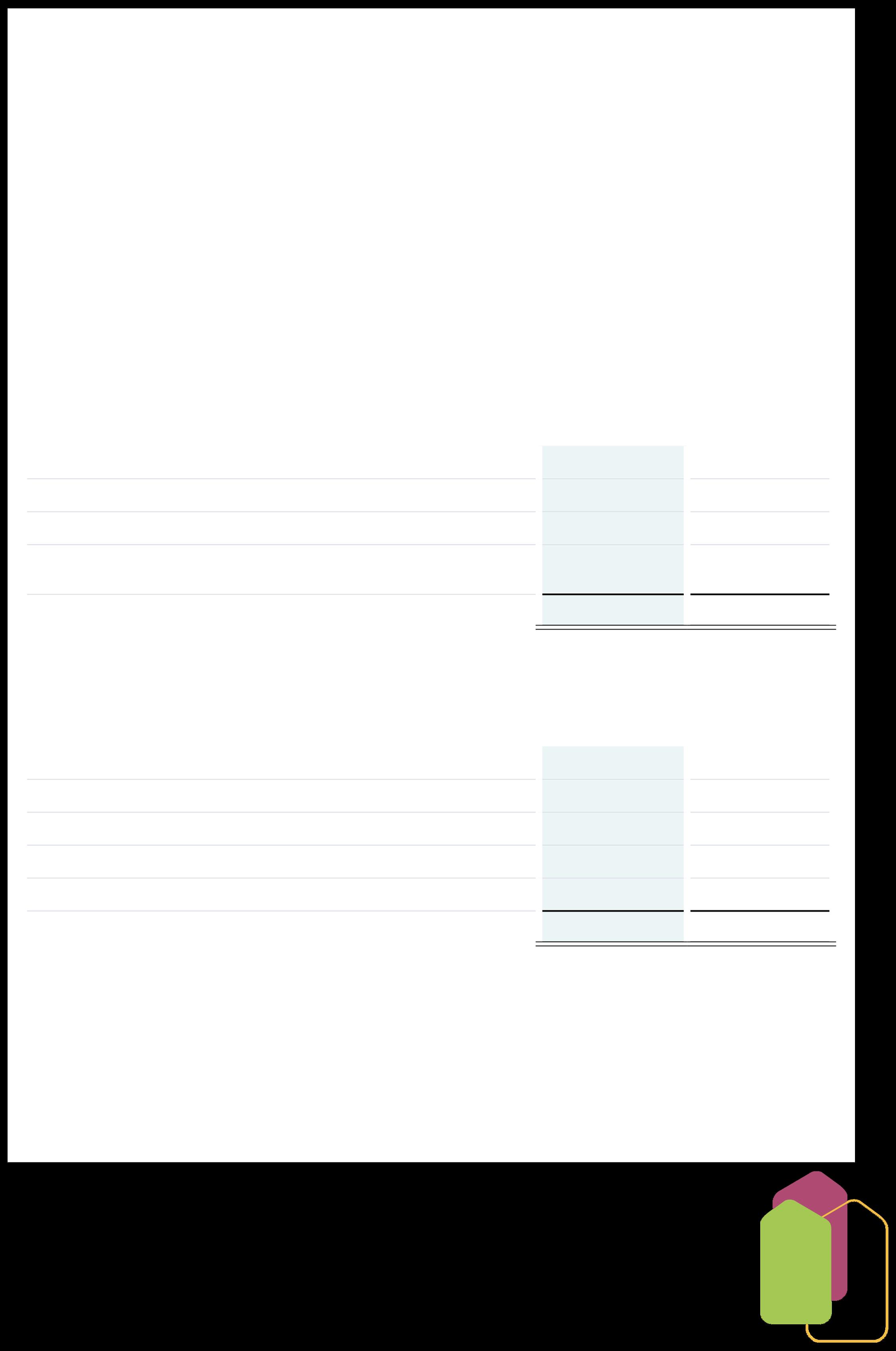
The designated reserve has been created for future investment in stock condition or major repairs expenditure The Society retain a level of designated reserves in cash backed form The designated reserves are sufficient to meeting as a minimum the following year ’ s budgeted stock condition or major repairs On an ongoing basis the Board aims to generate a surplus on operations which will allow for augmentation of the CHI designated reserves
The Society retain a level of revenue reserves which reflects its needs at the current time and in the foreseeable future The reserves are sufficient to meeting, as a minimum, the running costs for a period of 12 months net of contractually committed State backed P&A income Annually the Board reviews the adequacy of the amount and period amending it, where necessary, to reflect changing needs
23 - Capital commitments
At 31 December 2023 the Society had capital commitments as follows:
112,892,098 Contracted for but not provided in these financial statements Committed to but not contracted or provided for in these financial statements 2022 €
24 - Commitments under operating leases
At 31 December 2023 the Society had future minimum lease payments due under non-cancellable operating leases for each of the following periods:
Not later than 1 year
Later than 1 year and not later than 5 years
Later than 5 years 46,167,959
25 - Comparative information
,473,436 34,457,568 176,931,004 2023 2022 € 2,942,637 11,770,549 28,088,391 42 801 577 € 3,394,462 13,577,847 29,195,650
Comparative information has been reclassified where necessary to conform to current financial year presentation
26 - Approval of financial statements
The Board members approved these financial statements for issue on 17th May 2024
Term
Affordable Housing
AHB
Amortisation
Capital Advance
Leasing Facility (CALF)
Term
Capital Loans and Subsidy Scheme (CLSS)
Definition
A term for social rented, affordable rented and intermediate housing, provided to eligible households whose needs are not met by the market
Approved Housing Body
An accounting term for the practice of spreading the repayment of a loan or grant benefit over a specific time frame
An upfront typically subordinated loan provided by the Local Authority to the AHB for up to 30% of the social housing unit’s cost of acquisition/construction
Definition
In the past, Ireland’s social housing was financed entirely by the Capital Loans and Subsidy Scheme (CLSS) which are described in the financial statements as Local Authority Financial Assistance These loans provided up to 100% of the cost of acquisition or building of social housing units This form of loan remained payable in full for the life of the loans but on maturity of the loans, provided certain conditions are met e g the accommodation continues to be let to eligible categories of persons and is properly maintained, the loans and interest (where applicable, typically the interest rate is zero) were relieved in full Post the economic crisis, this model of funding the full cost of new social housing through expanding the government balance sheet was no longer sustainable
Earnings (EBITDA) as a percentage of Interest and Capital Repayments
Debt Service Cover
Depreciation
Differential Rent
Term
EBITDA
EBITDA Margin
Gearing Ratio
HFA
Housing Alliance
Liquidity Ratio
Payment & Availability Agreement (P&A)
Stock Condition
An accounting term for the allocation or write off of an asset over its useful life to show how much of an asset’s value has been used up
This is the affordable rent paid directly by the tenant member to the AHB Indicatively, the differential rent is equal to 15% of the tenant members earnings Definition
Earnings Before Interest, Tax, Depreciation and Amortisation
EBITDA expressed as per centage of Total Income (Less Amortisation)
Loans expressed as a percentage of the Historic Cost of Properties
Housing Finance Agency
A collaboration of six of Ireland’s largest AHBs : Circle Voluntary Housing, Cluid Housing, Cooperative Housing Ireland, Oaklee Housing, Respond and Tuath Housing
Debtors plus Cash expressed as a percentage of current Liabilities
An Agreement between made between the Local Authority and the AHB where the Loca Authority undertakes to make an annual payment to the AHB for making the housing units available for social housing tenants from the Local Authority social housing list
Survey reports providing condition survey of the properties under AHB ownership, furnishing essential information as to their state of repair and allowing for the planning of any future maintenance and investment requirements Leasehold interests may also form part of the stock condition surveys This not only helps organisations to identify any major defects that could be harmful to residents or result in long-term damage to the building but also assists with the general maintenance of their properties to a good standard on a day to day basis
These definitions are intended to help the reader and accordingly do not purport to be legal interpretations.


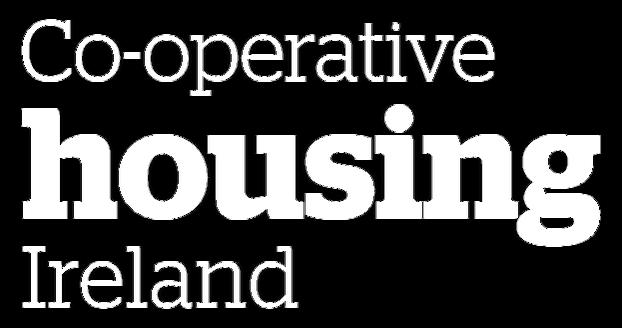
Co-operative Housing Ireland 11/12 Warrington Place Dublin 2 D02 E221
Ireland

Tel: +353 1 661 2877
Email: admin@cooperativehousing.ie www.cooperativehousing.ie